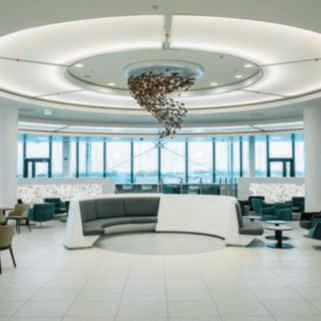









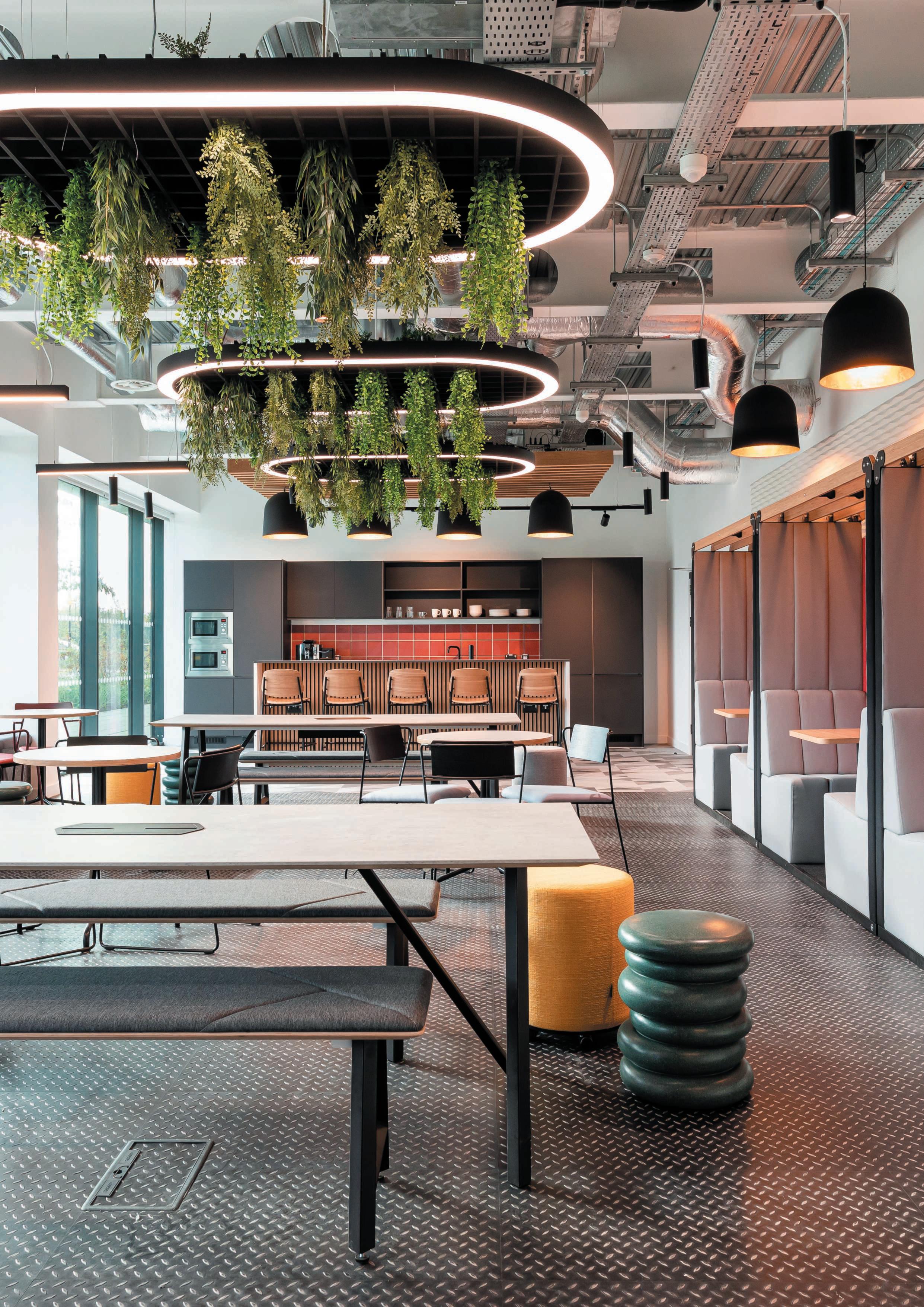

































Say hello to your new source of expert business advice.





Search: Go Succeed NI












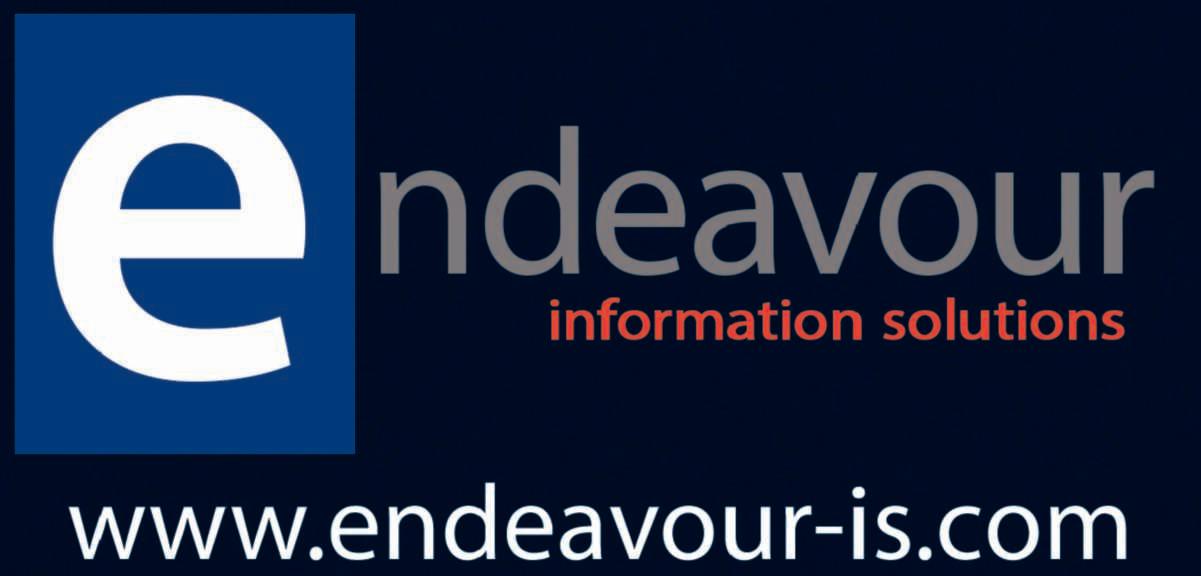
Are you getting everything you thought you were getting from your existing Microsoft Cloud subscriptions?

• Over 30 years experience in providing practical technology and business process optimisation advice and solutions
• A dedicated team of qualified ICT support professionals, business application specialists, business intelligence and data analysts
• Highly customisable Financials and ERP solutions using Microsoft Business Central
• Particular focus on creating solutions with Microsoft 365, Microsoft Dynamics 365 and Microsoft Power BI


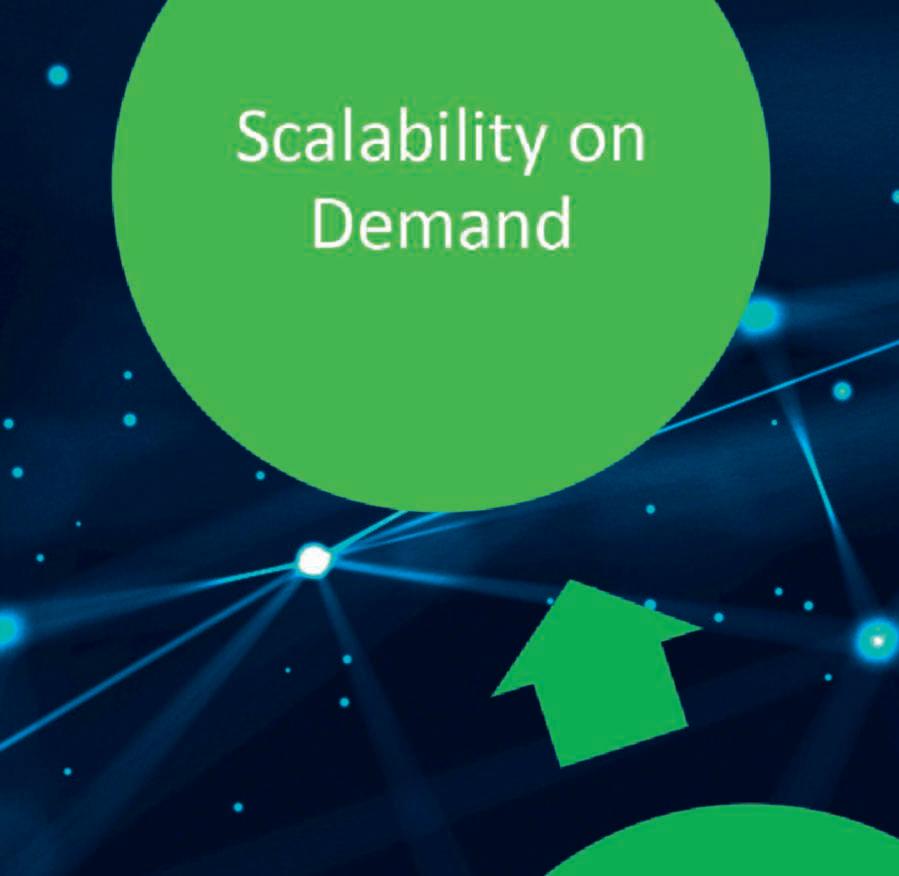
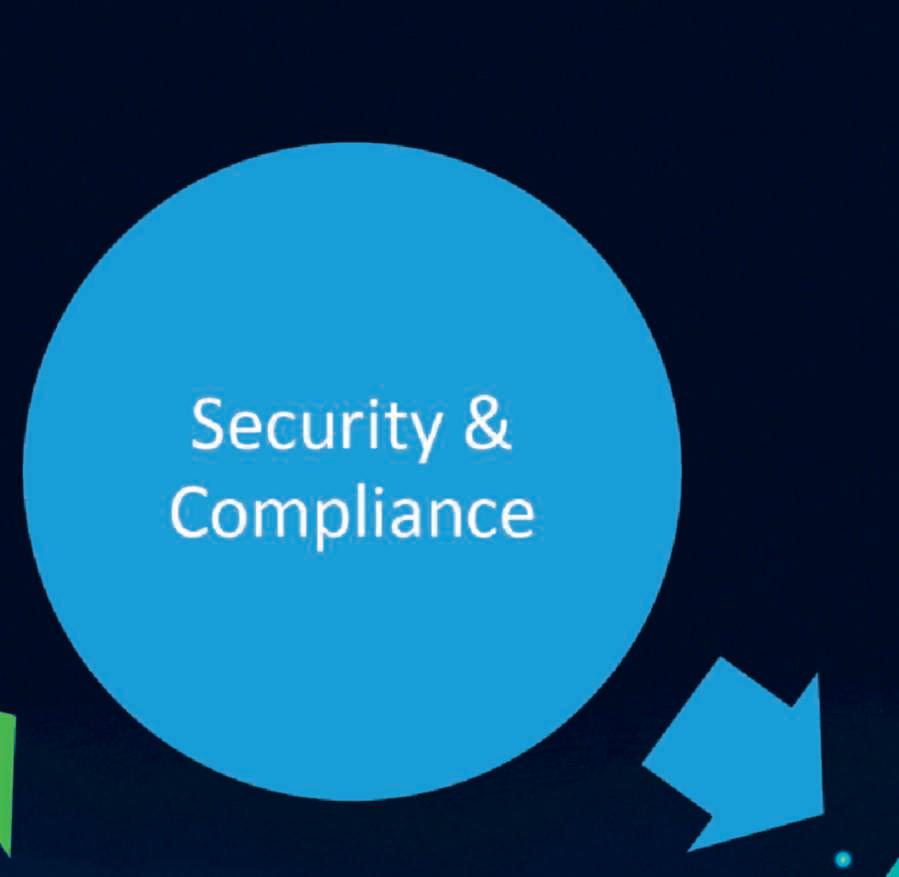








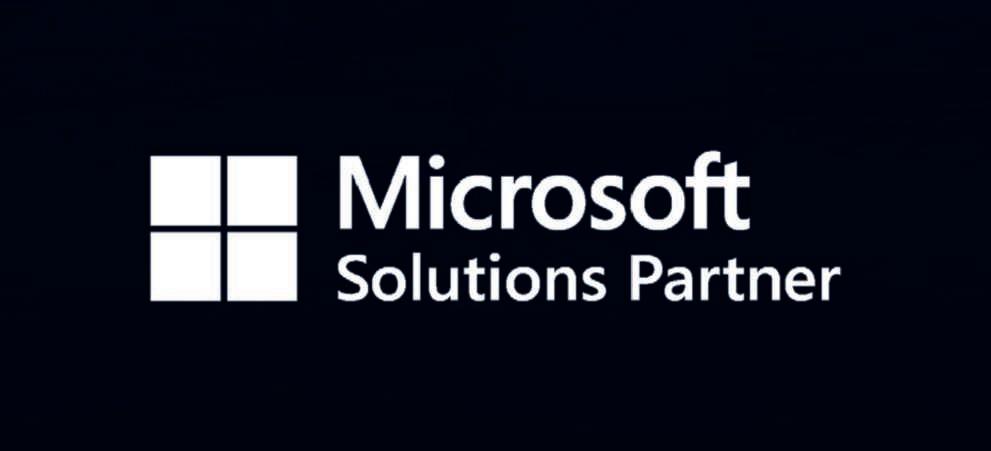


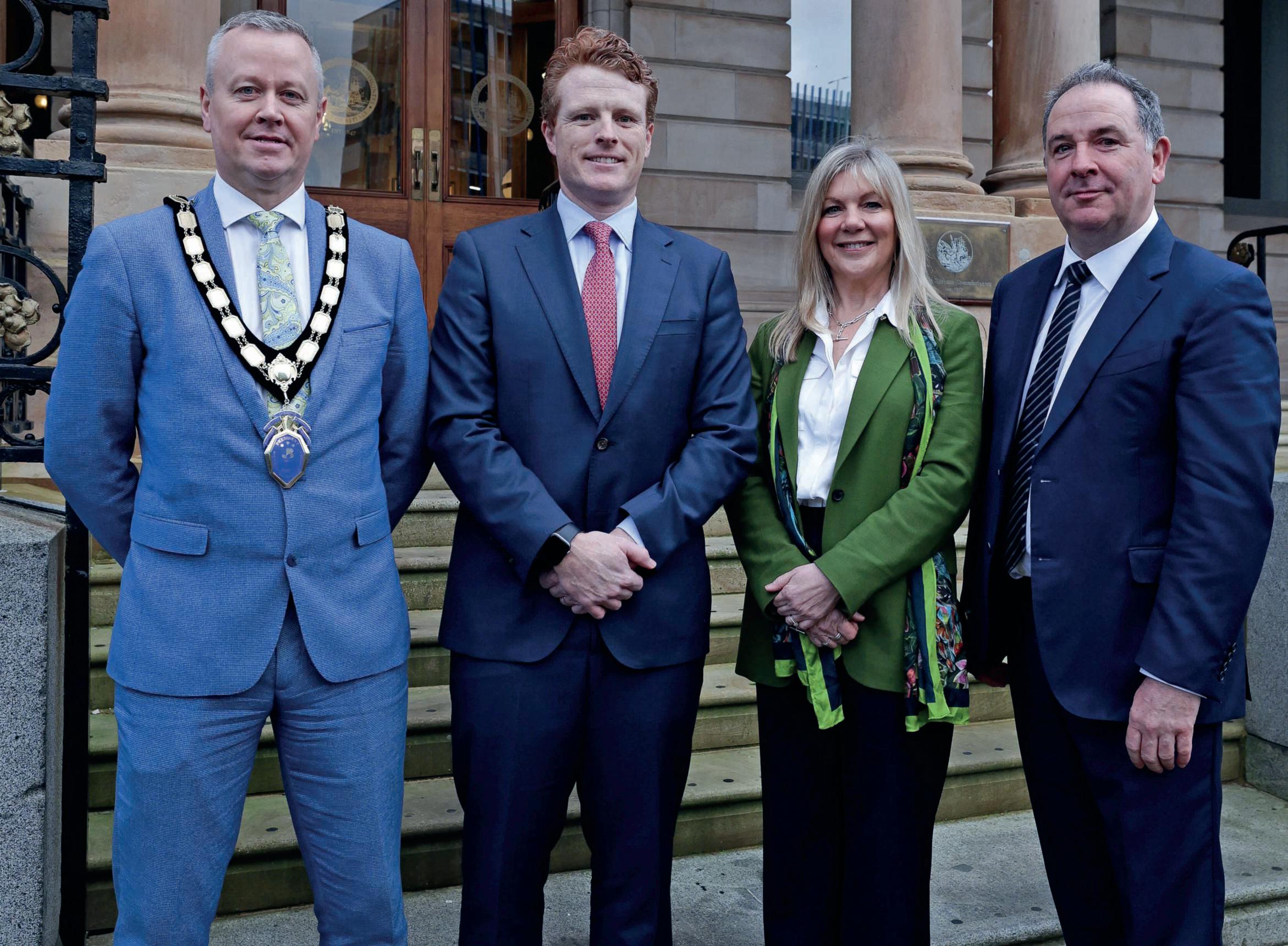



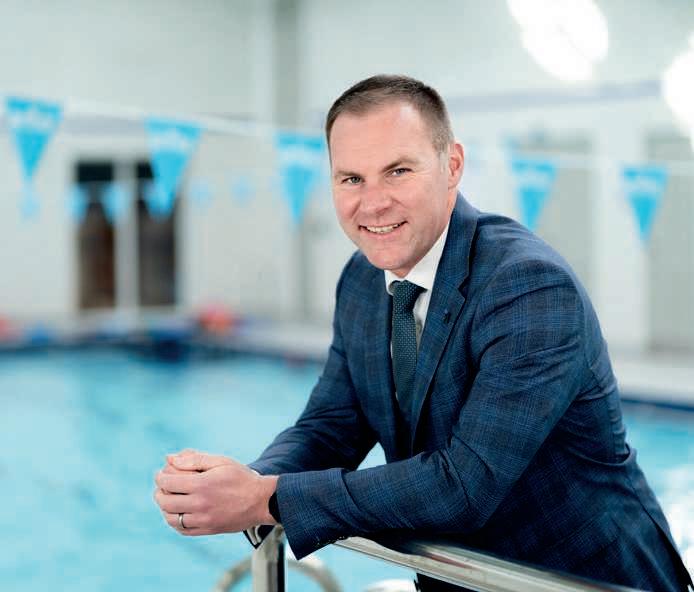
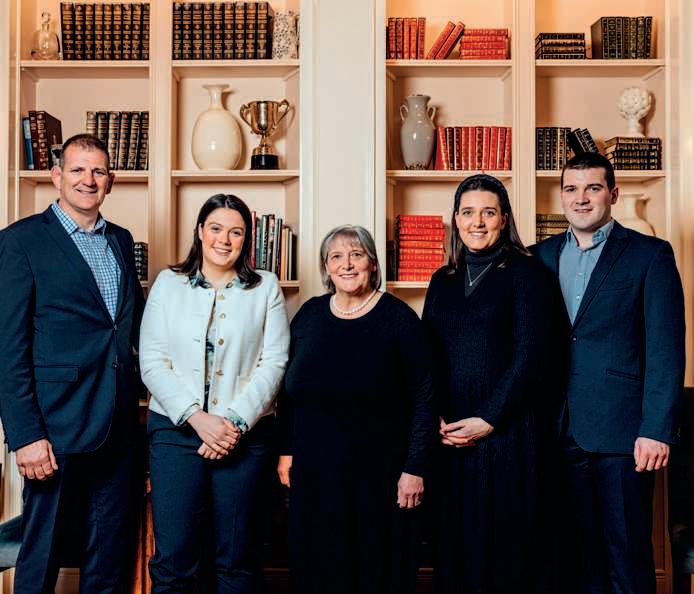






Economy Minister Conor Murphy recently outlined his economic vision to the Assembly. At NI Chamber, we certainly welcome the fact that the Minister set out his priorities for the economy early after the restoration of the Executive.
What matters now is how the vision is delivered, with the strategic priorities being linked to an agreed and Executivewide Programme for Government and Budget. Delivery mechanisms and momentum will be the central focus of NI Chamber’s direct engagement with the Minister, his department and indeed the entire Executive.
Clearly economic growth is an interdependent mission that will only be achieved through partnership, across departments and between business and policy makers. While much of the aspiration is headed in the right direction, many of the priority areas are not mutually exclusive, which makes a whole system approach crucial.
This is an early stage in the process and there is still much to be clarified, not least how the Minister intends to engage with the business community to achieve the stated aims. Taking an evidence-based approach is key, which is where the private sector can really add value and support.
In the first quarter of this year, NI Chamber has already been looking in-depth at the evidence around key blockers to ‘good jobs’ and decarbonisation, publishing comprehensive recommendations for reform of the planning system and making suggestions around reform of the apprenticeship levy.
That is in addition to our Quarterly Economic Survey, one of the most detailed and regular insights into business sentiment across the whole of Northern Ireland. We, our member businesses and colleagues across the business eco-system have a pivotal role to play in the co-design and co-delivery of the future economic landscape of Northern Ireland, so we’re eager to see mechanisms in place to facilitate mutually beneficial working relationships.
Our own evidence base proves that right now, competitiveness is a critical issue for business. Alarmingly, our Quarterly Economic Survey at the end of 2023 showed that among manufacturing businesses, concerns about competitiveness had doubled year-on-year. So, testing this economic vision against how it positions NI PLC on the island of Ireland, as a region of the UK and on the world stage, is crucial.
There is no time to waste in delivering a successful, sustainable economic vision for Northern Ireland. Looking outwards, this year could see significant shifts in some of the region’s most important markets as a result of elections in Westminster, the Republic of Ireland, the EU and US. In each jurisdiction, important trading relationships are there to be grasped and grown. It’s up to all of us, in partnership, to present the most compelling investment proposition possible. NI Chamber’s focus will be ensuring that this is coherent, joined up and highly ambitious.
Cathal Geoghegan, President, Northern Ireland Chamber of Commerce and Industry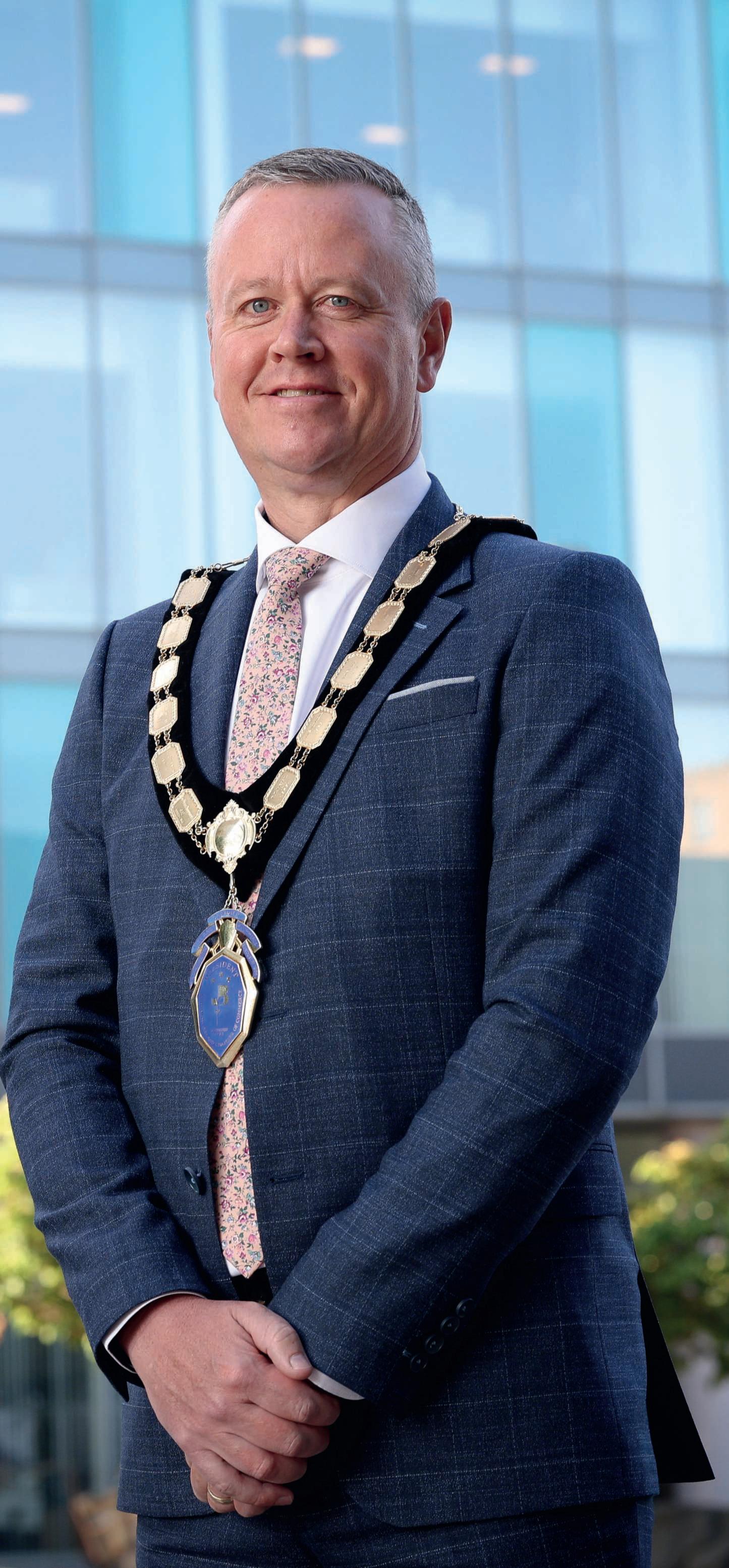












We are a diversified staffing organisation dedicated to providing the highest quality staffing services with the greatest quality to our clients.
We offer temporary, permanent and contract staffing solutions to a range of companies throughout Northern Ireland within the commercial, healthcare, industrial and professional sectors.




Terex has unveiled its new headquarters for Powerscreen to local stakeholders including First Minister Michelle O’Neill MLA. This milestone marks a culmination of over £100 million in investment across Northern Ireland since Terex entered the province in 1999, underscoring the company’s commitment to the region’s economy and its workforce of over 2,000 team members employed locally.
Speaking following a tour of the new facility, First Minister Michelle O’Neill said: “Your new headquarters are really impressive. It’s a physical demonstration of your success, and a welcome statement of your future ambition.
“Your growth on this site since the original Powerscreen days is a testament to entrepreneurial spirit and resilience. You have been instrumental in growing an engineering cluster here.
“You have set the standard in terms of quality and product development and you have been pioneers in research, development and innovation.”
Located in Dungannon, the new headquarters for Powerscreen fosters collaboration, innovation, and sustainability. It features
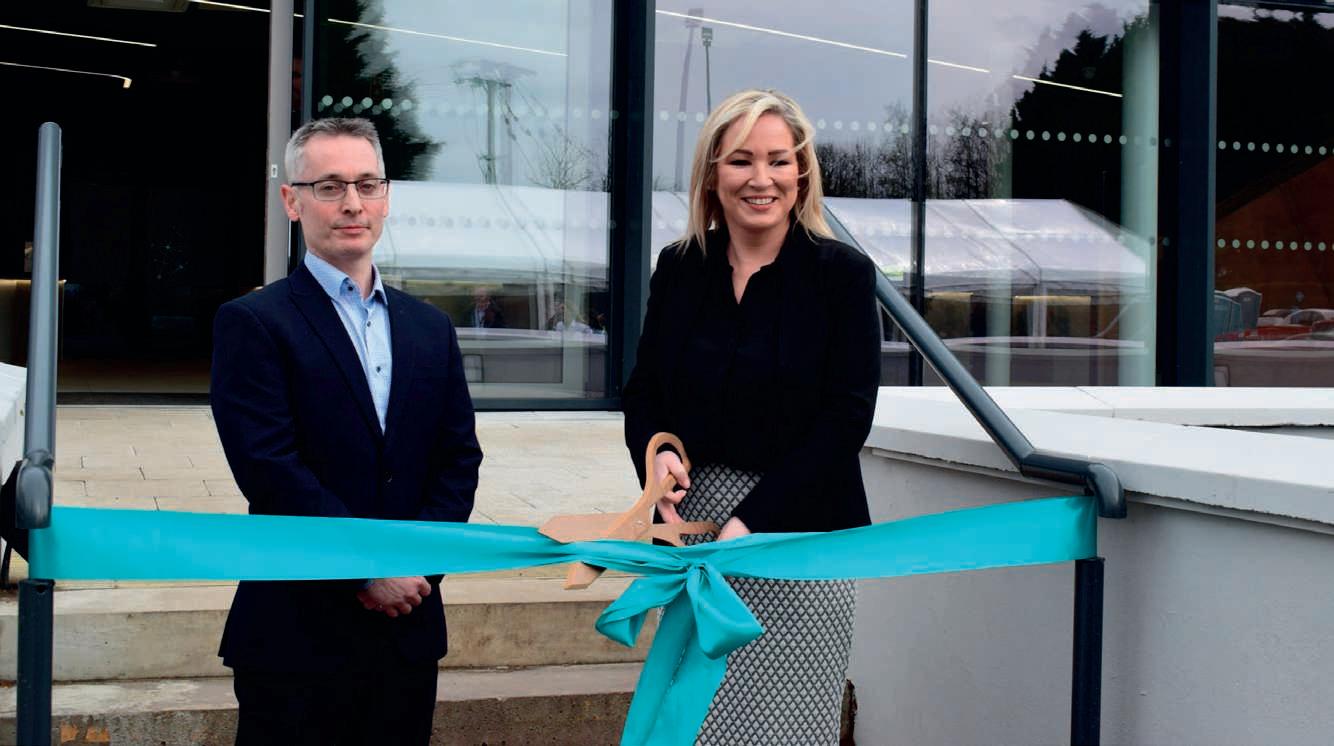
a new office space with an open plan layout and informal collaboration areas as well as a modern employee wellness centre. The unveiling also represents the latest in a series of investments by Terex to modernise its operations, such as the integration of robotic welding and automation systems to enhance efficiency and precision in manufacturing processes. Terex has also prioritised the implementation of advanced technologies and fittings to enhance thermal efficiency and reduce energy consumption, as part of a global sustainability initiative to reduce the environmental impact of its operations.
Also announced at the opening ceremony was the launch of a new electrical apprenticeship programme. The programme offers individuals an opportunity to gain hands-on experience within the industry while studying for an in-demand qualification to opens doors to various career paths.
HALO Technologies has raised $20 million in Series A funding from Volition Capital. This investment will accelerate the adoption of HALO’s video evidence gathering technology that enhances safety and security for individuals and organisations.
The global wearable and body-worn camera market is estimated to reach $15.74 billion by 2029, driven by increasing demand across law enforcement, security, retail, healthcare, transport and logistics sectors. Traditional bodycam providers often struggle with high upfront costs and measuring ongoing return on investment.
HALO addresses these challenges with a subscription model that optimises technology budgets and enables broader deployment. Its solutions offer consumer-grade experiences backed by enterprise-grade security and scalability. The funding will support talent acquisition, with plans to grow from 50 to 100 employees by year-end, as well as investment in R&D for AI, machine learning, and advanced digital asset management capabilities.
Over 500 customers across 14 countries already leverage HALO’s bodycams and centralised digital evidence platform. The company was founded in 2020 by Belfast based entrepreneurs with UK & European bodycam expertise.
Co-founder and Global Partnership Director Matthew Nesbitt has stated that HALO was founded not only with safety and security in mind, but also to provide a valuable evidence gathering tool for companies looking to provide proof of services, such as goods delivery, cash-in-transit, and remote auditing.
Fiona Shanley, appointed CEO in 2023, is spearheading HALO’s aggressive growth in new markets and sectors, particularly in the USA. With her experience at Stripe and Microsoft, Shanley aims to solidify HALO’s position in the competitive SaaS landscape by meeting diverse security and flexibility needs through custom subscription packages.
An investment property on Belfast’s Dublin Road, comprising the 146 bed ETAP Hotel, has been sold by CBRE Northern Ireland together with CBRE Hotels Dublin to Belfast’s largest hotel group, Andras House for £7.35 million.
Gavin Elliott, Senior Director at CBRE Northern Ireland, who advised the seller said:
“The ETAP Hotel is well-established on the Dublin Road and is leased to Accor UK Business and Leisure Hotels Limited for a further 6.5 years.
“The hotel sector in Northern Ireland continues to be active with circa £55m invested across four sales last year and 2023 occupancy levels reaching mid-70%, therefore surpassing 2019 levels. We expect that 2024 will be an active year for the hotel market in terms of both investment and occupancy levels.”
With a vision to inspire lifelong participation in rugby, the Ulster Rugby Foundation has secured official charitable status.
The Ulster Rugby Foundation will raise vital funds needed to ensure that rugby is a sport open to all ages and abilities across the province. As a registered charity, the Foundation is committed to using the power of sport – and the unique values of rugby – to have a positive impact on participants’ lives and our local community.

we create trusted connections with communities across Northern Ireland.













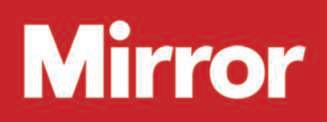


Economy Minister Conor Murphy has announced funding to protect the continuation of the flights from the City of Derry Airport to London Heathrow. The route, which is jointly funded by the Department for Transport and the Department for the Economy, provides critical connectivity from the north-west to London. The funding of £1.018m begins on 1 April 2024 for one year, with airline Loganair set to continue operating 20 return flights a week.
FinTrU has been recognised by the Financial Times as one of the fastest growing companies in Europe. Now in its eighth year, the report lists the top 1000 European companies with the strongest revenue growth. FinTrU Founder & CEO, Darragh McCarthy, said: “To be recognised in the FT1000 is a fantastic achievement for FinTrU and all its employees. We are a profitdriven organisation but we have always maintained our social purpose to create high-quality professional employment.”
Beyond Business Travel, has set out its path for future growth, following an increase in demand for corporate travel that has seen the company’s turnover return to £16 million. Edel Doherty, MD and Founder of Beyond Business Travel said: “I’m delighted to see the company return to £16 million turnover, and the projections for 2024 are looking very good indeed. We may have weathered many challenges in the last decade, but through it all Beyond Business Travel has remained agile and responsive to the marketplace; it has continued to grow and evolve its offering to its corporate clients.”
PAC Group has announced an investment of £1.3m, which will see it expand its team with 18 new jobs. The expansion follows export contract wins of £2.8m for its composite performers, including a £700,000 contract with a Netherlands based automation company following participation on Invest Northern Ireland’s Going Dutch programme.
The company recently delivered a £5m contract for NI Water to support innovative pilot projects to improve water quality, with plans underway to export the technology to GB, RoI, and the Middle East.
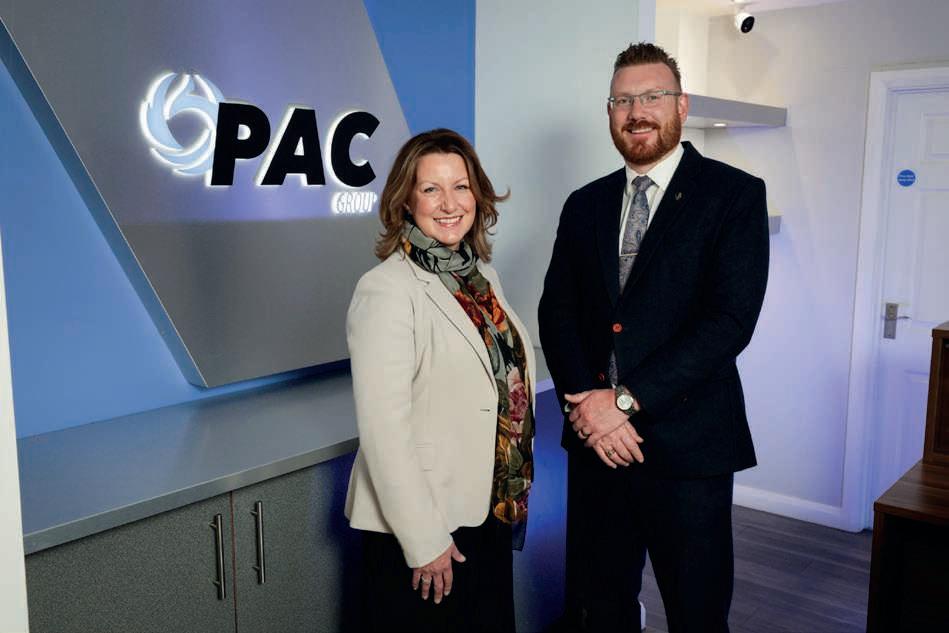
Welcoming the announcement, Anne Beggs, director of trade and investment at Invest NI, said: “Supporting businesses across Northern Ireland to grow through exports is key to driving our economic growth with the linkage between exports, innovation and productivity widely recognised.
“PAC Group is a great example of this in action and has grown from a business focused on selling in GB and RoI to now selling into The Netherlands. Our Going Dutch programme paved the way by providing PAC Group with a comprehensive overview of the Dutch market, support with market research and identifying potential partners in the market which has led to this contract. This will also lead to a further investment in its business which we are delighted to be able to help support.”
Darren Leslie, business development director at PAC Group, said: “Over the last five years, Invest NI has been a great source of advice and support for us. Most recently, we have availed of trade support to visit Seattle and Toulouse and its Going Dutch programme was vital in cementing our relationship with new partners in The Netherlands.
“Over the next two years, we also plan to invest in our premises, equipment and vehicles. We hope this will act as a springboard for further success across Europe and even into the Middle East.”
Belfast has climbed the ranks among mid-sized European cities as an attractive business investment destination, according to a major new benchmark report.
The FDi Intelligence European Cities and Regions of the Future 2024 report ranks Belfast fifth overall compared to other mid-sized cities. Belfast was ranked number two for foreign direct investment (FDI) strategy, ahead of similar cities in the UK and Ireland, and was also ranked in the top 10 for investment potential and business friendliness.

The report’s publication comes as Belfast City Council joins local business improvement districts (BIDs) and other city partners to highlight opportunities for the city at the Belfast Summit, which took place at the University of Ulster.
Commenting on the new rankings, the Lord Mayor of Belfast, Councillor Ryan Murphy, said: “This is an exciting time for Belfast, and the city region. We’re home to a thriving ecosystem of global brands, world-class researchers, and start-ups.
“Our geographic position means we’re perfectly positioned for significant trade with Dublin, London, Paris, New York and beyond.
“We already have an enviable track record of attracting global investors, significant growth ambitions and a £5.5bn investment and development pipeline available over the next decade. We’re prioritising Smart and Innovation Districts, our waterfront, city-centre living, active travel, and a green port. We have the space and ambition to grow sustainably, and we look forward to continuing to raise Belfast’s international profile as a city of choice for investment in the months and years ahead.”
70% of organisations in Northern Ireland say skills shortages have increased workload on existing staff*.
*The Open University Business Barometer 2023

Get the skills you need for the future by growing your own talent.
open.ac.uk/business/ireland
Belfast City Airport has further reinforced its commitment to reducing greenhouse gas emissions by becoming the first airport in Northern Ireland to achieve a Level 3 Carbon Accreditation ranking. The Airport Carbon Accreditation programme, a carbon management certification standard administered by Airport Council International (ACI Europe), recognises and rewards the efforts of airports actively working to manage their carbon emissions.
Science and technology hub Catalyst welcomed SSE Airtricity as the latest Platinum Partner within its growing partnership programme. The partnership will be integral in supporting businesses within Catalyst’s network to drive sustainable practices and promote eco-friendly initiatives. From running events focused on the adoption of green technology to working with start-up companies on their journey towards net zero emissions, the partnership will see both organisations collaborate to encourage innovation in the sustainability field, wherever it may exist.
Storm Technology has revealed the findings of its survey which found that 63% of businesses in Ireland are to increase their spend on artificial intelligence (AI) in 2024. The research – involving more than 100 IT leaders and decision-makers across larger enterprises and organisations across Ireland – found that the companies investing in AI this year expect to spend an average of €436,500, which indicates a significant increase of 45% compared to the average estimated spend of €301,700 in 2023.
Business leaders from across the sectors in Northern Ireland have called on the Executive to urgently address the current skills gap as well as challenges posed by the current Apprenticeship Levy model.
Senior executives gathered for a roundtable event, organised by Workplus and sponsored by NIE Networks, to address solutions to the current skills challenges and NI-specific barriers posed by the Apprenticeship Levy.
In December 2023, DfE published the Employer Skills Survey 2022 which highlighted the rise of skills shortage vacancies to 35% of all vacancies (from 22% in 2019).
The agenda of the roundtable event, which was held at The Mac in Belfast, included identifying key skills requirements, outline solutions to the current skills challenge, and the Apprenticeship Levy and how it is applied to Northern Ireland.
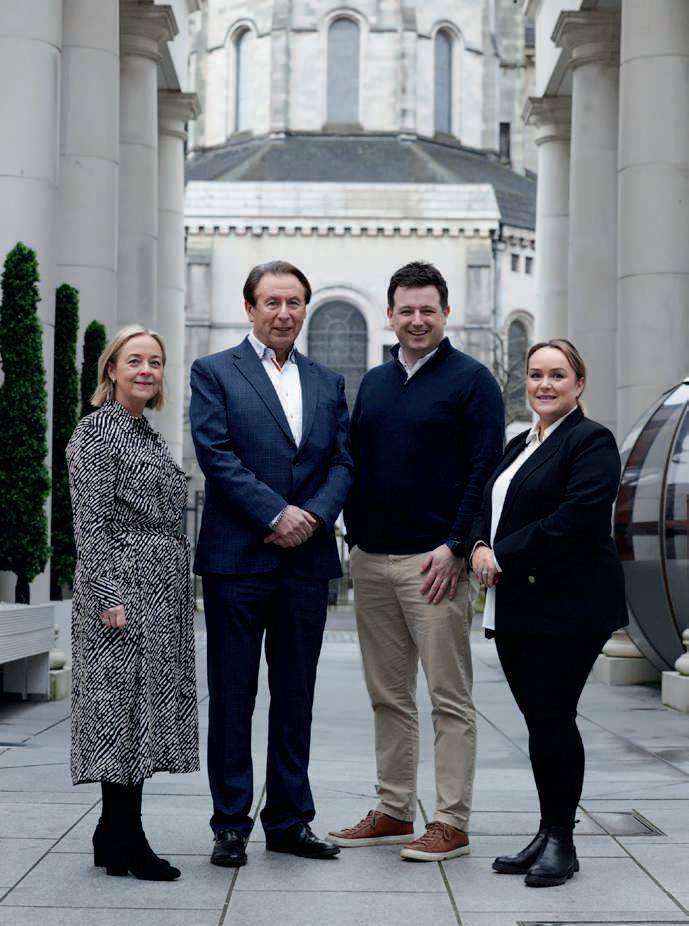
Richard Kirk, CEO of Workplus, said: “Skills are a key driver of productivity and growth, and help us to meet societal and economic challenges. They provide a ladder of opportunity and ensure jobs and prosperity. We’ve seen skills shortages rise from one fifth to over one third in just a few years – a deeply concerning trend which has serious implications for economy and society.”
The event was sponsored by NIE Networks which is one of Northern Ireland’s largest employers of apprentices and has won numerous awards for its apprenticeship programmes.
The roundtable event took place during Northern Ireland Apprenticeship Week, which is in place to highlight the benefits of apprenticeships.
Almac Group announced a 15-year virtual power purchase agreement (VPPA) to source electricity generated by the newly constructed Murley wind farm, located in Co. Tyrone, Northern Ireland. The agreement will reduce carbon emissions by over 95% from electricity consumed at Almac’s Global HQ in Craigavon, as almost all of the site’s electricity will ultimately be generated by the windfarm.
Almac’s Craigavon site has undergone significant expansion in recent years with Almac announcing hundreds of millions of pounds investment in 2022. The campus currently employs over 4,000 of Almac’s 7,000 global workforce supporting pharma and biotech companies in their drug development process. This reduction in Almac’s carbon footprint represents a significant step in the Group’s progress towards its carbon reduction goals.
Almac’s share of the wind project will deliver 34GWh of renewable electricity annually. Murley, owned by NTR Renewable Energy Income Fund II, is a 21.6MW windfarm with six wind turbines currently in latestage construction and expected to be operational by July 2024.
Signing this agreement follows a number of recent steps taken by the Group to support its 2045 net zero target. These include joining the science-based targets initiative (SBTi) which defines and promotes best practice in sciencebased target setting.
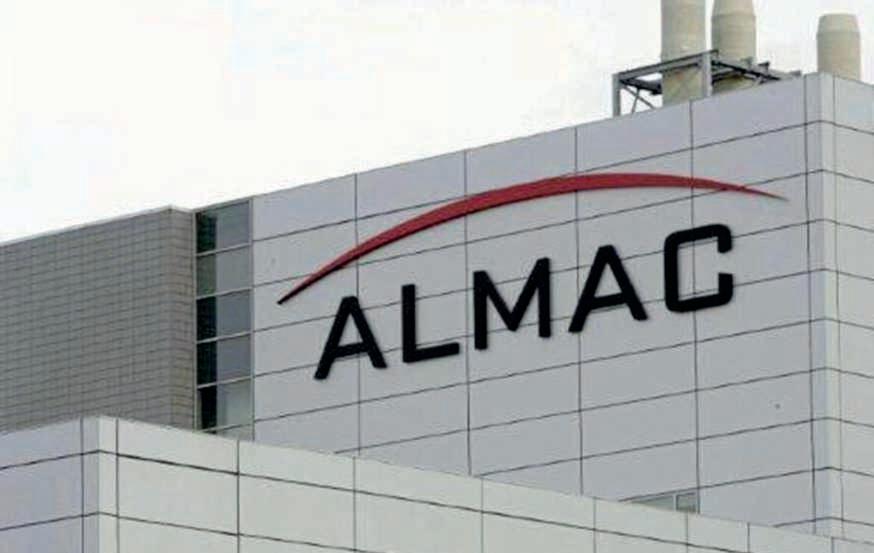
PERSONALCONTRACT
DRIVERASSISTANCEPERSONALCONTRACTHIRE
TELEMATICS

CONTRACTHIRE



MANAGEMENT

PERSONALCONTRACTHIRE
EVSOLUTIONS


ASSISTANCE

PERSONALCONTRACTHIRE

FLEETMANAGEMENT

FLEETNAVIGATOR

FLEETNAVIGATORCONTRACTHIRE
Are you switched on to the benefits of going electric?

CONTRACTHIRE


DRIVERASSISTANCE
CONTRACTHIRE





FLEETNAVIGATOR

EVSOLUTIONS

FLEETMANAGEMENT

DRIVERASSISTANCE

PERSONALCONTRACTHIRE




FLEETNAVIGATOR

CONTRACTHIRE


FLEETMANAGEMENT



PERSONALCONTRACTHIRE EVSOLUTIONS






DRIVERASSISTANCE









ACCIDENTAFTERCARE








Electric vehicles can bring a lot of benefits to your business.

DRIVERASSISTANCE


NI

TELEMATICS
Whether it’s a car, a van, electric or plug-in hybrid, we make managing company vehicles simple with our award winning solutions.
Talk to us today about how we can help in all aspects of managing your company’s vehicles.
PERSONALCONTRACTHIRE
028 9084
9777
fleetfinancial.co.uk
FLEETNAVIGATOR



ACCIDENTAFTERCARE TELEMATICS
CONTRACTHIRE

FLEETNAVIGATOR manage tnem

DRIVERASSISTANCE


FLEETMANAGEMENT
PERSONAL
From a fleet of one to a fleet of many, we’re here for you.

In the State of Global Workforce report published by the Gallup organisation in 2023, the message from the World Bank’s Chief Economist, Indermit Gill, stated that “economic growth is slowing and if we don’t increase global GDP, every other problem gets harder to solve.”
So, what can leaders do today to potentially save the world? Gallup has found one clear answer: Change the way your people are managed. In the report, they estimate that low engagement costs the global economy $8.8 trillion. That’s 9% of global GDP – enough to make the difference between success and failure for humanity.
We know most people don’t leave organisations, they leave managers, and poor management leads to lost customers and lost profits – but it also leads to miserable lives. The impact of a direct line manager accounts for up to 70% of an individual’s level of engagement. So it makes sense that building an engaged team should be the number one focus of a manager.
Gallup suggest that unless you’re No. 1 in your sector, nearly two-thirds of your staff are disengaged. Not only that, but 15% are actively disengaged. In other words, if your business was a boat, for roughly every two individuals that are rowing hard towards your goals, one employee is rowing in the opposite direction — and three more are just passengers.
I firmly believe your external level of customer engagement will never exceed the level of internal customer service. This is backed up by research from Cornell University, where they found that leaders doing what they said they would do, when they said they would do it, has a greater impact on the bottom line than improved customer service. And while many organisations invest in building customer retention, some fail to see the connection between
internal customer satisfaction (staff engagement) and external customer loyalty and retention.
Here are my five steps to highly engaged employees.
• Ensure clarity around role, tasks and expectations. Employees need to be clear on what is expected of them and given the tools and resources to deliver on that. They need to know how their success relates to the company goals and how they will be measured. They need to be given the training and support to enable them to succeed. They also need clarity on the values and behaviours that become “the way we do things around here”. Believe me, in the first few days of joining an organisation they get to see the values and beliefs within the organisation in practice. They see what you tolerate, promote and reward and they believe what they experience, not the written value statement on the wall.
• Give them opportunities to develop their skills and let them know it’s okay to fail. In Daniels Pink’s book “Drive” he explains that today’s employees need three things to thrive: mastery, autonomy and purpose. We are motivated by the ability to master a new skill or talent, so create a development plan with your people. If you can, show them the road map to prepare them to advance within the organisation. Remember, not everyone aspires to be or is good at people management, so offer ways to develop technically that can help them progress in their role.
• Provide regular feedback and recognition. Help people discover their strengths. Treat your staff 1-1’s as one of the most important tasks you can perform as a manager. Catch them doing it right and build the emotional bank account, which is exactly the same as a financial account. Keep it in
the black by giving positive deposits so when they fail or need feedback on things they need to improve, the relationship remains strong as your emotional bank account is in the black.
• Show them you care. It’s often said they don’t care until they know how much you care. We hear regularly organisations talk of “B to C” or “B to B” but all business is human to human! To thrive, we need to feel we belong, that we are valued and that someone cares. Get to know your people, invest time in understanding who they are and their circumstances. Build a trusted relationship and invest in that relationship by being a great listener, getting to know them on a personal level.
• Trust them to deliver. Building a trusted relationship enhances their ability to deliver. If trust is present, then they will be more likely to let you know if they need help, are unsure or have made a mistake. Remember that organisations who embrace failure as a route to growth, grow at a faster rate than those who have no tolerance for failure.
Businesses that have high engagement see it in tangible, measurable outcomes with absenteeism 41% lower, staff turnover 59% lower, 70% fewer employee safety incidents, productivity 17% higher, sales 20% higher – and all that goes straight to the bottom line with profitability 21% higher. It really matters!
Honeycomb’s got talent. Let’s grow your business.


al

ent to grow business honeycomb.jobs

















My career started at 18 years old when I took up a part-time role as a barista at a popular coffee chain in Belfast whilst I was studying for a qualification in hospitality and events management at Ulster University. At age 20, I was promoted to store manager and was given the opportunity to manage a range of different outlets with varying turnover levels. This gave me a rounded experience of store management and taught me how to adapt to dynamic work environments. In my role as store manager, I was proud to win the annual award for Best Staff Retention in the UK. This award gave me great pride as I placed huge importance on team morale, staff retention and overall culture within my shop.
Although I loved my time in hospitality, the pandemic prompted me to rethink my career and in July 2020, I took up a customer assistant role at Lidl Northern Ireland. Within a short space of time, a duty manager position became available, and I was encouraged to go for it by my incredibly supportive colleagues and secured the role. Despite only being in this role for less than a year, I confidently applied for the deputy store manager
(DSM) position and was successful. Working within the region’s fastestgrowing supermarket, I was delighted to be afforded the opportunity to expand my experience and to support another store refurbishment project in Newtownards. The reopening of this newly upgraded and expanded store was a fantastic project to be part of and taking on more responsibilities really helped me to showcase my abilities and growing experience as a manager.
Within a short period of time working at Lidl Northern Ireland, I could see the fantastic opportunities available within the company and knew that I wanted to one day lead my own store. Determined to carry on progressing in my role, I took on extra responsibilities and regularly stepped up to cover for senior colleagues when the opportunity arose. Shortly after my first anniversary as a DSM, an internal promotion helped to create the need for a store manager at Lidl’s Holywood Exchange supermarket where I had previously worked.
After a successful round of interviews, I was extremely proud to be given the store manager position and I haven’t
looked back since. Undoubtedly there were challenges within the first year as I got to grips with the new role but having just completed my first full financial year, I can look back on a very successful year for Lidl Holywood Exchange! Over the last 12 months our store gained top scores for customer satisfaction and engagement within the Lidl Plus loyalty app. I am very proud of my team’s development and their dedicated pursuit to be the best of all 41 stores across the region. I also take great pride in seeing my team get on so well with our shoppers and running multiple charity fundraising events such as fancy-dress fun days in store, spinathons and raffles. In fact, we’re now one of the top fundraising Lidl stores in Northern Ireland. Alongside this, I have also really enjoyed working with the local community – I was recently asked to visit a local primary school to lead a talk on healthy eating and explain our awardwinning work with local suppliers to deliver great tasting, quality food at low prices. All of these initiatives are extremely important to me, knowing that my store is able to make a positive and significant impact on the community and raise much-needed funds for our charities.
Looking ahead, I have plenty of ambition for what’s next. My goal is to continue developing my team and ensuring that Lidl Holywood Exchange continues to be recognised as one of the top performing stores in the region. Beyond this, I hope to one day use my skills and experience to fully lead the opening of a brand new store in Northern Ireland as store manager.



Ulster Rugby, with a legacy spanning almost 150 years, has appointed Keith Shorten as its Head of Commercial. He tells Emma Deighan about the opportunities that await businesses of all sizes, including the highly coveted stadium naming rights and front-of-shirt partnerships, available from next year.
With a rich background in the entertainment industry, Keith Shorten has spent almost four months at the helm in this newly created role at Ulster Rugby — one that will allow businesses to really capitalise on opportunities with the club, from a community grassroots level right up to principal sponsorships. Keith’s role is instrumental in a restructuring at the club to invigorate its commercial aspects, and to provide the platform for continued growth across the provinces.
“I’ve had the fortune of working across several iconic businesses. Before joining Ulster Rugby, I held the position of commercial director at Titanic Belfast, and before that, I spent 10 years working for AEG, which is one of the world’s biggest entertainment companies, owning and operating venues including The O2 and American Express BST Hyde Park Festivals. Whilst at AEG, I was head of sponsorship strategy, helping shape and deliver commercial partnerships across Europe.”
He describes his post today as being “a custodian of the Ulster Rugby club”. “My responsibility is to be a custodian of the club. Ulster Rugby has been around for nearly 150 years and I’m here to do my best to improve the commercial side of the club. I oversee all aspects of the commercial business, including sponsor and partner relationship management, sustainable revenue generation and driving commercial growth for the club to support both the professional and domestic game across the province.
“Ulster Rugby’s commitment extends far beyond the confines of Kingspan Stadium, as the governing body for the sport across the nine counties of Ulster. This includes overseeing all 51 registered domestic clubs, spanning from school rugby to various grassroots initiatives. Ulster Rugby actively contributes to the development of coaches and referees, establishing pathways for young players, and fostering a growth network for sustained progress,” Keith continues.
Speaking about the benefits of being part of Ulster Rugby on a commercial basis, Keith adds: “We’re very privileged that we have coverage across the whole of Ulster. We are the elite professional sports team in Ulster, competing at the top tier of professional club sport, in one of Europe’s most modern stadiums.
“In terms of a fanbase, Ulster Rugby has one of the most engaged in the northern hemisphere and, through our in-house agency team, we can provide a market-leading platform for world-class partnerships – there’s a lot that businesses can benefit from, whether it’s growing brand awareness, creating positive PR and content, showcasing a product,

“Ulster Rugby’s commitment extends far beyond the confines of Kingspan Stadium, as the governing body for the sport across the nine counties of Ulster.”
business development, staff retention and recruitment, or customer engagement.”
The club has recently announced that it will be seeking a new naming rights and front-of-shirt partnership from the 2025/26 season onwards, after a long-standing relationship with partner Kingspan, a partnership which benefited both parties greatly and allowed Ulster Rugby to build a strong foundation for the future of rugby across Ulster.
“The naming rights of the stadium and the front-of-shirt partnership are big opportunities and will generate a lot of interest.” Asked who he anticipates undertaking the leading roles, he says: “We have a lot of interesting conversations going at the moment. Something that’s really important for us is to get the right partner to develop Ulster Rugby and to help us continually improve our business on and off the pitch. A successful growing partnership requires both partners to benefit from it.”
There is a varied range of partnerships available with the club. Keith adds, “We have all levels of sponsorship and rights depending on the need of the partner. These could be hospitality packages, kit branding, fantastic lounges – both match and private conference hire – player access, static and digital boards, access to our marketable database, association, naming rights for different parts of the stadium, or it could be working with the grassroots game, senior women’s team and youth
pathways: we can develop and deliver the partnership to meet the needs of a brand.” From startups to longer-serving names in the business world, there are business opportunities for every budget. “That range of partners keeps it very interesting, and packages are tailored to each partner as every company or brand will have a different focus to achieve a return on investment. We are fortunate, as an elite sporting entity, to have a wide range of rights that we can create packages to meet those needs,” Keith continues. Commercial opportunities aren’t solely focused on sponsorship and hospitality. This year will also see Ulster Rugby launch a business club to allow participants to connect with peers from across the province, access a private business club members group to share ideas and resources and attend a series of enriching networking events featuring several highprofile keynote speakers from a range of backgrounds within the worlds of business and sport.
“It’s a networking opportunity for businesses,” Keith says, “that will bring businesses and entrepreneurs together to help generate leadership-quality conversations and provide opportunities.” Those interested in forming a partnership with Ulster Rugby are encouraged to reach out directly to Keith Shorten, head of commercial, Ulster Rugby.
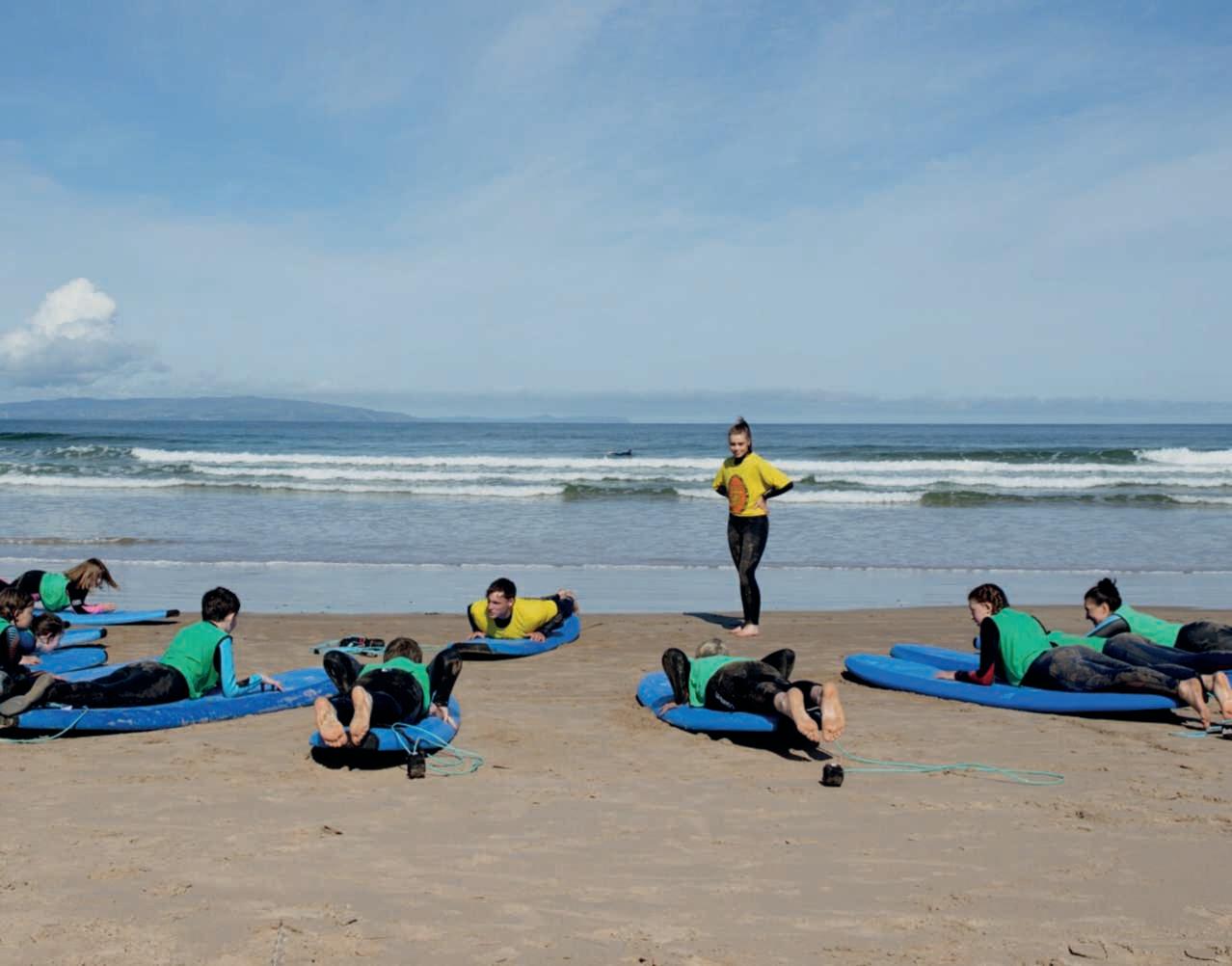
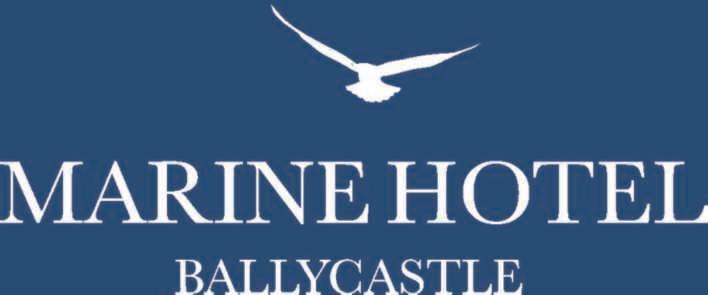


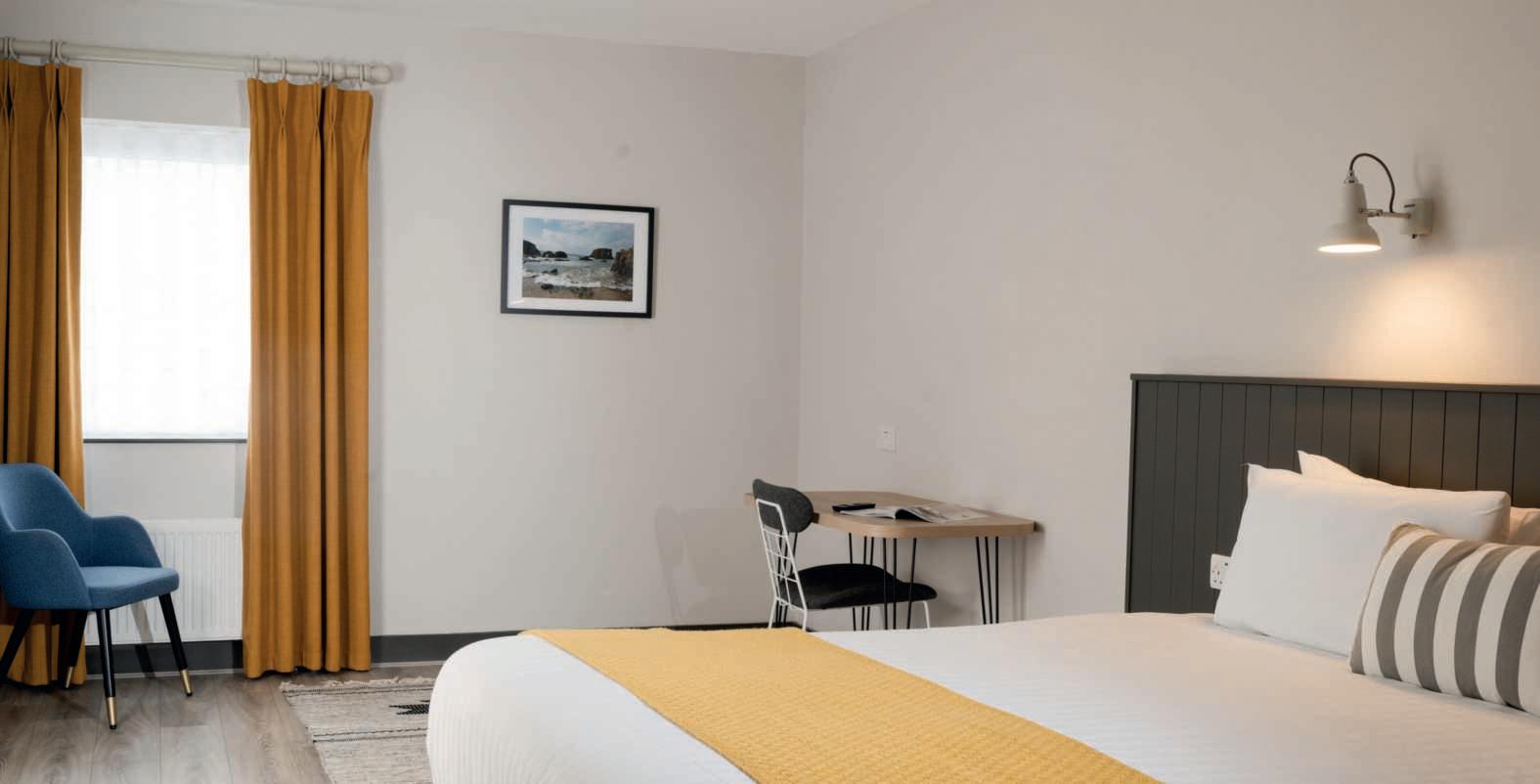



Deals partner, UK Manufacturing and Automotive lead and Northern Ireland Private Business leader PwC Northern Ireland
After a challenging period, the manufacturing industry is showing signs of cautious optimism. Along with Make UK, we conducted a major survey of senior manufacturing executives from across the UK earlier this year, which found the sector is feeling positive about the future and many are preparing for improved conditions.
While there are concerns about access to skills, rising energy and employment costs, and uncertain economic conditions – which we know are being felt locally, too – the research shows many manufacturers have a brighter outlook as they enter 2024, believing the opportunities outweigh the risks.
Manufacturers are increasingly embracing technology and digitisation to pave the way for a greener, smarter future – one that boosts competitiveness and unlocks sustainable growth. And they are prioritising increased investment in upskilling or retraining their people to get there. They’re right to do so: human skills – such as judgement, creativity, critical thinking and subject matter expertise – are as critical as ever.
Manufacturers need to understand the strategic implications of digital tech to identify routes to value and prioritise opportunities. A good place to start would be to migrate/replatform operations to the cloud, or check the efficiencies of existing platforms. PwC
research around the benefits of cloud tech across EMEA manufacturers found it increased productivity for 36% of respondents – the second most measurable value created after enhanced customer service at 37%. Overall, half expect increased productivity over the next year.
Progress is easier too with digital tech – it helps create more innovative products, tap into new markets, reduce faults and costs. Despite this awareness, the survey also shows only 12.5% are making digital tech central to their strategies.
Businesses without a fit-for-purpose cloud and data strategy will be left behind, unable to grasp the benefits of new tech, such as AI and Generative AI, that depend on cloud support. GenAI, for example, isn’t the tech solution to every problem, but it can automate and enhance aspects of almost all business operations – increasing productivity. That’s why it’s important to have the right foundations in place, both technical and operational. There’s a risk of a gulf opening between those who have seen the potential of digital tech and taken decisive action, and those who are holding back.
To navigate the changing landscape and embrace digital transformation, manufacturers recognise the need to invest in upskilling and retraining their workforce. Educating board members,
executives, and employees at all levels is key to managing costs, overcoming barriers to growth, and bridging the gap between technology and business. So what does this mean for the manufacturing sector in Northern Ireland? We recommend focusing on:
• New products and processes –investing in new products and processes is crucial for enhancing competitiveness and meeting evolving market demands.
• New markets – expanding into new markets is a strategic approach to diversify customer base and increase revenue streams.
• New digital technology – embracing digital technologies such as cloud computing and artificial intelligence (AI) is essential for improving productivity, reducing costs, and staying ahead of the competition.
By investing in these areas and prioritising upskilling and retraining, manufacturers can pave the way for a greener, smarter future that boosts competitiveness and unlocks sustainable growth.
As the industry evolves, it is crucial for Northern Ireland’s manufacturing leaders to stay ahead of the curve and seize the unique opportunities that lie ahead.




















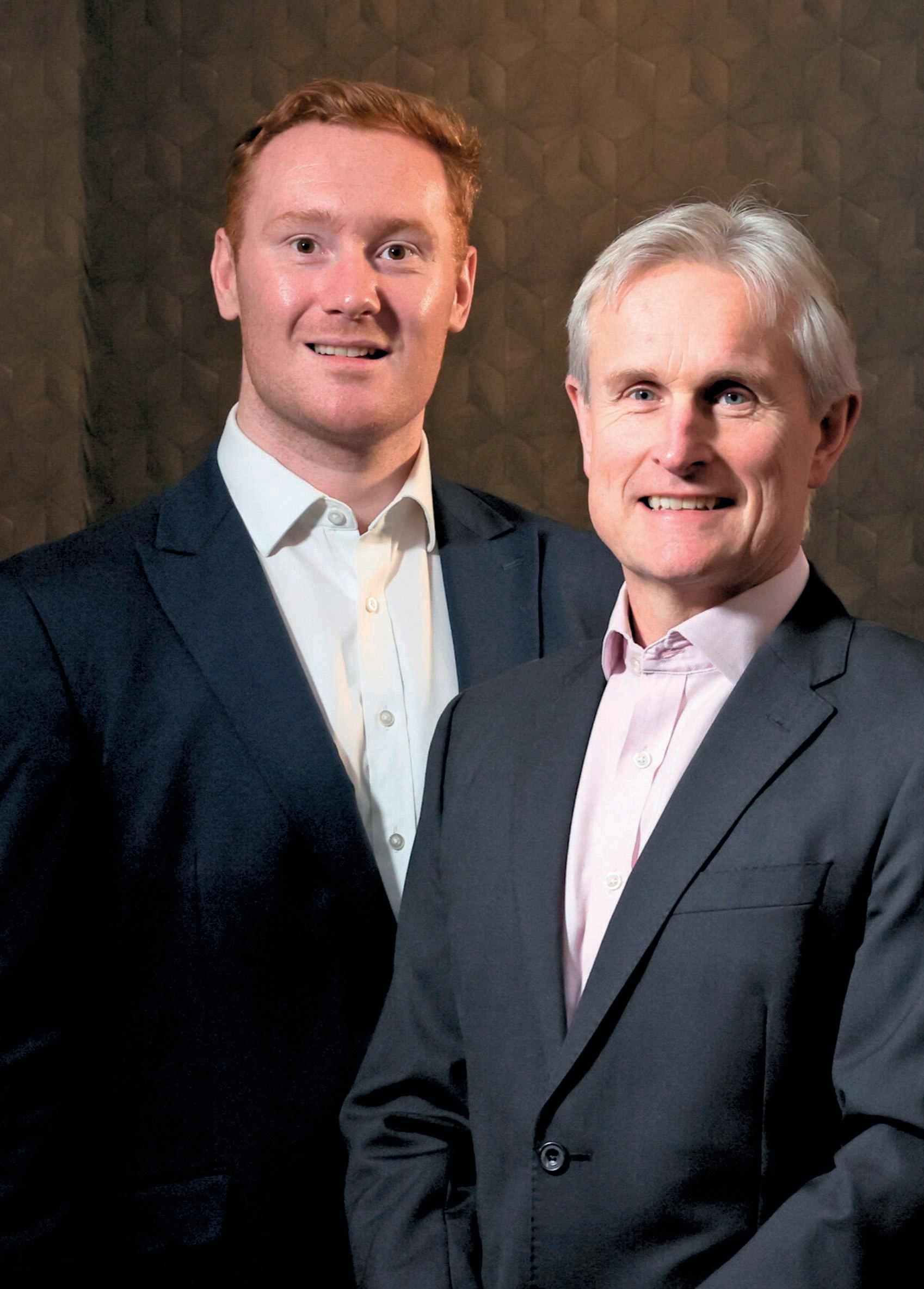
Belfast’s 4c Executive is well established as one of Northern Ireland’s top executive search firms, actively seeking top-tier professionals, including elusive inactive candidates. Emma Deighan talks executive talent scouting with the award-winning organisation that the Financial Times recently recognised as one of the leading UK search providers.
Celebrating its 10th anniversary this year, 4c Executive has cemented its position as the premier destination for executive talent sourcing. Over this span, the market dynamics have shifted significantly, with candidates now having more influence. This aligns seamlessly with 4c Executive’s mission of headhunting talent, a strategic approach that continues to serve the company exceptionally well.
Gordon Carson, managing director, proudly reflects on 4c Executive’s journey, “We don’t look at ourselves as a traditional recruitment company; we perceive ourselves as experts in search, delving deep to establish profound connections and optimise opportunities for both clients and candidates, particularly when it comes to executives and professional/middle management roles. Our commitment to excellence ensures that we work with exceptional talent, maintaining exceptionally high standards in every interaction.
“What does search mean, compared to other organisations? We aim to identify our candidates for our clients in that inactive pool of candidates, who may not necessarily be looking for a new role. If you imagine a traditional recruitment company, they will simply place an advert in the marketplace, which only reaches the audience that is actively seeking a new role. But that excludes a very large proportion of the workforce, those inactive candidates who are not only happy in their roles but more importantly successful in their roles and they will be unlikely to see the adverts.”
The essence of 4c Executive and its sister search firm, 7twenty Professional Search, lies in their ability to tap into the inactive candidate pool. Richard Greenwood, head of professional search at 7twenty, sheds light on the process, adding: “It’s a very thorough and bespoke process for each of our clients and, through our search methodology, allows us to engage with top talent who closely align to our clients’ needs and those who otherwise may not be actively seeking a new role. This allows us to reach the entire market, of which around 75% are either not actively seeking a new role or only passively seeking.”
Unlike firms that focus on specific sectors, 4c Executive and 7twenty
Professional Search employ a versatile methodology, engaging with clients across various sectors, including the private, public, and third sectors. Gordon highlights their vast depth of knowledge across various industries and the strong relationships they build with clients. Jonny Petrie, CEO of Ulster Rugby, attests to the quality and professionalism of the service provided by 4c and 7twenty, stating: “My own experience working with 4c is extremely positive. We had business critical roles to fill and get right and they took the time to thoroughly understand our objectives. We are delighted with the outcome.”
Gordon adds: “Our partnership with Ulster Rugby is a great example of how we operate. We worked with the key stakeholders of Ulster Rugby when they were looking to bring in a CEO. That was a truly global search. There was an exceptional level of interest in that role from candidates based in Australia, New Zealand and South Africa as well as across the UK. Once embedded in the organisation, Jonny Petrie came back to 4c and 7twenty to help him fill additional roles within Ulster Rugby, based on the experience that he encountered as a candidate.”
Richard explains: “7twenty launched off the back of recurring demand for an executive level service for those middlemanagement positions. We incorporated all the key elements of our search methodology and then streamlined our delivery timeframes as well as aligning commercially to the marketplace. Over the past four plus years, we have seen huge demand for and success with search at this level and we are grateful to have worked with some of the most innovative businesses here in Northern Ireland.”
Gordon continues: “Ulster Rugby is just one example of how, as an overall group, we partner with organisations at various levels. Belfast Waterfront and Ulster Hall is another great example of the value that both 4c and 7twenty can deliver jointly. Having supported Belfast Waterfront and Ulster Hall in the appointment of the current chief executive, 4c continued its partnership with both non-executive appointments and a sales director while 7twenty is currently partnering the client in the appointment of a head of marketing and communications.”
Gordon highlights that their approach involves gaining a thorough understanding of not only the client’s business but importantly its culture. He explained that they then assess whether candidates align with the organisation’s culture and values, ensuring effective integration and a strong cultural fit. This evaluation is pivotal for success for both the candidate and the client.
The firm was recently listed in the Financial Times as one of the UK’s Leading Executive Search Firms 2024. It’s a major accolade and makes the firm the only one in Northern Ireland to feature on the prestigious list.
“We were absolutely delighted to get that award. I think the most satisfying aspect of the award is that we didn’t apply for it. The Financial Times identified us as one of the leading executive search firms, based on the survey results of our industry peers and our clients. To be the only organisation in Northern Ireland recognised by the leading financial institution is particularly pleasing,” Gordon says.
Richard continues: “From a 7twenty perspective, now more so than ever, there is a need for search at the middlemanagement level. The job market and recruitment landscape has evolved significantly in recent years with the spotlight not only on remuneration but also on health and wellbeing, hybrid working arrangements and skills development when attracting and retaining talent. When our clients partner with us, they benefit from getting an indepth understanding of the recruitment market in their specific area of need as we provide detailed insights from 100% of the candidate market through our search process.”
With the recent endorsement from the Financial Times serving as a significant testimonial, it appears that the upcoming decade will prove just as prosperous for the firm. Gordon concludes: “Having been a prominent presence for a substantial period, we are acknowledged as experts in executive search. What sets us apart is not only the recognition from our clients but also the acknowledgement from esteemed entities like the Financial Times – it’s not merely our claim.”



W5 LIFE (Learning Innovation for Everyone) and Queen’s Communities and Place (QCAP), in association with the Market Development Association (MDA), are pleased to announce the launch of a new Open College Network (OCN) Northern Ireland Level 1 qualification. This bespoke programme is designed to support the education, training, and employability of individuals spanning multiple generations living in the Market area of South Belfast.
Delivered between W5 LIFE and MDA’s Markets Community Centre, the fully funded six-week Information Technology Applications programme has been codeveloped alongside residents of Belfast’s Market area to ensure that all content focuses on the community’s educational needs and digital skill requirements.
The pilot programme will offer the first cohort of 11 students, who are either in their first or second year studying at university, a flexible approach to learning, helping them to overcome self-identified barriers in their personal and professional lives, such as navigating email software, sharing digital files, using their university’s online portal, and accessing their children’s homework via virtual classrooms.


Judith Harvey, Group Head of Learning and Engagement at The Odyssey Trust, said: “We are incredibly proud to be working alongside Queen’s Communities and Place and the Market Development Association to bridge the education, knowledge, and skills gap outlined by members of the Market community, equipping learners at all stages of life. Since opening its doors in 2022, W5 LIFE has been committed to promoting inclusion, diversity, and lifelong learning through a range of STEM-based experiences for people of all ages across Northern Ireland by removing barriers to education, and the launch of this OCN Northern Ireland qualification helps us to continue to do just that.”
W5 LIFE, a newly registered OCN centre, is now able to deliver OCN-endorsed courses between levels 1-3 across a range of subjects to people of all ages and abilities. Through focused consultations with the inaugural cohort, W5 LIFE worked alongside programme partner, QCAP, to identify core modules for the pilot project –Email Software, Spreadsheet Software, and IT User Fundamentals – to meet the needs of participants and enhance their digital skills, helping them to reach their full potential at home and at university.
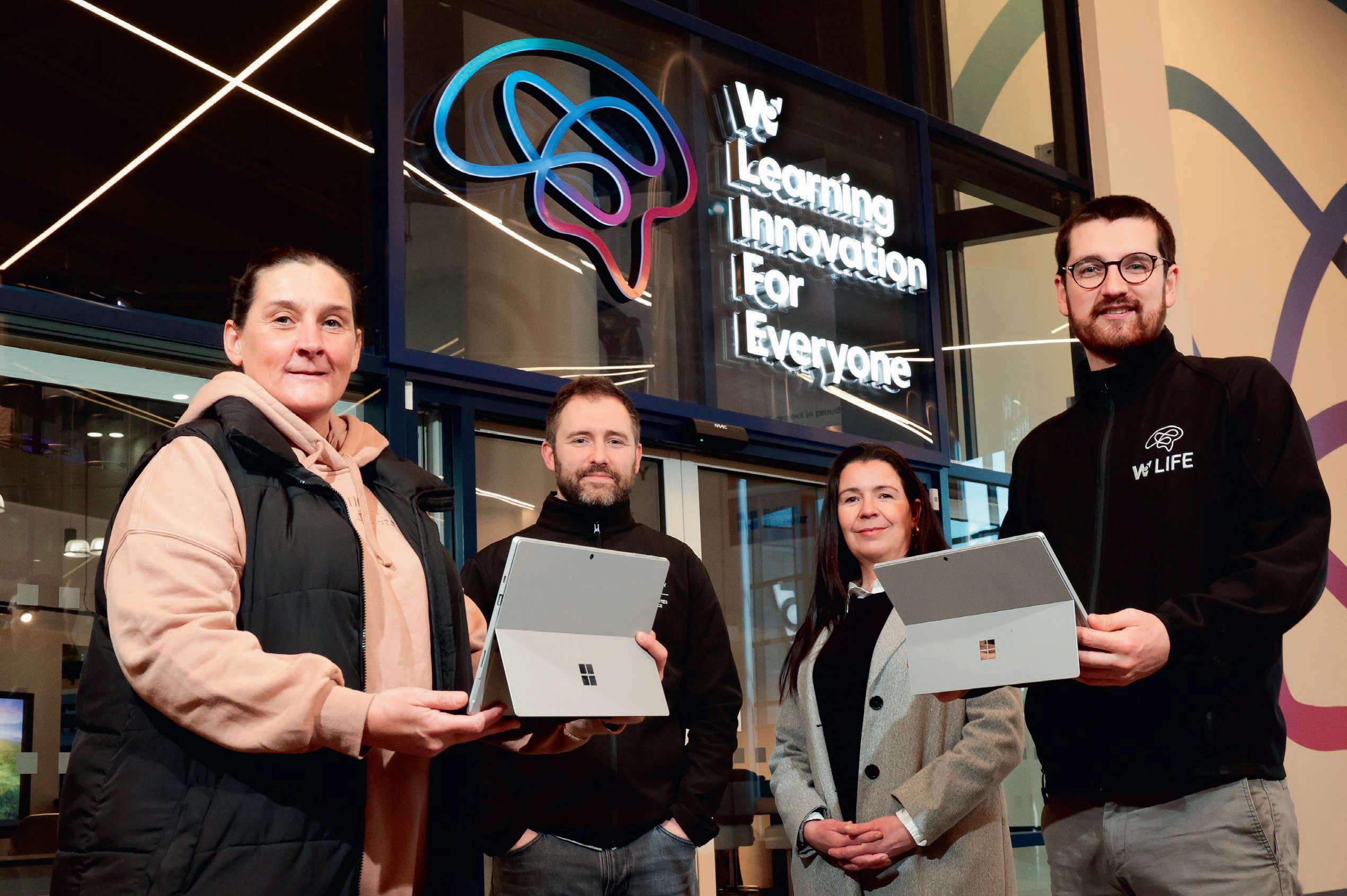


Dr Gareth Robinson, Dimension Lead for Education and the Knowledge Economy at Queen’s Communities and Place, commented: “The introduction of the ICT OCN Level 1 course – a joint effort with W5 LIFE and the Market Development Association – is a significant development in QCAP’s dimension of place that focuses on education and skills. This course is a direct response to the educational disparities and digital skills gaps highlighted in our ‘Growing up in the Market’ study. By concentrating on these critical areas, we aim to equip our partner communities with the necessary tools to navigate and thrive in the rapidly evolving economic landscape of Northern Ireland.
“In the development of this course, we’ve taken a unique approach by involving the residents in the curriculum design. The collaborative process ensures the course is not only tailored to their needs, but also empowers community members to take charge of their own learning journey. It’s about making education a shared, community-driven experience, which is key to changing how underserved communities engage with our knowledge-based economy and society.
“This partnership with W5 LIFE represents a step towards connecting our community partner to the wider ecosystem of innovation and skills in Belfast, particularly in STEM-related fields. We are confident that by establishing these new connections and focusing on practical, co-created learning experiences, we are setting a precedent for how educational initiatives can directly support and elevate communities, making a positive impact in their daily lives and prospects, in meaningful ways.”
QCAP, an initiative by Queen’s University Belfast, focuses on building partnerships between communities,
policymakers, and academics to help tackle social challenges in Northern Ireland. Joining up with community partner MDA – a community development group dedicated to promoting the wellbeing of all residents living in the Market area of South Belfast – the pilot project aims to address place-based research by tackling social challenges and improving outcomes for members of the Market community.
Siobhan McDonnell, Educational Lead at the Market Development Association, said: “The MDA greatly welcomes the upcoming ICT programme delivered by W5 LIFE. There’s a great need for this type of programme locally, especially due to the digital exclusion in adults within the area.
“With several residents returning to Level 3 education, barriers have been identified surrounding a lack of ICT skills, which can be detrimental to the students’ academic progression. The programme will allow residents to successfully continue with their studies and benefit their capacity to do massively.”
The OCN NI Level 1 Award in Information Technology will take place across a six-week period, with delivery concluded by Easter 2024. To find out more about W5 LIFE and QCAP visit www.w5life.co.uk and www.qub. ac.uk/sites/qcap/.
Pictured (L-R): Tracy Conlon, Market resident and first-year university student; Dr Gareth Robinson, Dimension Lead for Education and the Knowledge Economy at Queen’s Communities and Place; Marie Therese Smith, Market resident and second-year university student; Conor McKay, Learning Centre Lead at W5 LIFE.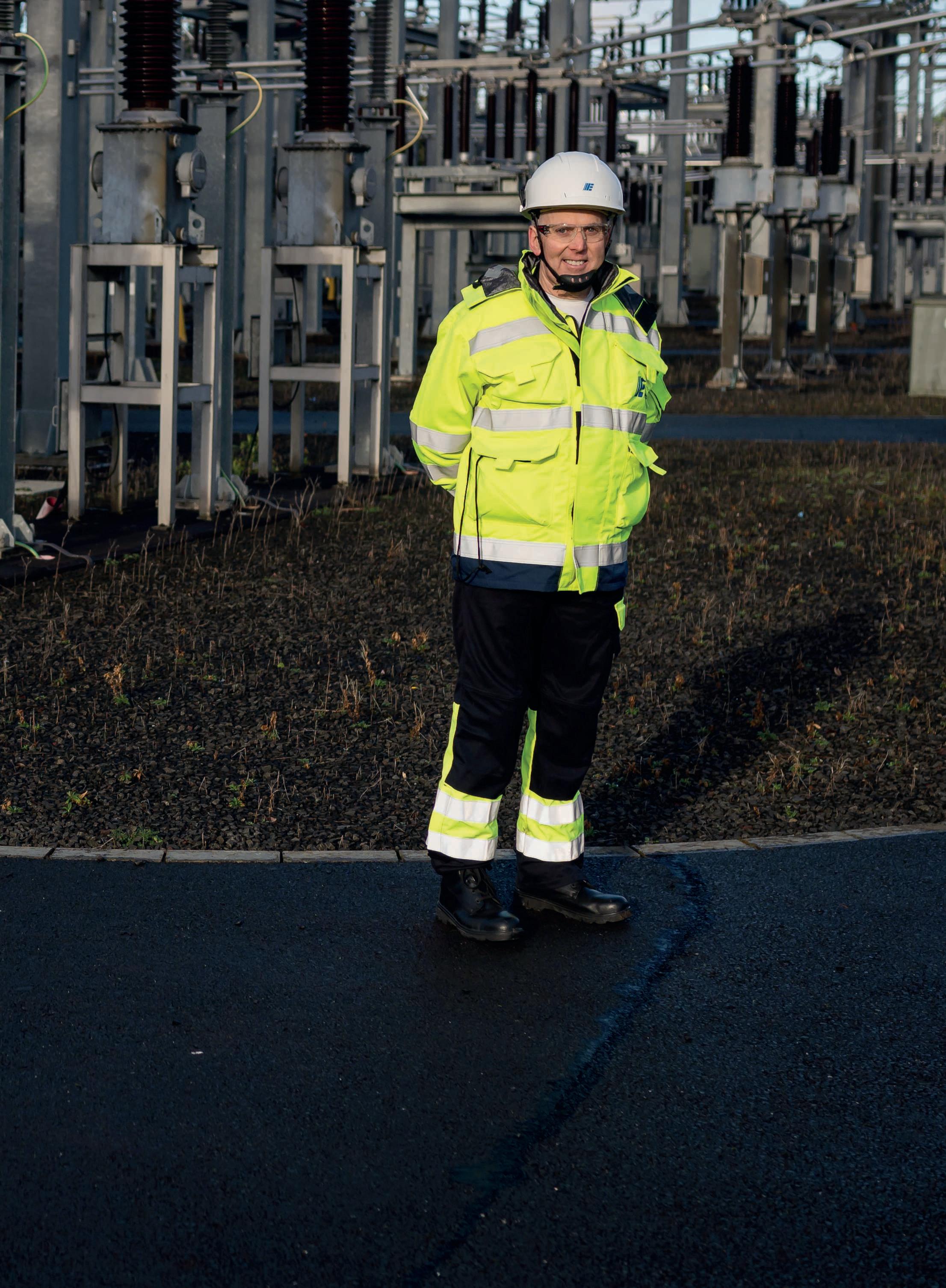
SIR DAVID STERLING, THE FORMER HEAD OF THE NORTHERN IRELAND CIVIL SERVICE (NICS), HAS TAKEN UP HIS ROLE AS CHAIR OF THE NIE NETWORKS BOARD OF DIRECTORS. HE’S EXCITED TO OVERSEE A PERIOD OF PROFOUND CHANGE IN THE ENERGY LANDSCAPE OF NORTHERN IRELAND, EMMA DEIGHAN REPORTS.

“The electricity network is a gateway for Net Zero, and investment in it will create a better environment for future generations of people in Northern Ireland.”
The allure of David Sterling’s new position on the board of NIE Networks derives from a long-standing fascination with energy. It began within the NICS back in 2008 when he was closely involved in the development of energy policy.
“Energy is always an area that I’ve found fascinating. It’s something that has a huge impact on everyone’s lives,” he begins. “I was closely involved in developing energy strategy for Northern Ireland so I had a clear understanding of the impact which that policy, and the companies involved, including NIE Networks have on our households and our businesses. I was delighted to be invited to join the board and to be asked to become chair during what is a crucial moment for the energy industry.
“The 2022 Northern Ireland Climate Change Act, which aims to achieve netzero emissions by 2050, was a pivotal moment in shaping our future. A critical objective on this journey is the imperative to decarbonise our electricity network, a task in which we are poised to play a crucial role”.
Sir David will take over from Dame Rotha Johnston, who was appointed as independent non-executive chair of the board in March 2020, having been an independent non-executive director since 2011.
“I’d like to pay tribute to Rotha Johnston who has done a fantastic job: she leaves behind a well-motivated top team and an energised workforce,” he says.
The challenges ahead loom large, particularly in managing a substantial increase in NIE Networks capital investment program – likely to be to the tune of £4bn over the next decade – but Sir David expresses confidence in both dedicated in-
house teams and private sector contractors.
“The goal is clear: a significant upgrade to the electricity network, enabling individuals to harness low carbon technologies which will result in a major shift towards renewable energy,” he says.
That staggering £4 billion investment – £2.6bn of which is part of NIE Networks business plan that it submitted to the Utility Regulator (UR) in March last year for the RP7 price control period – is about delivering investment to facilitate our energy transition.
The Utility Regulator has acknowledged that the larger RP7 spend is necessary for that, “an acknowledgement that is both welcome and very positive,” NIE Networks says.
The investment will aim to “facilitate the decarbonisation of society, maintain a safe, reliable and resilient network, ensure customers continue receiving an excellent level of service and ensure our business is prepared for the future”.
“Our investment will be one of the biggest private sector investments in Northern Ireland over the coming years. The need for investment is clear. The electricity network is a gateway for net zero, and investment in it will create a better environment for future generations of people in Northern Ireland,” says Sir David.
“We anticipate significant challenges ahead as we embark on this capital investment program. Managing this surge will undoubtedly be a test for us, but I am confident we are up for the task. Stepping into the role of chair, I have been impressed by the calibre of our team and their unwavering commitment to meeting the demands that lie ahead. Expect nothing less than our very best efforts. Naturally, we will lean on contractors for support, fostering collaboration with private sector
companies, particularly those inclined to invest in renewables. This symbiotic relationship not only promises wider economic benefits but also contributes significantly to our climate objectives.”
NIE Networks is the owner of the electricity transmission and distribution networks in Northern Ireland and is the electricity distribution network operator, serving over 910,000 customers connected to the network including homes, businesses and farms.
It shares responsibilities with SONI in respect of the transmission network. SONI is the System Operator for Northern Ireland and is responsible for the operation and planning of the transmission network. NIE Networks owns, develops and maintains the transmission network.
Its network is about 50,000km in length and mainly comprises overhead line. The ambition is to connect around 2GW of renewable generation to the networks alongside the existing, conventional gas-fired generators.
The £4bn to be invested over the next decade will facilitate this unprecedented energy transition. Sir David adds: “The main focus of the investment is about upgrading the network and it is vital that we get RP7 right in order to reach our net zero goals and become an enabler for business growth in Northern Ireland. The people of Northern Ireland need to trust the electricity network, that it will be reliable enough to allow them to move towards consuming more electricity, as they replace fossil fuels in their homes, businesses and transport.
“We anticipate an increase in renewable generation and the requirement to manage that safely and reliably. At the minute, for example, we don’t have offshore wind farms but we’re expecting to see a significant increase in that area in future.”
With this investment, recruitment will become a key aspect, with the NIE Networks workforce set to increase from 1500 to 2100, across a range of skill sets.
With timelines and deadlines set for our journey to net zero by 2050, it begs the question, is this an achievable goal? “It’s
going to be incredibly challenging but, as far as NIE Networks is concerned, we are totally committed to getting there. There are two big milestones along the way: 80% of electricity should come from renewables by 2030, and by 2050, 100% of electricity should come from renewables. Currently, around 50% comes from renewables, so that’s quite a big target. What will be critical, will be the conclusion of the RP7 pricing control process. The Utility Regulator published its draft determination in November. We will be submitting a response to this shortly and ultimately we’ll arrive at an agreement that will set out how much investment we’re allowed to make.
“A goal within NIE Networks is to enable business investment in Northern Ireland and create an environment that makes connections for all businesses efficient and affordable. It’s therefore crucial that this investment plan meets the needs of Northern Ireland plc and that we work with policy makers to ensure that we are able to facilitate business and economic growth in Northern Ireland.
“NIE Networks, like a lot of organisations, has been working in a constrained financial environment, so it’s exciting to come in at a time of significant growth and investment. The sense of excitement in the organisation is palpable, people are looking forward to this. There’s a nervousness over the scale of the work, but that’s a nice challenge to have,” he concludes.


The spirit of innovation epitomised by Walter Wilson will be harnessed by the next generation of engineers at Queen’s University thanks to a new scholarship funded by Ulster Carpets.
Thanks to the new initiative, each year the Ulster Carpets Walter Wilson Scholarship will support two students who face social or economic barriers to higher education to join the School of Mechanical and Aerospace Engineering. Engineering students Ellen-Jane Boyd and Jack Smyth will be the first recipients of the £7,500 annual bursary which will support them during their education.
The eldest son of company founder George Walter Wilson, Walter became Managing Director of Ulster Carpets in 1954 aged just 24 and he remained involved in the business in various capacities until his death in 2014.
Known for his drive for innovation, understanding of design and having an eye for future trends, Walter’s passion for engineering remains instilled in the successful company that is still owned and run by the Wilson family.
John Wilson, Chairman of Ulster Carpets and Walter’s nephew, said the scholarship is a fitting tribute to Walter’s impact on the company.

“Walter was a real pioneer, and it was his vision that transformed Ulster Carpets from a minnow within the competitive UK carpet industry into what we are today – one of the largest and most successful producers of woven carpet in the world.
“In order to retain our position as a world-leader, we need people with Walter’s innovative spirit and passion for engineering. We are delighted to work with such an acclaimed university as Queen’s to provide more opportunities for students to unlock their potential and make a real difference.”
As part of the scholarship, the students will have the opportunity to spend up to two weeks of paid work experience at Ulster Carpets’ global headquarters in Portadown.
Assistant Director of Philanthropy at Queen’s, Helen Carrick, said: “The support of companies such as Ulster Carpets for young people who have had to overcome social or financial barriers to access higher education is hugely important. This kind of backing can change lives and we are extremely grateful for the generous and meaningful investment in our young people.”
Speaking about the scholarships, Professor Juliana Early, Head of the School of Mechanical and Aerospace Engineering Aerospace and Manufacturing said: “We are delighted to be working with Ulster Carpets on the launch of the Walter Wilson Scholarship. This scholarship will not only provide financial support for our future engineering talent, but will also provide valuable hands on experience in a vibrant company and the opportunity to work alongside industry experts fostering innovative thinking and entrepreneurship.”


By leaving a gift in your will to Queen’s University, your legacy will continue long after you’re gone.

You will help fund research and innovation so we can meet the biggest challenges facing our society, build a stronger economy, and enable the next generation to thrive.
Your gift, no matter how large or small, will help us make a real di erence.

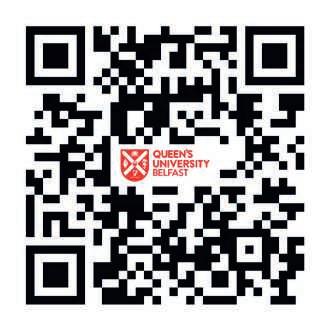
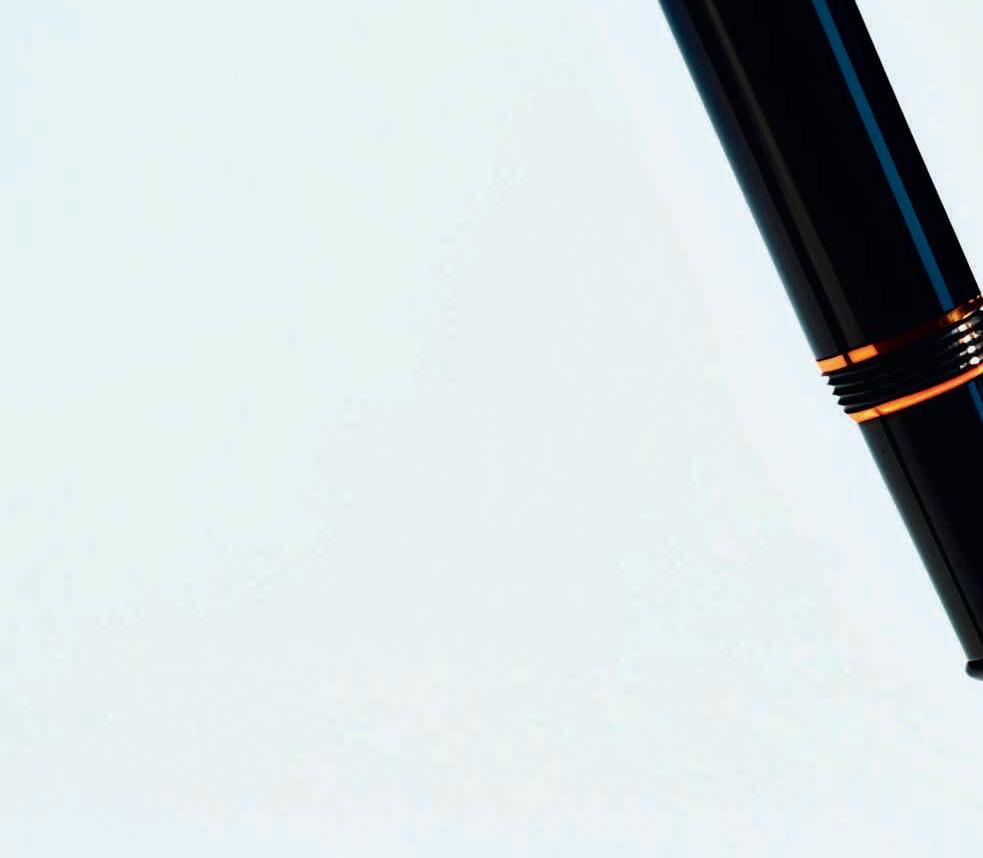


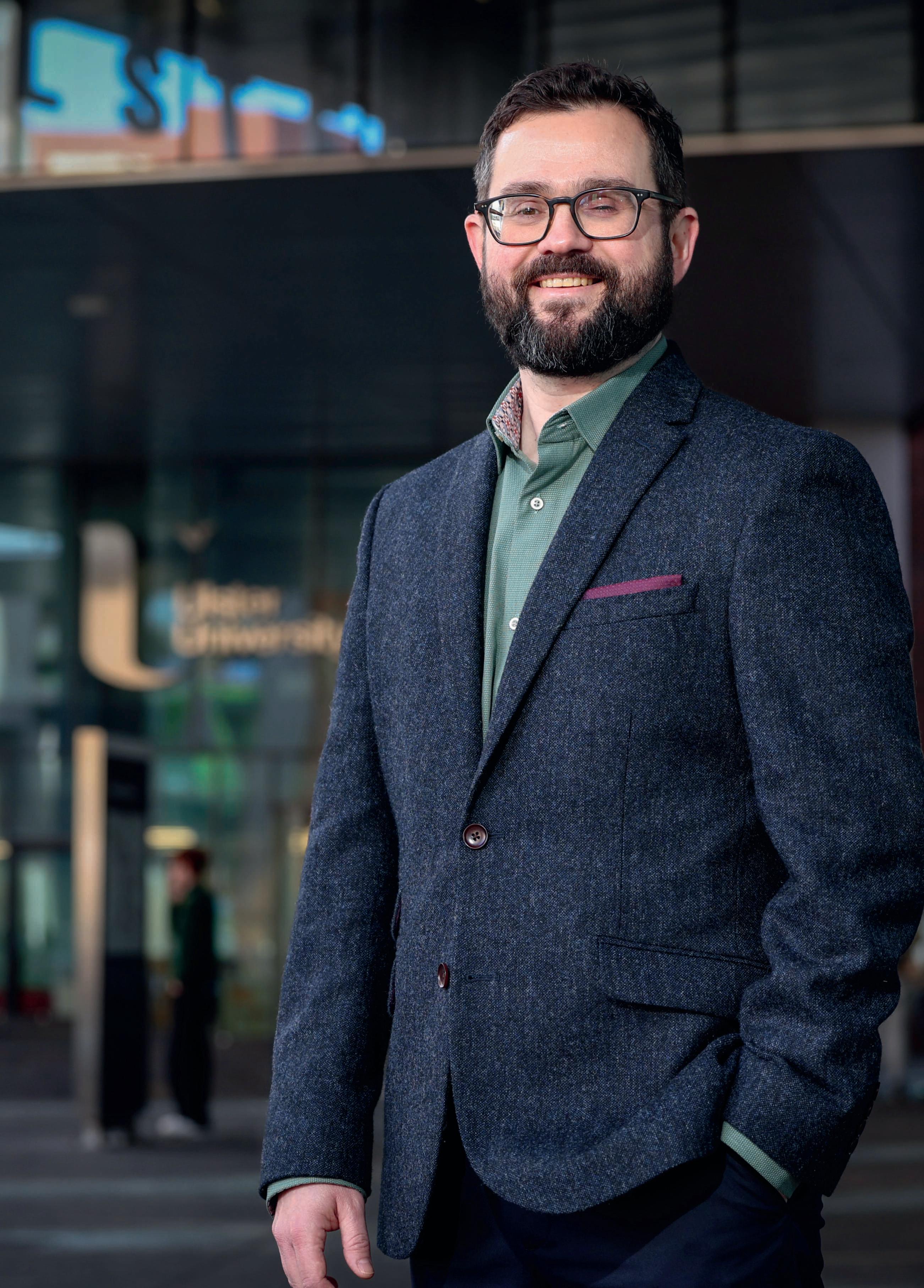

Ulster University’s Executive MBA has recently undergone a substantial revalidation, positioning itself as a cuttingedge programme tailored to meet contemporary industry standards and emerging business needs. Senior Lecturer in Management and Course Director Mark McCrory delves into the intricacies of the programme with Emma Deighan.
For more than 35 years, the Ulster University Business School has upheld a tradition of delivering an exceptional Executive MBA. Throughout the decades, both past and present, its graduates have assumed pivotal leadership roles on a global scale.
The Executive MBA offered at Ulster University is a globally recognised qualification enabling experienced and aspiring business leaders and managers to shape a successful career.
To guarantee that the course and its modules remain a true reflection of the evolving dynamics within the local and global business world, a comprehensive update is undertaken every five years. This year marks the inaugural implementation of the newly revised programme for 20242029.
“The Executive MBA is crafted to develop more strategic, innovative, and responsible leaders, impacting organisations and the Northern Ireland economy globally,” Course Director Mark McCrory explains.
The programme aims to cultivate the essential knowledge, skills, and values needed for success today and in the future, while the limited intake ensures a concentrated and focused learning experience.
“Often when students join the programme they are already well established in their chosen field and ready to take their career to the next level, branching into senior management and leadership positions that extend across the organisation. That is the starting point of the Executive MBA, to enhance students’ knowledge of business functions, processes and strategies that extend beyond those they are familiar with,” Mark continues.
The core modules in the Executive MBA are accounting and finance for senior leaders, operational excellence, people and change, and marketing management: modules like strategy and international competitiveness seek to develop a global perspective, and the leadership development module focuses on developing ethical, values-based leadership and promoting sustainability.
Mark adds that the entrepreneurship and enterprise development module helps students further “develop an understanding of the mindset, knowledge and skills needed to pursue entrepreneurial activity both within organisations and through new venture creation.”
He continues: “The corporate governance and boardroom management module is another core part: it considers
how corporate governance, underpinned by transparency, accountability and integrity, translates into practice for achieving organisational objectives as effectively and ethically as possible.”
New with the revision of the programme are additional modules including leading digital transformation and innovation. “That looks at how senior managers and leaders can leverage digital technology to bring about cultural transformation and how to meet consumers’ needs,” Mark explains.
“Strategy and international competitiveness is another new module and this is about the international positioning of organisations in NI within the global economy and in a post-Brexit world, not just locally. What is special about this module is that it is informed by the link Ulster University has with Harvard Business School and they have been trained on the Harvard approach,” he adds.
A hallmark of Ulster University’s Executive MBA is its intentionally small intake, welcoming only 20 students annually. Mark elaborates: “This deliberate choice fosters a cohesive group, centered on in-class discussions of real-life cases and the professional experience of the candidates.” He says the programme emphasises small-group and projectbased learning, creating an immersive and collaborative atmosphere.
Experienced teaching staff, often with industry backgrounds, and guest speakers from a pool of thousands of alumni and industry experts further enhance the uniqueness of the learning experience.
The average Executive MBA student comes with eight to 10 years of seniorlevel work experience, contributing to a diverse cohort. Mark continues: “There’s a rich variety of backgrounds and experience in that group, and that’s beneficial to the students.”
And while admission criteria includes a second-class honours degree, there are exceptions considered based on individual backgrounds. This stringent process ensures a cohort of high-calibre professionals, enriching the collective learning experience.
Delivered on a part-time basis over two years through lectures and workshops, there are no exams in the Executive MBA. Instead, the schedule focuses on opportunities to apply knowledge immediately via practicalbased assignments, and calls upon industry experts as guest speakers to
“It’s about students relating their work experience, encouraging them to take action in their own organisations. The curriculum has evolved to include action research projects, replacing traditional dissertations and helping sponsored students to demonstrate the immediate impact of the programme to their employers.”
offer invaluable insights into real-world scenarios.
Encouraging a reflective and practical learning approach, the programme capitalises on immersive technology suites and active learning methodologies. Mark says: “It’s about students relating their work experience, encouraging them to take action in their own organisations. The curriculum has evolved to include action research projects, replacing traditional dissertations and helping sponsored students to demonstrate the immediate impact of the programme to their employers.
“The programme is also designed with busy professionals in mind,” Mark adds. “Learners have access to online resources and a structured curriculum, helping them balance their studies with existing commitments and limit any disruption to their career.”
While there isn’t a typical student, the cohort shares one thing in common; career progression. “Most students want
to progress in their careers, seeking to stay in their current roles and step up.” Mark notes that each year sees a few participants looking for a change, self-sponsoring their education, and leveraging the Executive MBA to pivot in their careers. Additionally, individuals contemplating entrepreneurship find the programme beneficial in providing a broad foundation for their endeavours.
Geared to equip seasoned professionals with the strategic leadership skills necessary for success in today’s dynamic business landscape, Mark concludes: “People are drawn to the course primarily for career progression. Our students are usually in a place where they want to move into a senior leadership position or change direction. Some self-sponsor, others are supported by their business. This gives credibility and – while it’s a big investment – we ensure it’s worthwhile by delivering real value at both an individual and business level.”
Applications are now open for September 2024. For further information and to apply, visit ulster.ac.uk/emba
The current course spans two years and the programme offers a 10% discount for Ulster University alumni, further enhancing the accessibility and appeal of the Executive MBA.
Speaking about his experience during and after completing the MBA, Global Business Manager for Sunjet inkjet inks, David Reid, said: “The education that comes from the Ulster EMBA sets you up to understand, empathise, and work with all the functions around a boardroom table. Having that wider knowledge breaks down the functional, vertical barriers and ensures that you take a rounded approach on how best to build on the success and manage the challenges in a company – and not just focus on your own vertical function.
“From a financial perspective, the course gave me the skillset to understand the full costs involved both above and below the line in my business area, which is essential when negotiating large-scale business for the long-term of any business and how to maximise a company’s value.”
Today Mr Reid uses the knowledge he acquired from the EMBA “in my dayto-day work to maintain a successful business in a high growth area”.
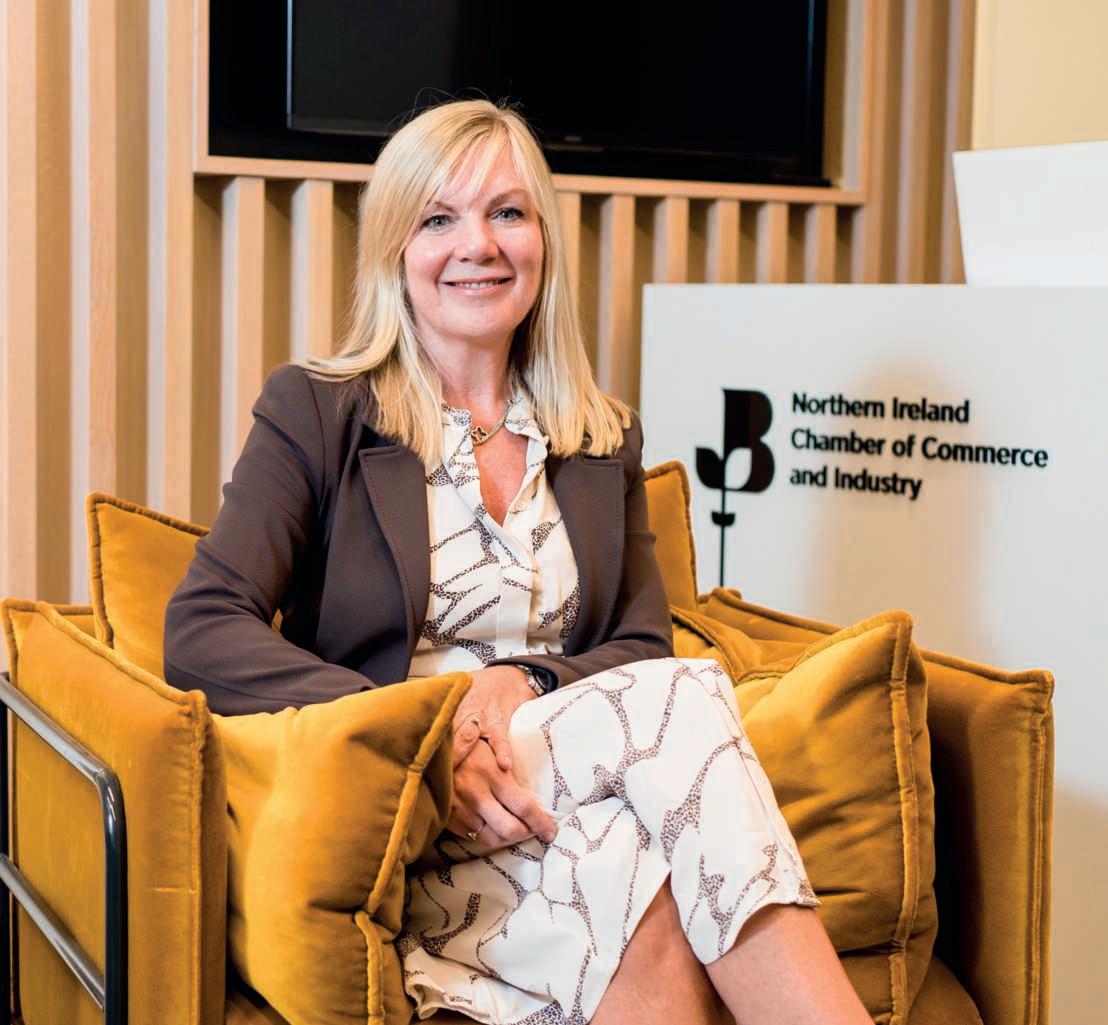
he first quarter of the year has seen some very exciting new developments at NI Chamber, not least the announcement of a new strategic partnership with our counterparts in North Carolina Chamber.
In recent weeks, we had the privilege of travelling to the US city of Raleigh to sign our first MOU, which opens amazing new opportunities for member businesses on both sides of the Atlantic to collaborate, share research and do business together. That is a very significant milestone and one you can expect to hear much more about in the months to come.
Following that, we spent a busy few days in Washinton D.C., representing our member companies at a host of business, political and civic engagements.
At home, we have also launched a new flagship event, the Momentum Economic Conference, which is a platform for NI Chamber members to share the experiences, ideas, barriers and solutions which are most pertinent to business growth right now.
The half-day event on 18 April will feature an interesting mix of key-note speeches from industry leaders and subject-matter experts, including the Economy Minister as well as interactive panel sessions and collaborative break-out zones, all focused on overcoming challenges and accelerating Northern Ireland’s competitive advantage through partnership. We invite you to come, contribute and be part of a solutions focused, outward looking morning of collaboration and reciprocal learning.
That is in addition to the launch of a brand new digital and cyber series with Queen’s University that kicks-off in April, as well as a host of other networking and learning events to come.
Finally, as well as more than 50 new members, we are also delighted to introduce two new NI Chamber Patrons: Galgorm Collection and Belfast International Airport. Both organisations have chosen to demonstrate their commitment to business and economic growth by lending their support to NI Chamber’s work, so we thank them sincerely for that.
Established Drinks
ASCERT
Aethergy
Allen People Solutions
Aluminium & Plastics Systems
Baker McKenzie
Bayview Hotel
B-Secur
C & O Milligan NI
Construction
Employers Federation
CGI
City Hotel, Derry
Cloudsmith
CreevX
Dara & Co
Dennison Commercials
Digi Sign NI
Effective Business
Consultancy
Electrac NI
Fastway NI
Gray + Press
Accountants
Heron Bros Ltd
HST Hiring Group
iPower Flexible Energy
Jo Hopkins Consultancy
Lauralu
Magna Software Ltd
Malone Golf Club
Martin Engineering
Supplies
Montalto Estate
Morrow Group
OCO Global
PIPS
Pure Irish
Silent Valley Fertilisers
Staff Nursing & Staff
Training
Storm Technology
Susneo
The Keystone Group
The Wave Project NI
Triterra
TST Group
USPCA
Voice Engineer Ireland
White Ribbon NI
Wilson Power and Energy
* To become a member of NI Chamber join online at www.northernirelandchamber.com or phone the membership team on 028 9024 4113
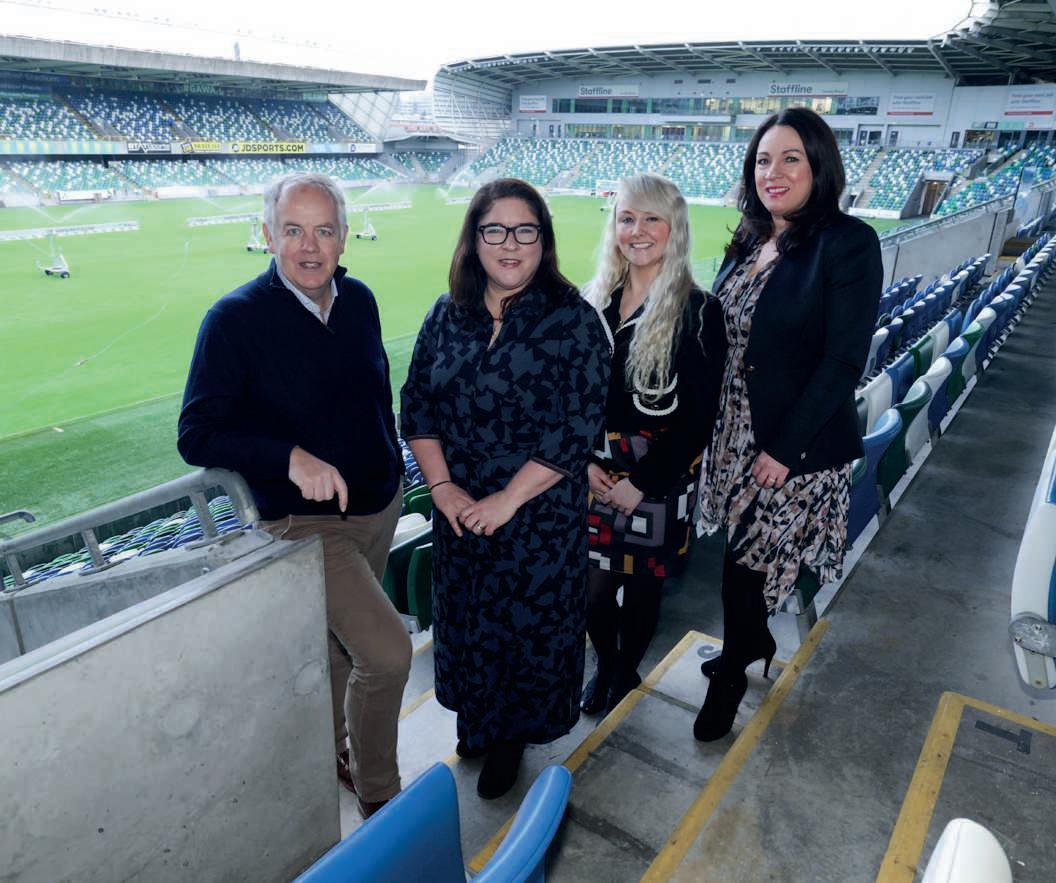

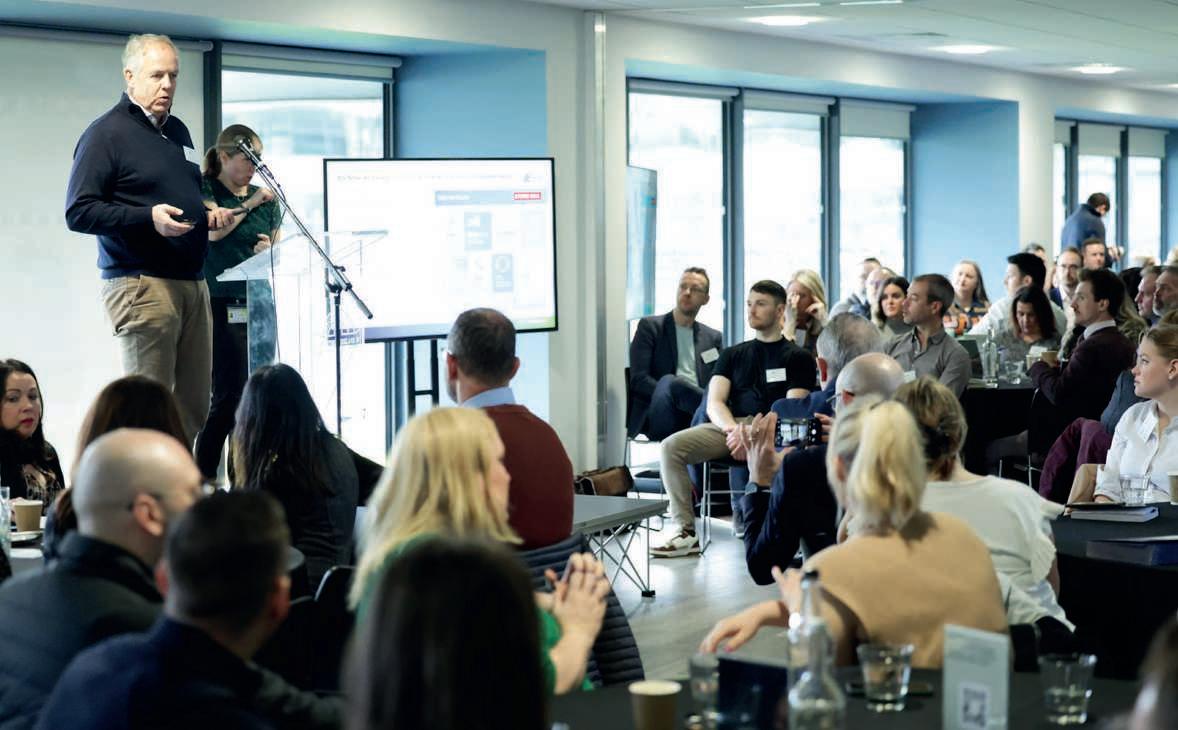

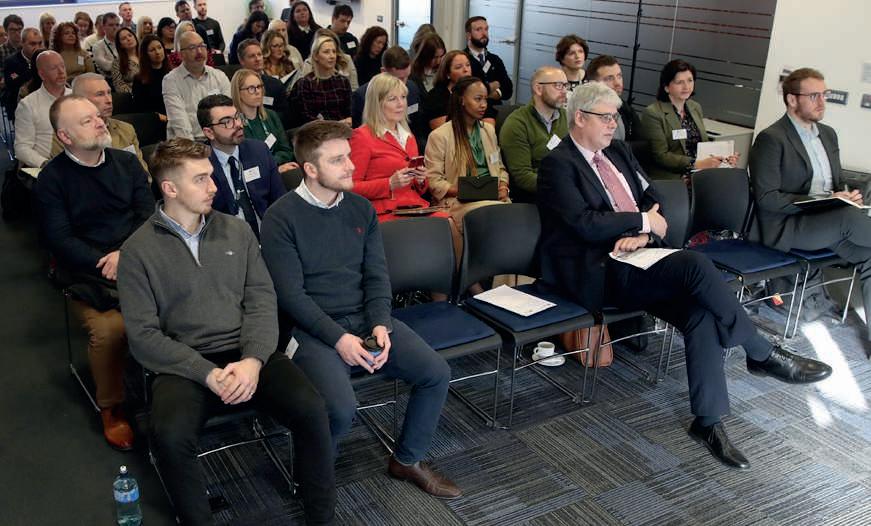
1. Ian Hunter (NIE), Kerry Anthony (Inspire Wellbeing), Petrina McAuley (NI Chamber) and Caroline Coyle (NI Chamber).
2. Attendees at the Regional Networking event had the opportunity to network.
3. Ian Hunter (NIE) welcomes guests to the first of the 2024 Regional Networking series.
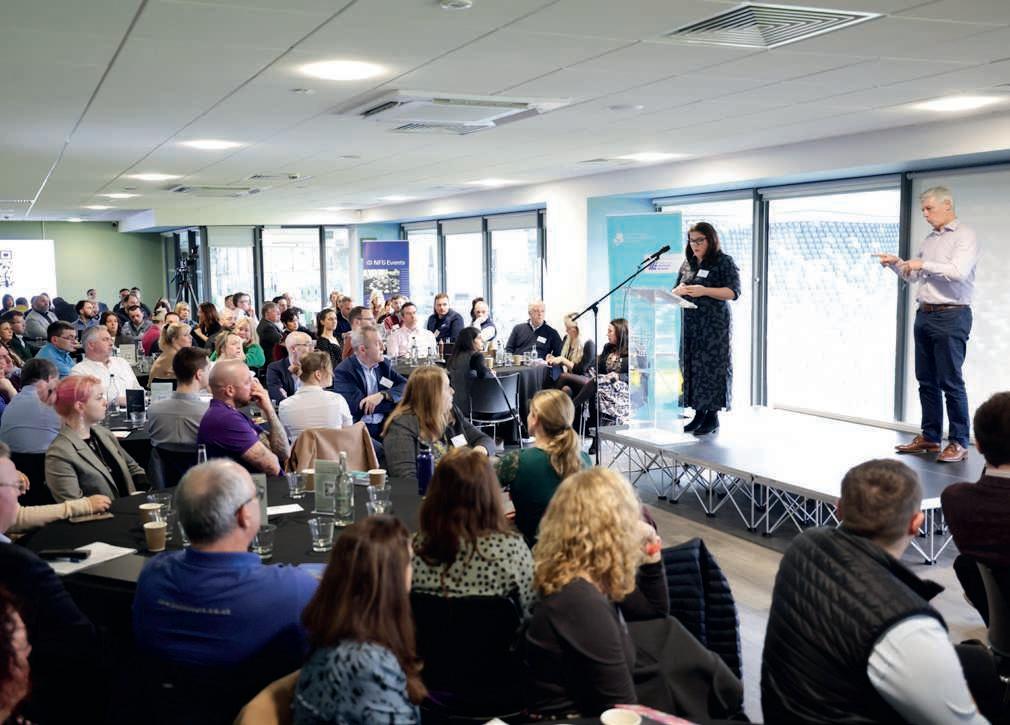
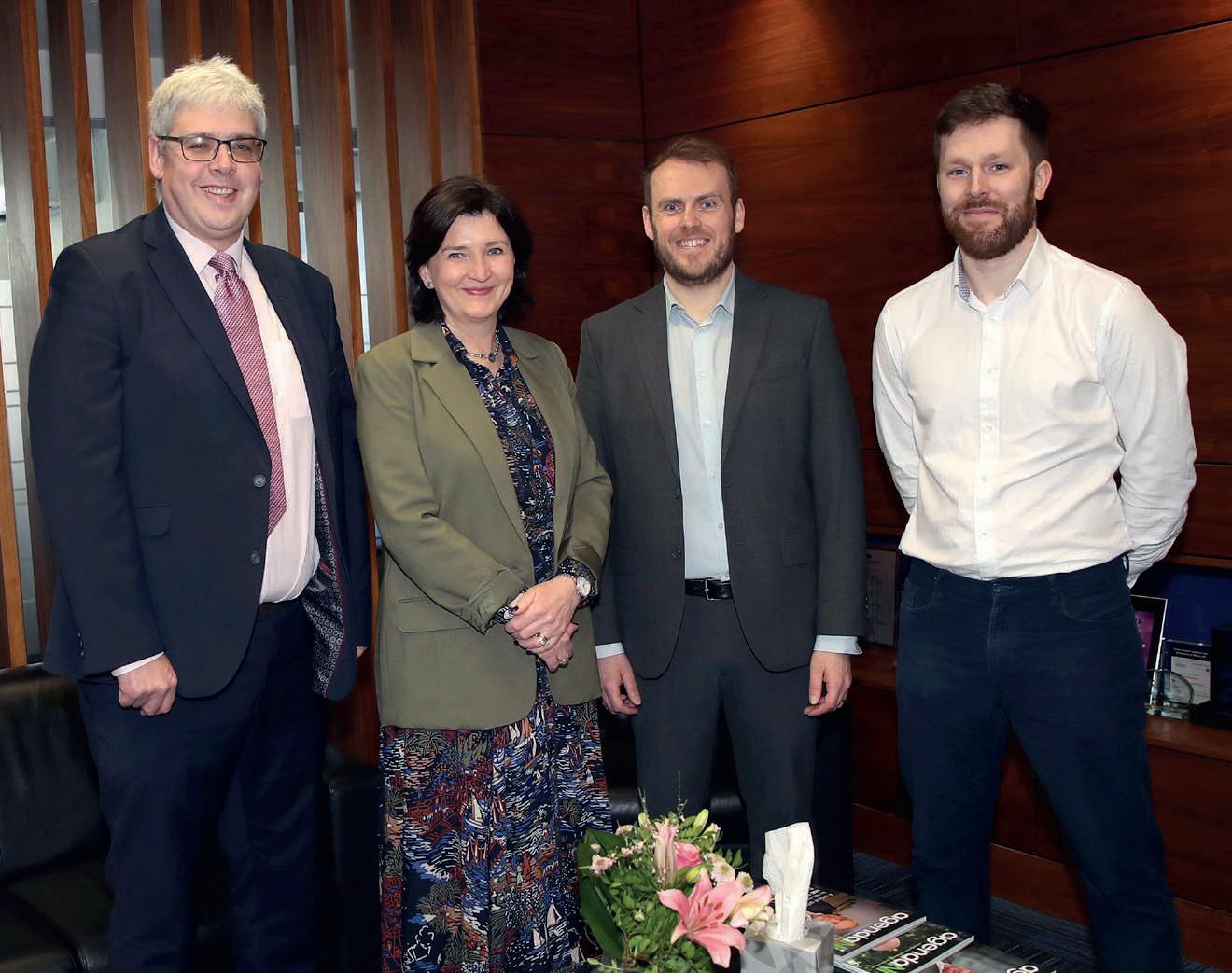
4. Kerry Hunter CEO of Inspire Wellbeing discussed employee health and wellbeing and how to build resilience and confidence in the workplace.
5. After hearing from the speakers, attendees participated in a structured networking session.
6. Delegates at the Future of Skills event.
7. Ian Getgood (Department for the Economy), Paula Leathem (NIE Networks), Phil Murray (NI Chamber) and Rob Tubman (A&L Goodbody).
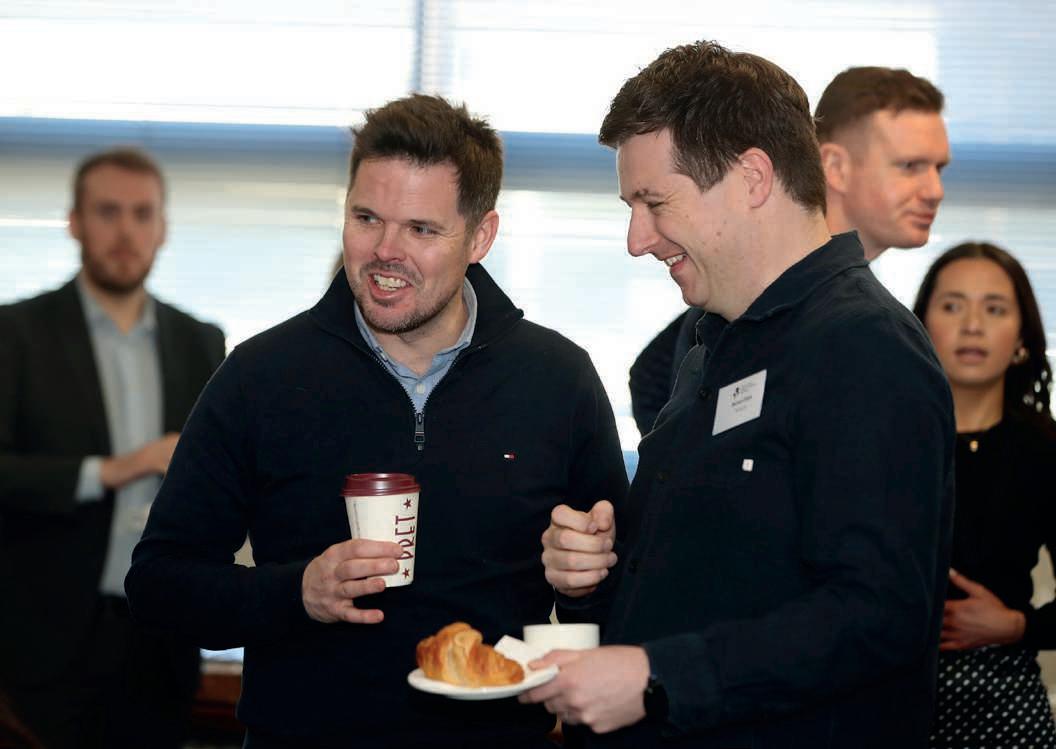
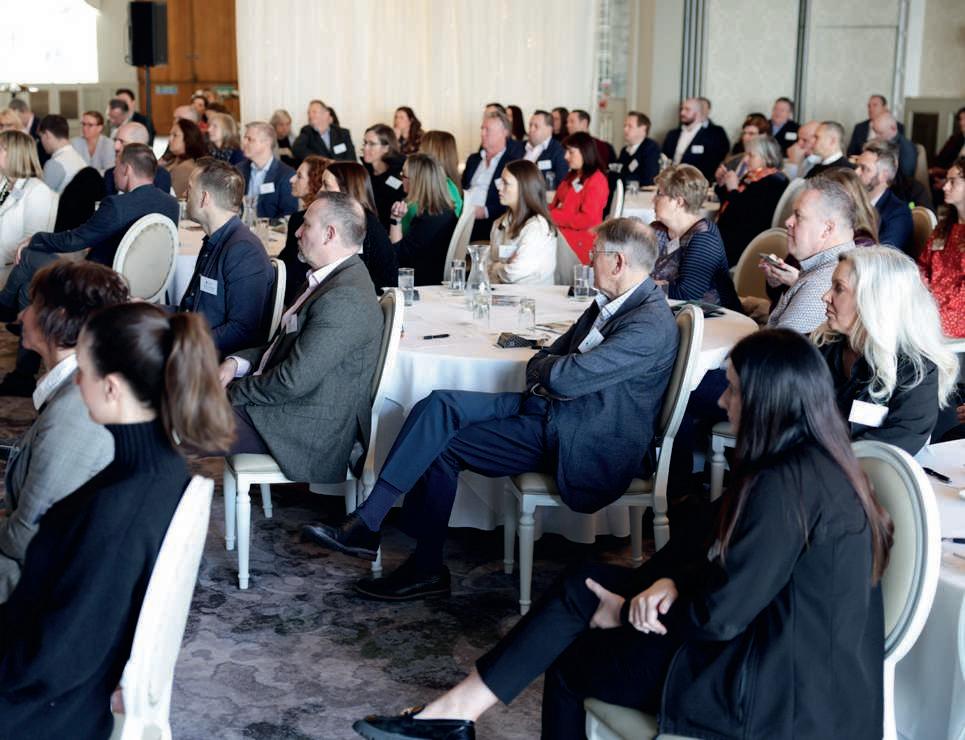

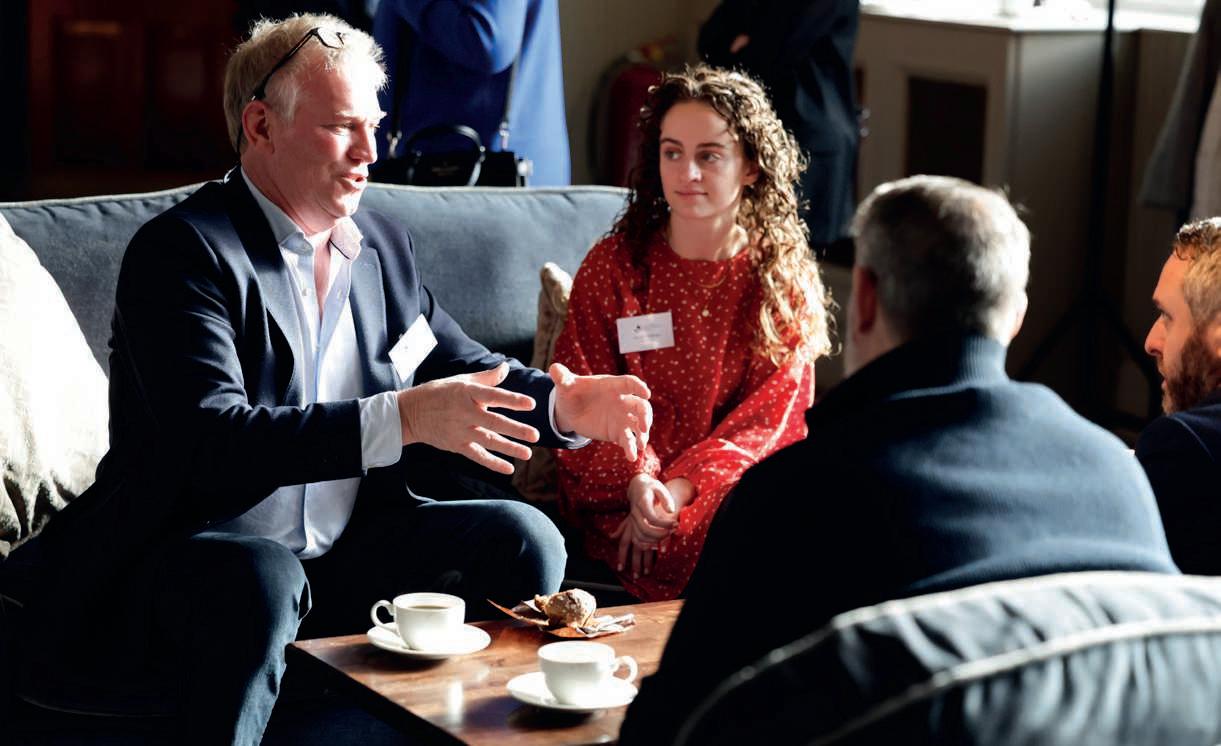
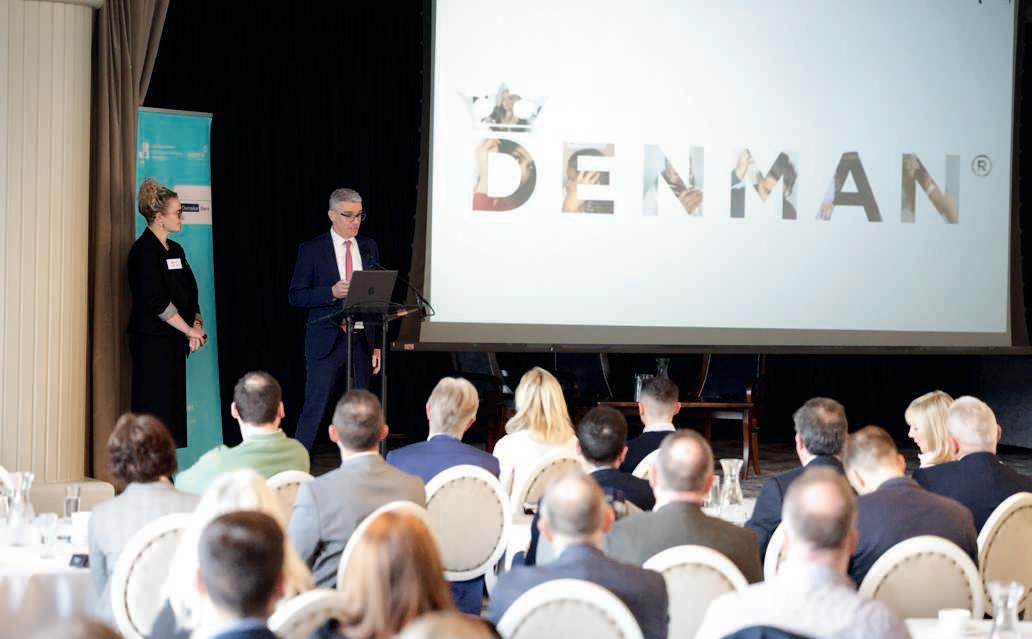
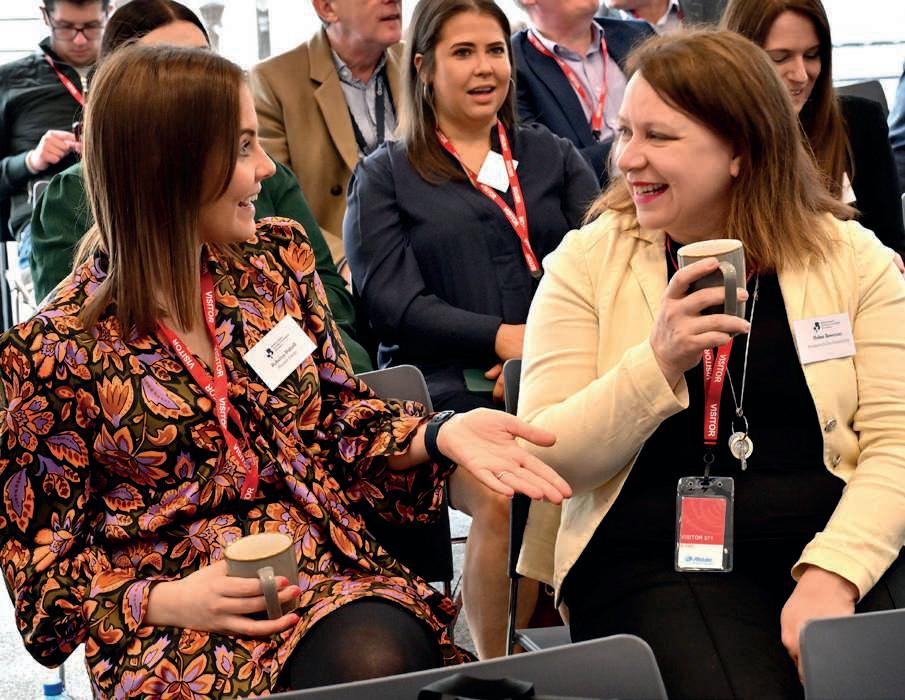
8. Guests had the opportunity to network before listening to the speakers discuss Migration Policy.
9. Patricia Greene (Caterpillar NI), Gayle Clinghan (Henderson Group), Kathy Simpson (Henderson Group), Margaret McNamee (Southern Regional College).
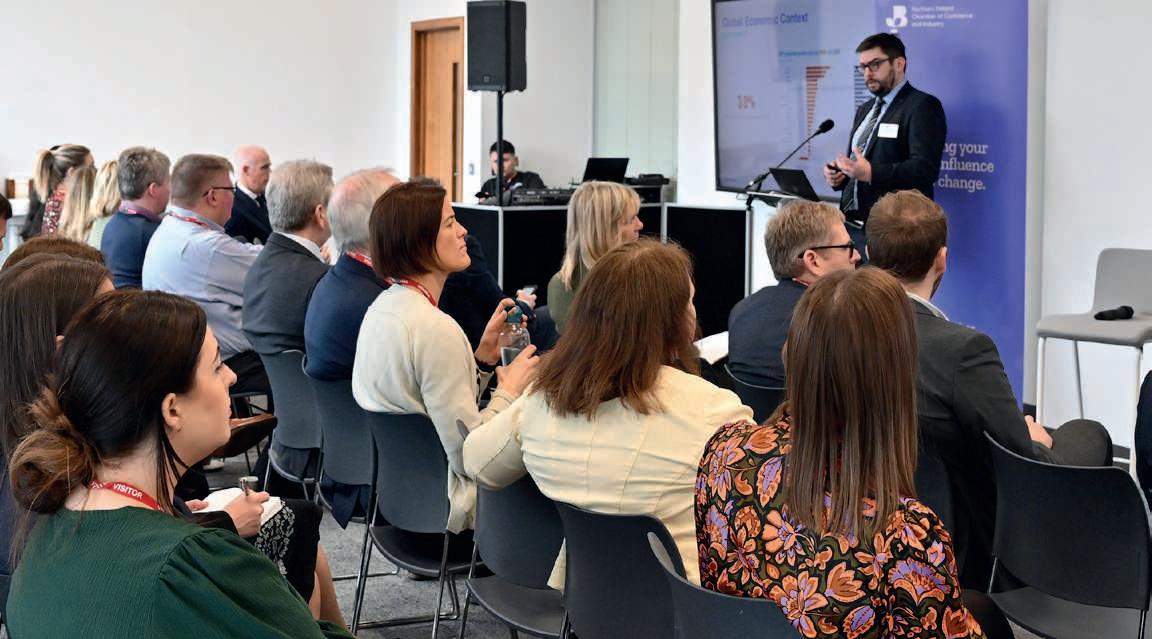

10. Guests enjoyed hearing Denroy’s growth story at the Grow with Danske Bank morning.
11. Attendees had plenty of opportunities to network at the Grow with Danske Bank event.
12. Kevin McNamee and Frances Courtney of Denroy Group shared insights to the growth of the company.
13. Andrew Webb (Grant Thornton), shared the impacts of the Chancellor’s Spring Budget to NI businesses at a Public Affairs Forum.
14. Rebecca Dalzell (Phoenix Energy) and Helen Bowman (Business in the Community).
15. Jonathan Martindale (Phoenix Energy) addresses the attendees at the Spring Budget Briefing.
NI Chamber has signed its first international memorandum of understanding (MOU) with its counterpart in the US state of North Carolina.
The MOU marks the start of a new relationship between NI Chamber and the NC Chamber, with both parties committing to work together to promote international trade, investment and co-operation. It includes pledges to leverage existing synergies between both economies, share research and learning and foster new relationships between businesses on both sides of the Atlantic.
The partnership, which was affirmed at a signing ceremony in the state capital city of Raleigh – right in the heart of the Research Triangle – has been welcomed by U.S. Special Envoy to Northern Ireland for Economic Affairs, Joe Kennedy III, along with a host of political and industry leaders.
Speaking about the partnership, NI Chamber President, Cathal Geoghegan said:
“Today marks the start of an exciting new relationship between businesses in Northern Ireland and North Carolina. It will give our most innovative and ambitious member companies on both sides of the Atlantic unique access to potential trading relationships, world-leading research, strategic business alliances and many other collaboration opportunities.
“North Carolina and Northern Ireland are an ideal fit because we both have a growing industry base in aerospace, health and life sciences, advanced manufacturing, tech and financial services. We are building this relationship from a solid platform, with many links already established by member companies like Almac, Collins Aerospace, EY, Teamworks, Queen’s University and others. This MOU formalises the relationship between Chambers of Commerce in both jurisdictions and highlights the scale of opportunity which exists. It is about deepening current relationships further and acting as a catalyst for the widest future collaboration to help businesses grow across and within each region.”
Gary J. Salamido, president and CEO of the NC Chamber, added:
“We see incredible alignment with Northern Ireland as we both offer a great place to live, work, and raise a family. As the top state for business in the US, it is important that we foster relationships that bolster our members’ ability to grow their businesses, invest in their people, and
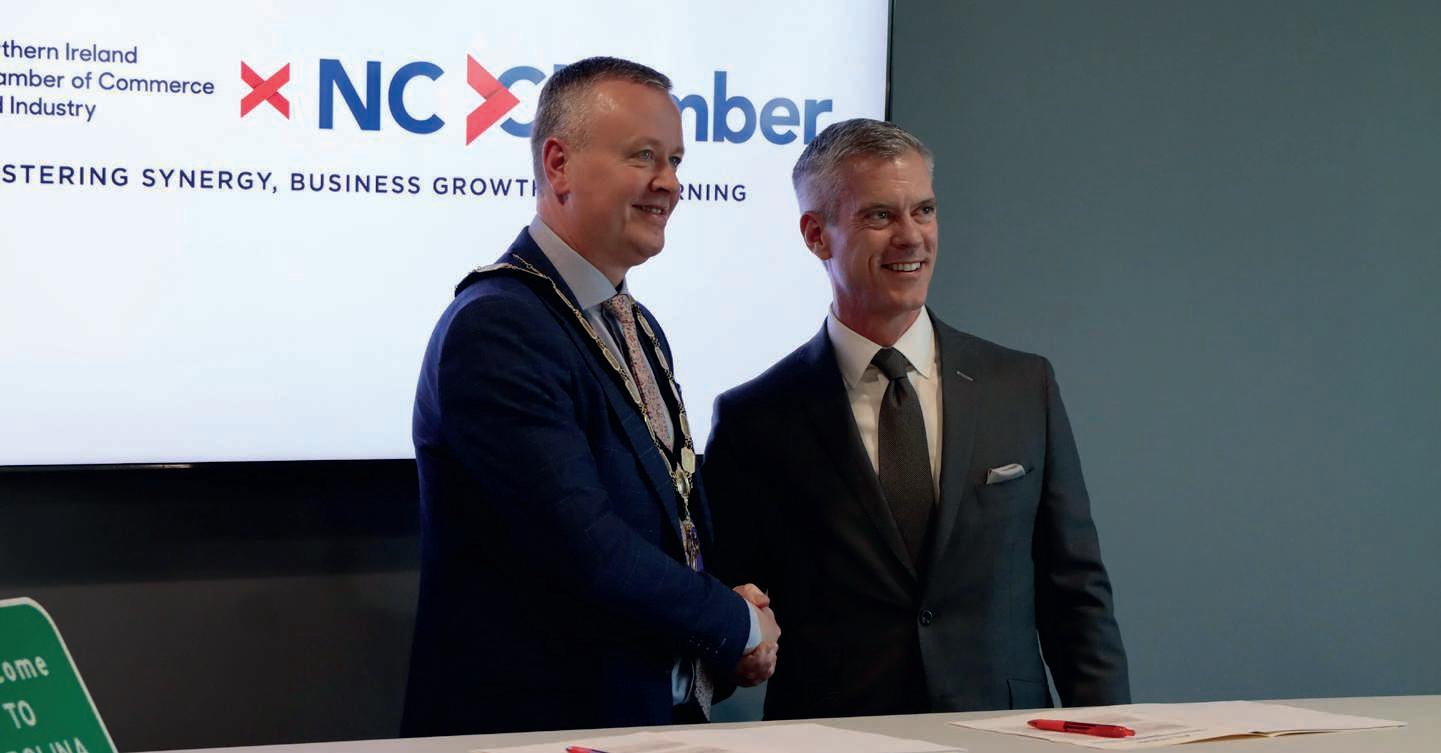
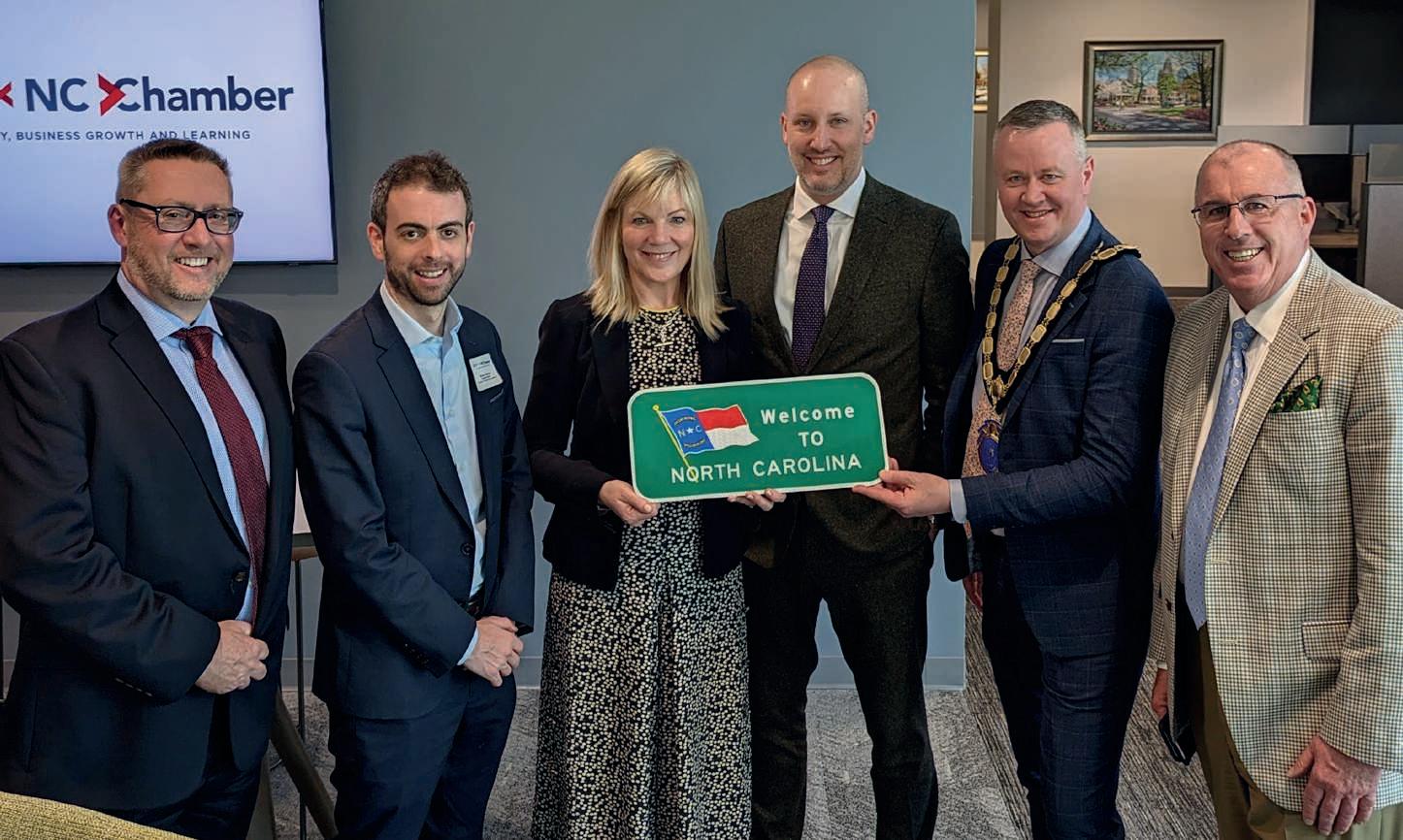
compete in today’s global marketplace. North Carolina is primed for continued investment and this MOU with our friends at Northern Ireland Chamber of Commerce and Industry will help each of us realize new opportunities for the diverse set of businesses in each of our memberships. We look forward to strengthening our relationship.”
U.S. Special Envoy to Northern Ireland for Economic Affairs, Joe Kennedy III has welcomed the new relationship between the two business-led organisations, saying: “This is exactly the type of initiative I want to see happening between our two jurisdictions.
“It is evident that Northern Ireland and North Carolina have many similarities across high- potential sectors, which can be boosted significantly by greater and deeper alliances such as this one. Indeed, I believe it should be viewed as a prototype, which has the potential to be rolled out in other parts of the United States.
“I look forward to seeing this MOU
between NI Chamber and North Carolina Chamber being implemented, with business-led visits in both directions set to bring forward many new learning and investment opportunities. As Special Envoy, I will do whatever I can to help unlock the significant potential that this innovative new partnership brings.”
The Secretary of State for Northern Ireland, Chris Heaton-Harris added:
“This exciting new partnership demonstrates the appeal of Northern Ireland’s strength sectors and welcoming business environment to investors in the United States.
“It will unlock opportunities for businesses on both sides of the Atlantic and builds on the fantastic success of last year’s Northern Ireland Investment Summit, which saw more than 200 of the world’s leading CEOs visit Belfast for a showcase of NI’s fantastic offer as one of the best places in the world to do business.”
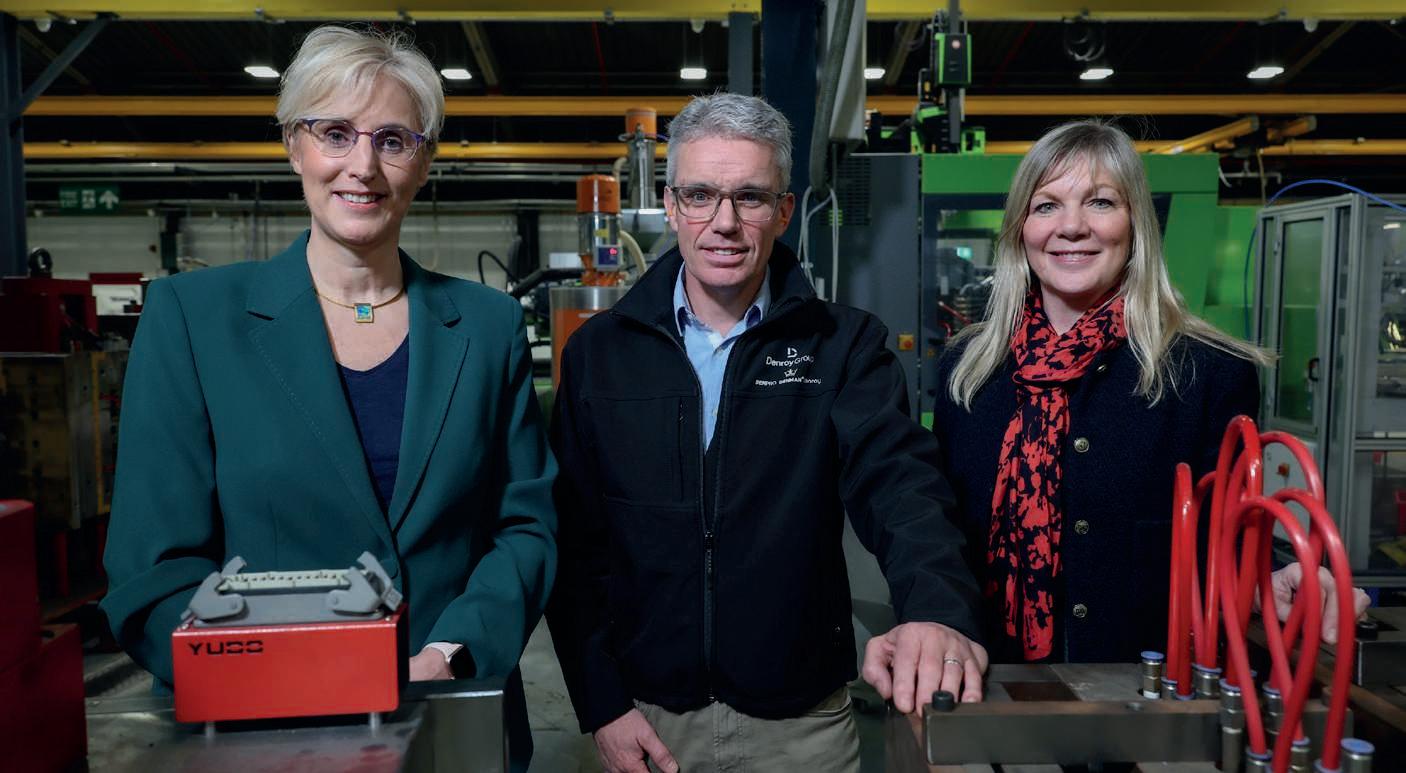
NI Chamber and Danske Bank have launched their latest series, designed to help businesses achieve their growth ambitions by learning from the success of others.
At the first event, guests heard exclusive insights into Denroy Group’s growth story so far from CEO Kevin McNamee and
Marketing Manager Frances Courtney.
Speaking about the 2024 series, Suzanne Wylie, chief executive, NI Chamber said:
“Helping our member businesses to grow locally and internationally is central to NI Chamber’s mission, so this series – which is all about business growth – directly
supports our over-arching objective. We are delighted that Danske Bank is set to support it again this year and look forward to delivering another really impactful and beneficial series of events, starting with this fascinating story of ambition and innovation.”
Julie Skelly, head of Belfast Business Centre, Danske Bank, added:
“In what is our 200th year of helping people and businesses achieve their ambitions, we are delighted to continue to partner with the Northern Ireland Chamber to deliver the Grow with Danske Bank event series. Connecting and learning from the success of other businesses is an important part of any business growth strategy so it’s great to kick off the 2024 programme with the Denroy Group, a fantastic local and international success story.”
Grow with Danske Bank is part of the Learn Grow Excel programme, which is supported by NI Chamber’s SME partner, Power NI.
NI Chamber and Bank of Ireland have launched their 2024 Business Breakfast series, which started with an event for HR professionals in February.
Now in its third year, the series provides learning and networking opportunities for ambitious professionals working in core business areas, which over the coming months are set to include HR, marketing, innovation and finance.
Speaking ahead of the first event of the year, Suzanne Wylie, chief executive, NI Chamber said:
“The Business Breakfast series is quite a unique part of NI Chamber’s events calendar, providing specific opportunities for people working in core functions which are key to business success. As a platform for peer learning and making new connections with others working in similar roles, it has been incredibly well received to date. We are delighted to be partnering with Bank of Ireland for the third series and thank them for their continued support of NI Chamber and our members.”
Paul McClurg, head of Belfast Business Banking, Bank of Ireland UK, added: “Bank of Ireland are delighted to partner with NI Chamber to continue the popular Business Breakfast series which offers access to expertise and the opportunity for

those attending to make wider business connections.
“At Bank of Ireland UK, we recognise the vital contribution of the business community in growing our local economy and providing employment. This series of events provides learning, advice and support from industry peers, who are at the forefront of the latest developments and challenges in a variety of business disciplines, in an environment where
businesses can connect with each other and create new opportunities.”
The second event in the series is planned for May and will be for marketing and communications professionals.
The Business Breakfast series, in partnership with Bank of Ireland, is delivered as part of NI Chamber’s Learn Grow Excel Programme, which is supported by its SME partner, Power NI.
NI Chamber has launched a new series of Regional Networking events, delivered in partnership with NIE Networks. The season kicked-off in the National Football Stadium at Windsor Park. Over the course of the year, the popular series will travel to venues across Northern Ireland, bringing people working in all sectors across the province together to make valuable new business connections.
Speaking at the launch of the 2024 series, Suzanne Wylie, chief executive, NI Chamber said:
“Networking events are among the most popular member services we provide, so we are delighted to be partnering with NIE Networks on the Regional Networking series again this year. We know how much businesses value the peer learning, new perspectives and potential opportunities to do business that this particular series delivers and – based on the previous experience of others – coming along is a really worthwhile investment of time. We anticipate that more than 500 people

will attend the 2024 series and encourage anyone who is interested in growing their network of business connections to join us for at least one of the sessions.”
Ian Hunter, commercial manager at NIE Networks, added:
“The Regional Networking series with NI Chamber is one of our most successful business partnerships so at NIE Networks,
Commenting on the Chancellor’s Spring Budget Statement, Suzanne Wylie said:
“In the last budget before the next general election, despite fiscal pressures, we had hoped to see more significant pledges which would tangibly support business and stimulate sustainable economic growth. That is always best achieved through a partnership approach, which prioritises ambitious policymaking to appropriately match the scale of business ambition.
“Our member businesses are resilient: many are performing well and a majority entered 2024 with a positive outlook. However, they still face a challenging environment when it comes to costs and access to labour and this budget does not sufficiently tackle these issues head on.
“We welcome announcements to support global trade in Northern Ireland. Investment in specific manufacturing projects will benefit our growing life-sciences sector. Cuts to national insurance, which will help individual employees are also welcome, as is increasing the threshold for child benefit. Overall, this statement was a missed opportunity to counter regional imbalances, provide the confidence needed to attract green investment and reduce barriers to attracting talent from around the globe.
“As always, it will take time to work through the detail and what it means for Northern Ireland as a region. What is clear is that – despite an additional £100m in Barnett consequentials – the Northern Ireland Executive will face significant challenges when it comes to dealing with its own funding shortfalls for running public services here.
“NI Chamber is already working with local ministers, bringing forward evidence and ideas to help unlock economic growth and ensure that growing a sustainable economy is an absolute priority.”
we are very pleased to support the initiative again in 2024. Coming along is a fantastic way to meet new people, increase your own visibility and open-up potential business relationships, so we hope as many people as possible will make the most of the opportunity.”
Speaking after the Economy Minister delivered his Economic Vision to the Northern Ireland Assembly, Suzanne Wylie said:
“We welcome the fact that the Economy Minister has set out his priorities for the economy so early after the restoration of the NI Executive.
“NI Chamber’s focus is on competitiveness, people and skills and a sustainable economy. Our economy does need to be more productive and we need to develop better jobs and effective childcare support. We also need to grasp the opportunity presented by dual-market access, prioritise a green economy, supercharge our approach to decarbonisation and develop focused growth in key business clusters across NI.
“Economic prosperity needs to be owned by the Executive as whole, and by business and other stakeholders. The key to success will be partnership across the Executive as well as co-design and delivery with business on solutions.
“It is also vital that as a region, we continue to attract inward investment by articulating and sharing our distinct advantages. We look forward to meeting with the Minister and finding out more about his proposals around inward investment and regional balance, as well as how he intends to work with business to achieve the best outcomes.
“What matters now is that we develop and deliver at pace on the proposition of the region as a place to work, do business, visit and invest, so that we can compete on the island of Ireland, as a region of the UK and on the global stage.”
U.S. Special Envoy to Northern Ireland for Economic Affairs, Joe Kennedy III addressed a group of NI Chamber members in Belfast at the beginning of February, encouraging them to adopt a “healthy dose of American confidence” as they seek out opportunities to trade internationally.
He had high praise for the impact that Northern Ireland has had on the world already and stressed the mutual value of the “indelible connections” between Northern Ireland and the USA.
In front of an audience of more than 150 businesspeople, who were gathered in the Harbour Commissioner’s Office, he heard directly from a cross-sector representation of members including Caterpillar, A&L Goodbody LLP, Eakin Healthcare, BT Group and Belfast Harbour.
A Morning with Joe Kennedy was sponsored by BT.


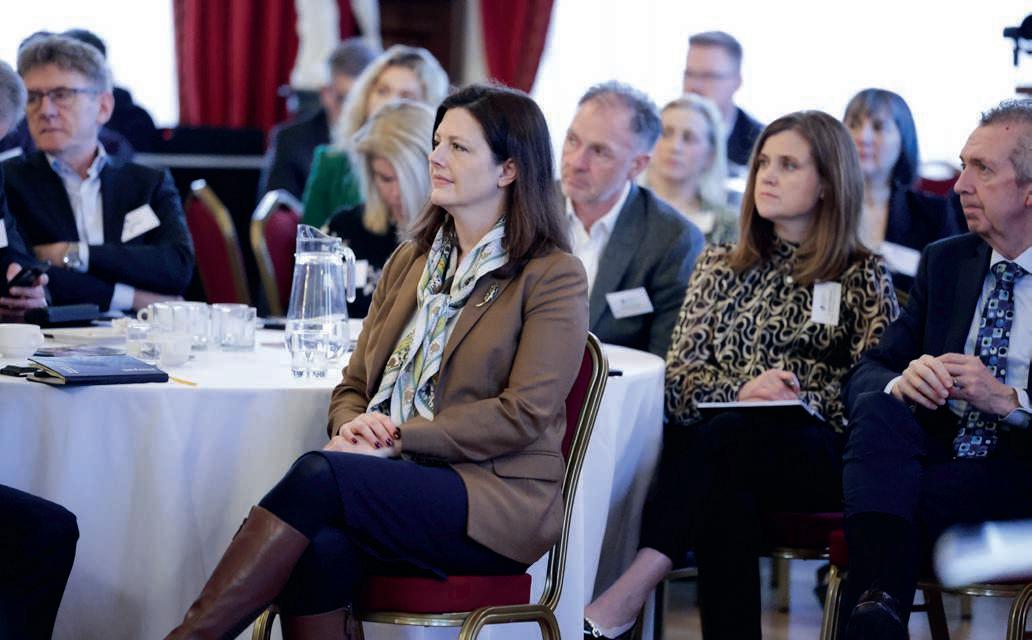
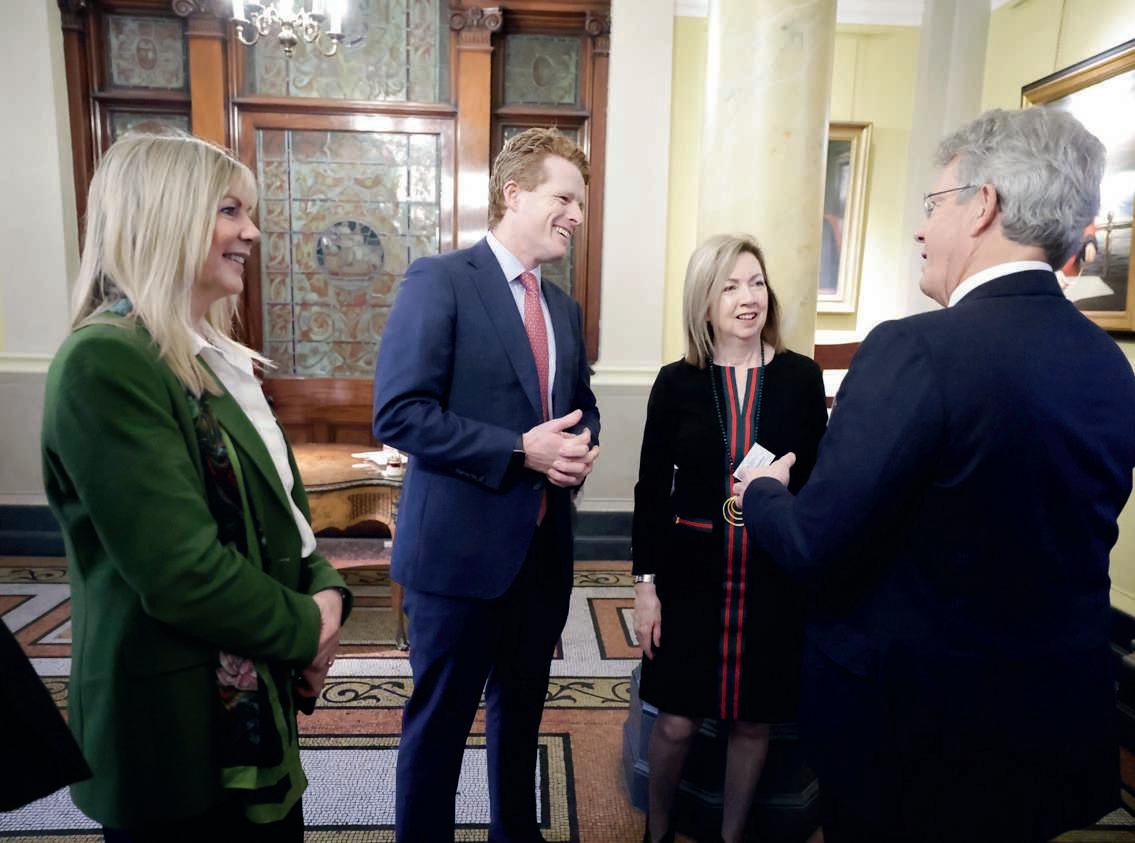
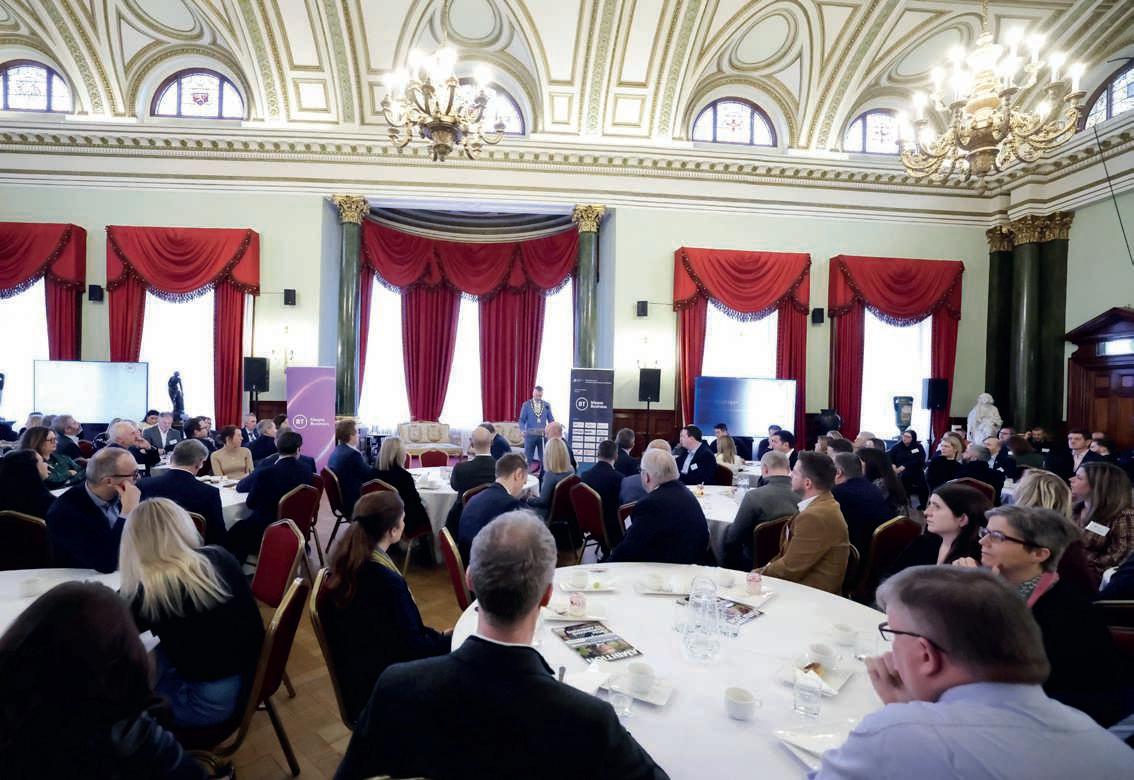
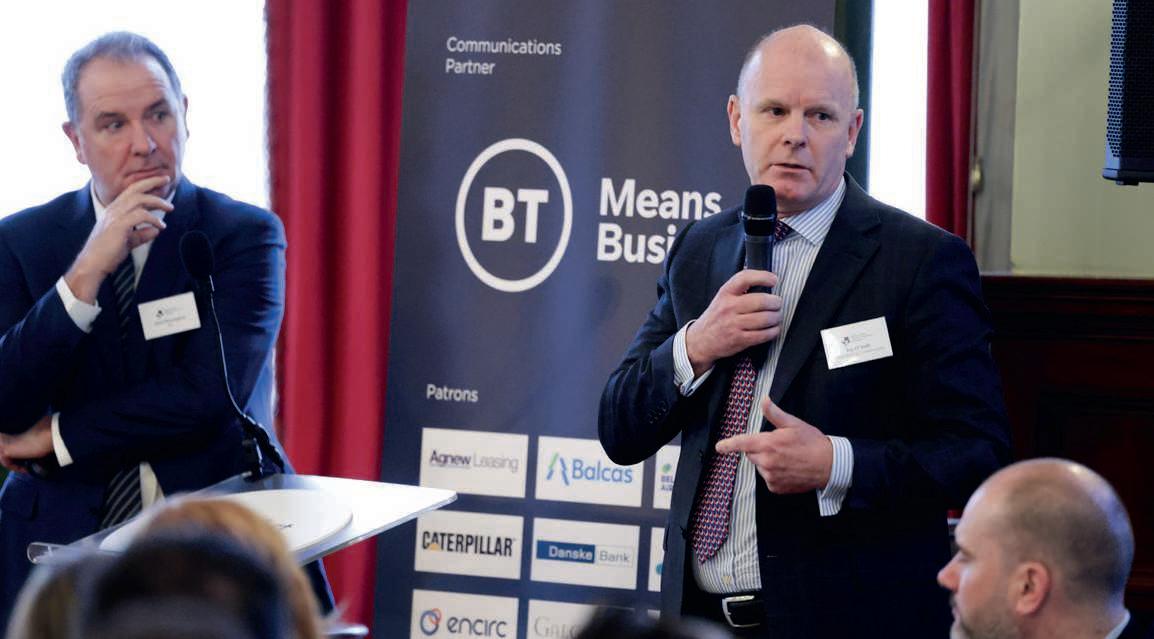

 Columnist
Phil Murray People and Skills Lead, NI Chamber
Columnist
Phil Murray People and Skills Lead, NI Chamber
On 19 February, the Economy Minister outlined his Economic Vision for Northern Ireland, swiftly after the formation of the Executive, where he prioritised ‘Good Jobs’, recognising that the foundation of a thriving economy rests upon a skilled and adaptable workforce. As we navigate the ever-evolving economy of Northern Ireland, one thing remains abundantly clear: our greatest asset lies in our people and their skills. Yet, despite this, businesses across the region are facing acute challenges in accessing the right talent and expertise to drive growth and innovation.
Our latest quarterly economic survey (QES) illustrated that recruitment difficulties within manufacturing and services businesses remains high, with 7 in 10 NI Chamber members currently trying to recruit. With this challenging labour market, 70% of these businesses indicated that their priority this year is to provide competitive remuneration packages to retain and attract talent, further increasing costs. Fifty per cent of NI Chamber members have outlined that developing a culture of lifelong learning is their priority for skills and training development for their staff. This reflects the urgency to upskill and retrain staff to remain competitive, when historically Northern Ireland has typically had a low participation rate in adult education. These challenges threaten not only individual enterprises but also the broader economic prosperity of our region.
Central to this endeavour is the need for meaningful funding to
ensure that our companies remain competitive not just regionally, but on a European and global scale. The Minister outlined the need to “create more better paid apprenticeships and skills academies”, which NI Chamber members would welcome: when asked in our latest QES, 35% would like to develop apprenticeships but only 8% of businesses in Northern Ireland currently hire apprentices – a gap that needs bridging. It is estimated that local businesses contribute around £80 million annually into the apprenticeship levy, however, there is no direct correlation between the funds contributed by NI employers and the funding received back through the Block Grant. This is simply not an equitable arrangement. Long-term funding is imperative to make apprenticeships accessible for SMEs, develop the skills of our workforce and elevate job opportunities, closing the persistent skills gap that hampers the competitiveness of our members – and crucially, to provide economic gain with more good jobs.
Attracting investment for economic growth of Northern Ireland demands an effective and skilled labour supply for businesses to build and grow here. This requires more joined-up thinking on how we can attract and retain talented individuals, particularly considering the recent migration policy update from UK government, which further hinders NI businesses in accessing talent. Simultaneously, addressing the over 315,000 people currently economically inactive is paramount: a fully funded childcare and early years strategy, increased participation of people with
disabilities, and accessible training and educational programmes for young people are required to address this. Unlocking the economically inactive is an important piece of the puzzle –that may not be the sole solution, but it is undeniably a vital component in unleashing the full potential of our workforce.
As we chart a course forward, it’s imperative that we deepen engagement with industry to understand and address the needs of businesses. The pace of change in our economy demands nothing less. By fostering closer collaboration between government and businesses, we can ensure that the economic vision outlined by the Minister is responsive to the dynamic nature of our industries, development of high growth sectors and the evolving demands of the global marketplace.
The challenges facing Northern Ireland’s businesses in accessing people and appropriate skills are formidable but not insurmountable. By prioritising people and skills, committing to employer-led solutions, and ensuring adequate funding, we can unlock the full potential of our workforce and drive sustained economic prosperity.
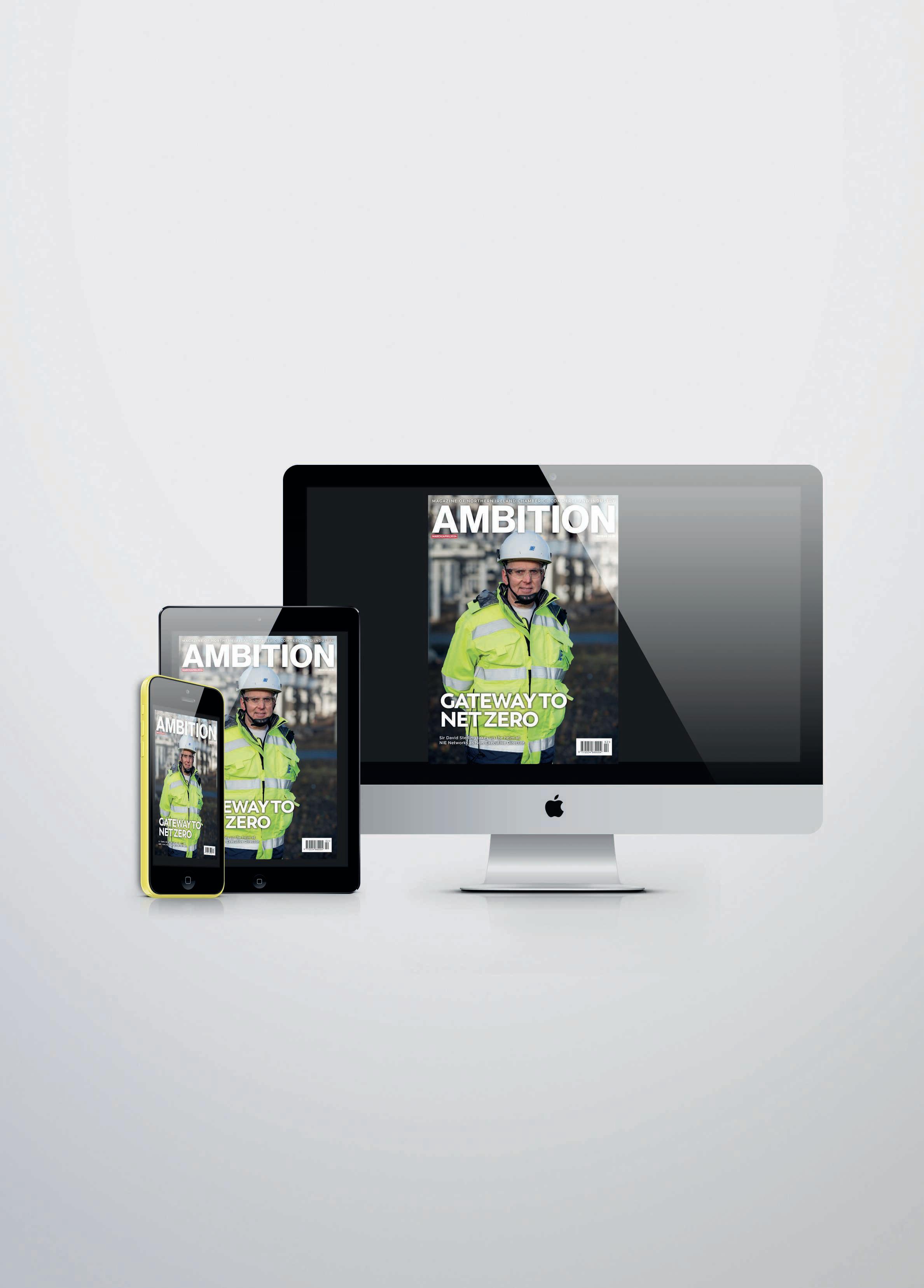

When was the last time you played? Perhaps you played tag on the beach with your children, or after-work football, or maybe even you played a life-sized game of Jenga at a company awayday in the summer. What do you recall about the experience? How did you feel afterwards?
Play can mean different things to different people. Some like to be more physically active, others might prefer a more sedentary board game, but play is a fundamental aspect of human development that significantly contributes to promoting health and wellbeing across our lifespan. From the earliest stages of childhood to adulthood, engaging in play activities has far-reaching benefits for physical, mental, and emotional aspects of our life. According to the Mayo Clinic, play supports cognitive development, fostering creativity, and problem-solving skills.
For children, play is a primary means of learning about social dynamics, communication, and emotional expression. It moulds the neural circuits associated with social engagement, helping children navigate social environments and build resilience. For adults, play continues to be essential. Whether it is recreational sports, playing in a band or another creative endeavour, engaging in play encourages feelings of safety and social connection. In a society where stressors are prevalent, incorporating play into daily life becomes a valuable tool for maintaining emotional wellbeing and balance.
Often play includes movement, whether running, jumping, dancing, climbing, or engaging in sports. This physical activity is essential for maintaining cardiovascular health, brain function, mobility, and a host of health benefits that are increasingly
being identified in new research. We could receive these positive health effects if we were exercising or moving alone: however, there is an added benefit when playing— we engage with other people. Social engagement during play promotes the neurochemicals of biological safety and thus nervous system regulation.
If you can recall the last time you engaged in an active playful activity, you might remember feelings of joy, laughter, or enlivenment during the playing and you may have felt good afterwards. This is because in play we stimulate the cranial nerves that tell us we are not in danger. Our social engagement nervous system is activated. This includes the vagus nerve, which you may be familiar with, the nerve that governs our breath, digestion, and breathing. More specifically it involves the ventral vagal complex which includes the nerves that make us smile, laugh, swallow, move our faces, and listen. The stimulation of these social engagement nerves fosters positive social interactions and supports emotional regulation. This can contribute to overall wellbeing and resilience by helping individuals navigate stress and build social bonds.
Furthermore, play serves as a powerful mechanism for stress regulation. Stressful experiences can trigger the activation of the sympathetic nervous system, leading to fight, flight, or immobilised responses. Acting from defensive states when stressed might be familiar but responding to a situation from anger, irritation, distrust, or shame is not always the most appropriate. However, engaging in play can build nervous system regulation to foster more choice in how we respond to any given situation. It provides a regulated and safe context for experiencing stressors in a controlled environment. This allows
the nervous system to learn adaptive responses, reducing the likelihood of overactive stress responses in future situations.
It is apparent that play is crucial for mental health balance. Not only does play serve as a stress-relief mechanism – by providing an outlet for releasing tension and pent-up energy, reducing cortisol levels, and promoting relaxation – but it also enhances cognitive abilities. When we engage in play, we often enter a state of flow, where we are fully immersed in the activity, leading to increased concentration and focus. Whether a game of catch, a dance session, or a leisurely walk in the park, these playful activities have the power to contribute to overall mental wellbeing.
In wellbeing settings, the application of play can be used therapeutically. Playbased interventions can help individuals, including those who have experienced trauma, regulate their autonomic nervous system responses. By gradually exposing individuals to safe and enjoyable play activities, therapists can work to reshape defensive response patterns promoting a sense of safety and connection. This can be applied to everyday situations.
Play can be viewed as a fundamental aspect of the human experience with farreaching implications for neurophysiology and emotional wellbeing. By activating the neural vagal complex, play fosters feelings of safety, supports social engagement, and contributes to stress regulation. When you think about it, play is one of the easiest and most pleasant ways to support our physical and mental health, contributing to a balanced and healthier lifestyle across our lifespan. What a great excuse to schedule a fun afternoon into your calendar!
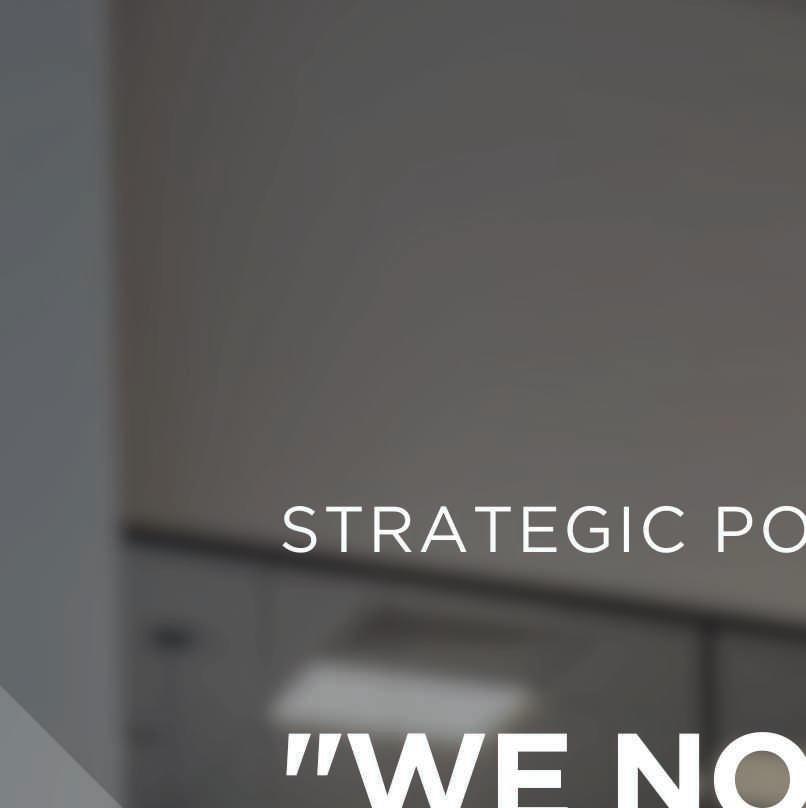
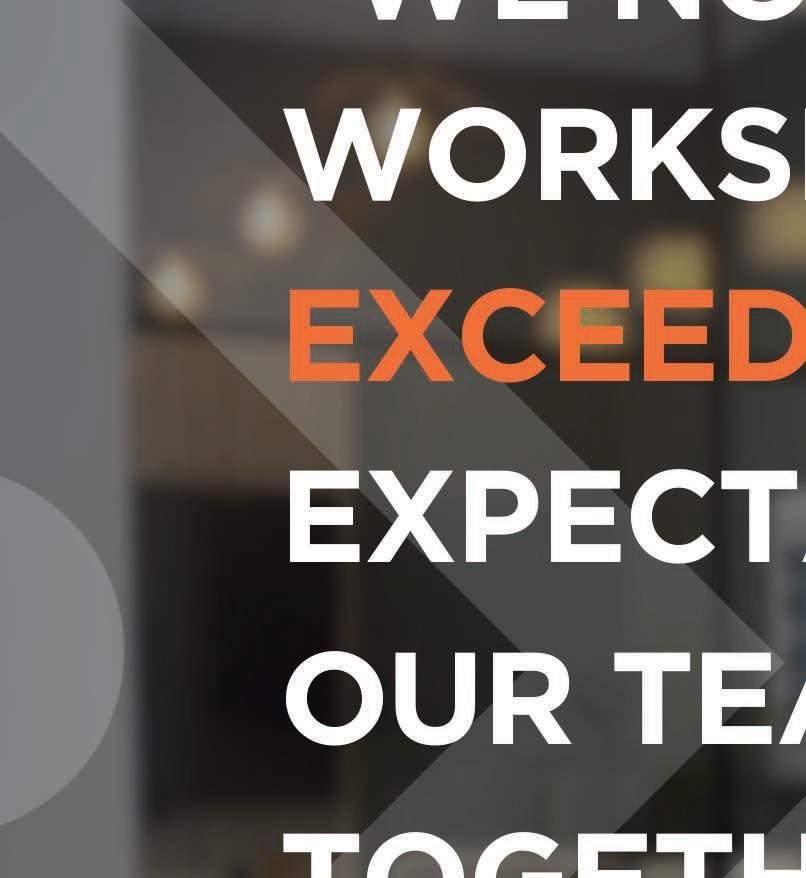


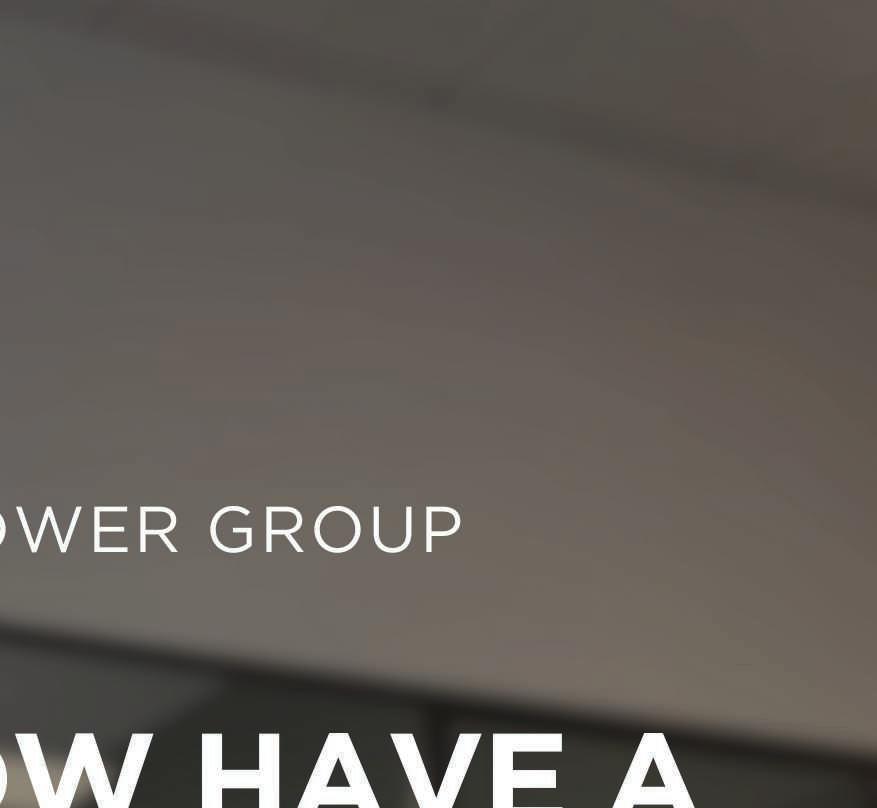

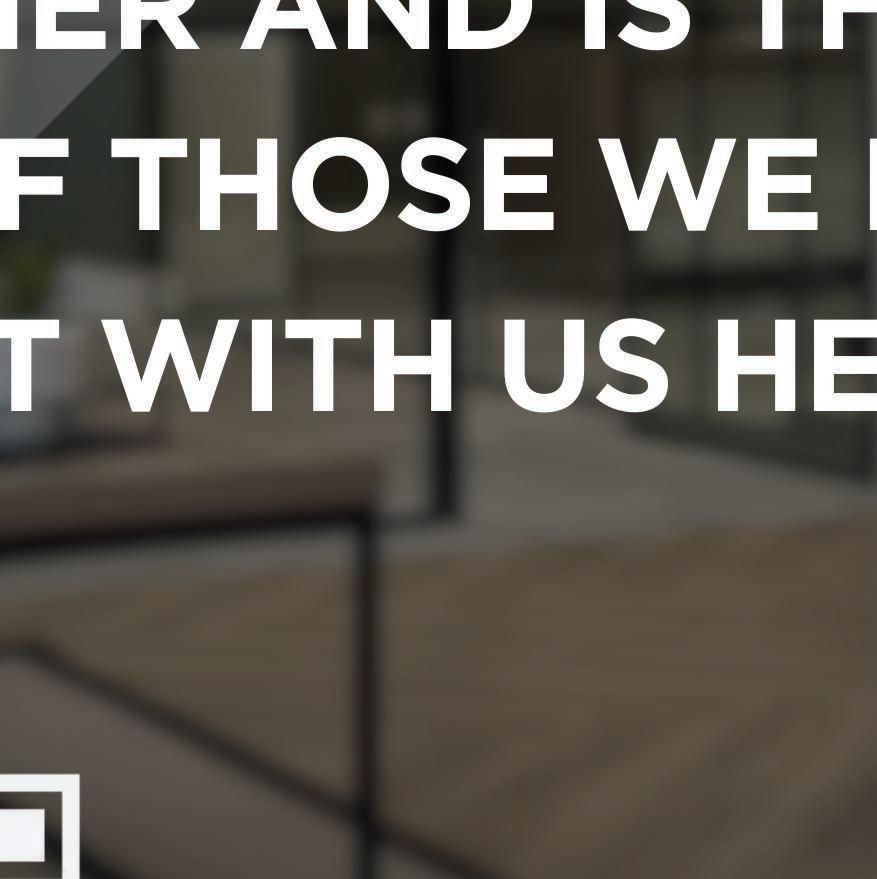


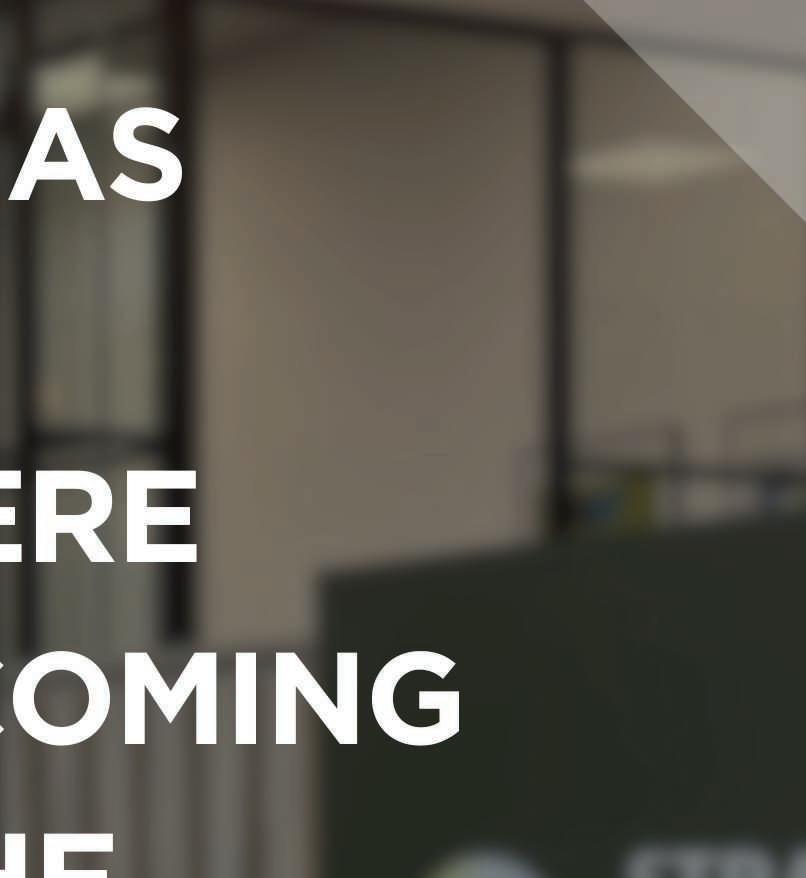
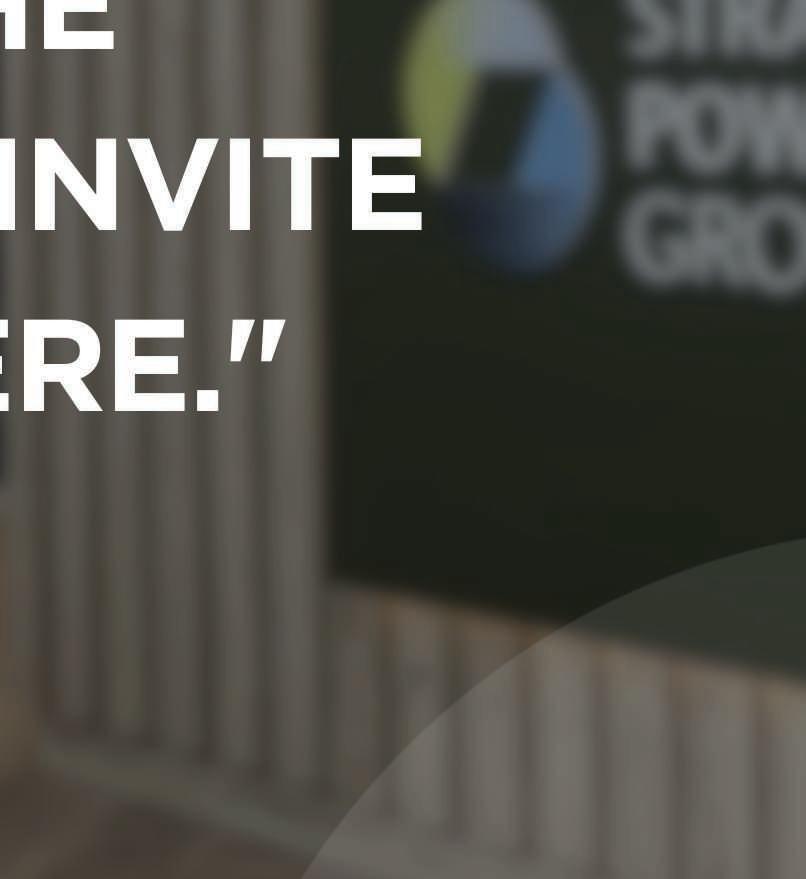


The crucial role of reliable software supply chain management.
In the dynamic landscape of the digital economy, where innovation propels businesses forward, the importance of secure and trustworthy software development cannot be overstated.
As we navigate the intricate web of technologies and applications, the need for a reliable, cloud-native software supply chain management solution has become a fundamental component of the landscape.
Recognising the vital role software developers and organisations play in driving technological advancements, this is where Cloudsmith – proudly headquartered in Belfast – steps in, offering a unique platform that places security and trust at its core.
Our global, cloud-native artifact management platform provides a modern replacement to the existing clunky offering of legacy solutions, creating a seamless experience for developers to deliver efficiently and securely. Used by leading software companies like Shopify, PagerDuty and Font Awesome, the platform ensures software is at all times secure and guarded against threats.
As the chief executive of Cloudsmith, I am excited to share our commitment to the vibrant digital economy of Northern Ireland and the global impact we strive to achieve.
Belfast, a leading tech city with a thriving digital economy, serves as the ideal home for Cloudsmith. Our roots in this dynamic city run deep and we are proud to contribute to its growth and success.
In late 2023, Cloudsmith secured a renewed round of investment, totalling $11 million. This significant infusion of capital reinforces our commitment to Belfast and empowers us to expand our capabilities further. As we continue to invest in cutting-edge technology and talent, we are doubling down on our dedication to the city which has played a crucial role in our journey.
Our reach extends far beyond Northern Ireland, with an innate ability to service blue-chip organisations in every corner of the world. Our global presence positions us as a key player in the international software development landscape. Cloudsmith is a great choice for companies with software teams distributed across remote locations and, while the US is our largest market, we continue to see increased demand from a range of countries, including the UK, Germany and Australia.
Security lies at the heart of Cloudsmith’s platform. In an era where data breaches and cyber threats are rampant, the need for robust security measures in software development cannot be overstated. Providing a secure environment for artifact storage, protecting valuable intellectual property and sensitive data, we implement industry-leading encryption and access controls, guaranteeing that only authorised personnel can access and modify crucial components of the software supply chain.
As cyber threats continue to evolve, Cloudsmith remains vigilant, staying ahead of the curve to provide our clients with state-of-the-art security features.
Reliability is another pillar on which Cloudsmith stands tall. We understand the importance of consistent and
dependable software delivery. Downtime is not an option for businesses that strive to stay competitive in today’s fast-paced environment. Our cloudnative platform is engineered to ensure maximum uptime, allowing our clients to focus on innovation without disruptions to their workflow.
Efficiency is the third cornerstone of Cloudsmith’s commitment. We recognise the time sensitivity of software development projects and the need for a streamlined supply chain. Our platform is designed to optimise the entire process, from artifact creation to distribution, reducing time-to-market for our clients. We’re empowering software developers to unleash their creativity without compromising on efficiency.
Cloudsmith stands at the forefront of the digital revolution. By offering a cloud-native software supply chain management solution that prioritises security, trust, reliability and efficiency, we’re building a future where secure and trustworthy software development propels businesses to new heights, driving innovation and economic growth for Northern Ireland and beyond.



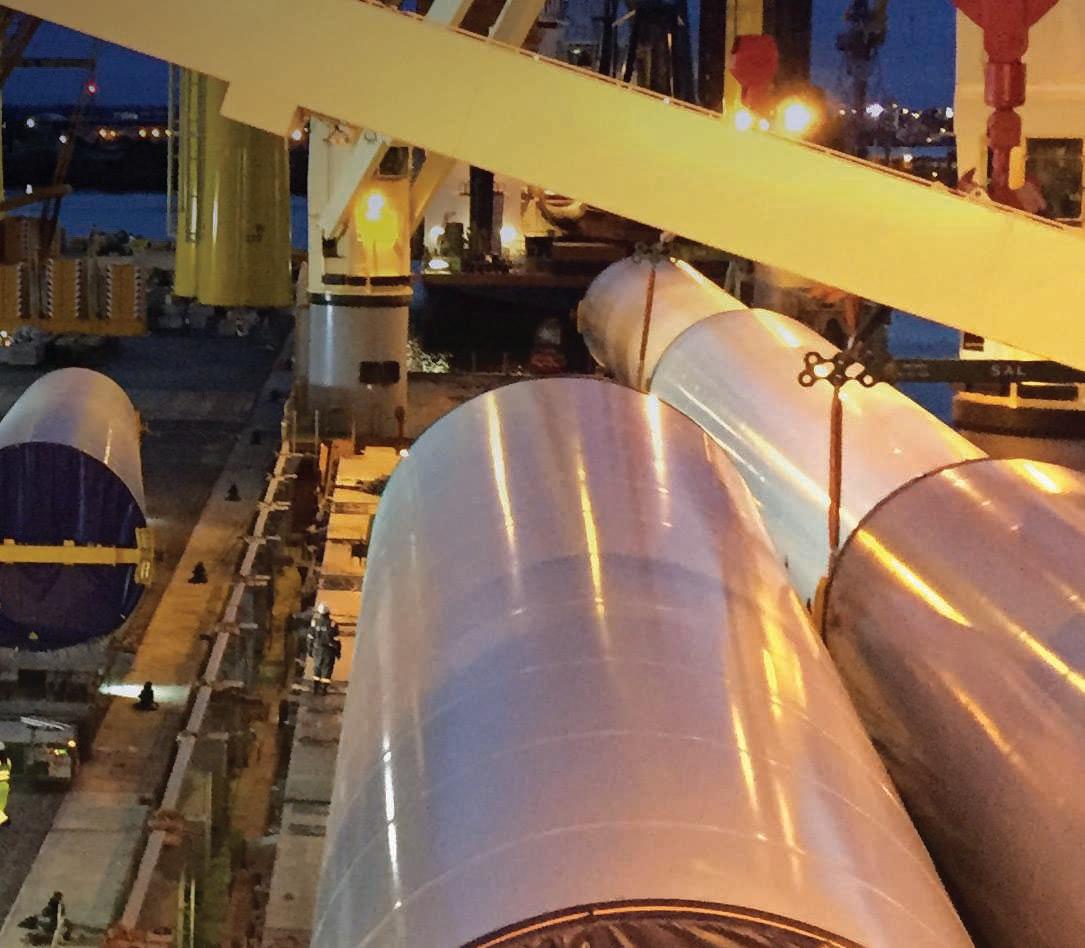





Since 2015, GLL’s alliance with Belfast City Council has exceeded expectations, profoundly impacting society. Emma Deighan discusses these notable social transformations and shared aspirations with Gareth Kirk, GLL’s senior regional director.


GLL’s entrance into the NI market was marked by a commitment to transform leisure experiences for the city’s residents. It was a partnership that attracted some resistance to what was seen, by some, as the privatisation of council gyms, but the decision to move forward with the social enterprise has paid dividends and the facts prove it.
The strategic partnership between GLL and Belfast City Council, initially driven by the council’s quest for a social enterprise ally proved to be the catalyst for significant social outcomes coupled with a robust entrepreneurial business focus.
Gareth Kirk, senior regional director at GLL, says: “This collaboration started with the council seeking a social enterprise partner, and we fitted the bill perfectly. We not only bring significant social outcomes but also maintain a strong commercial focus while creating great culture within our teams.”
GLL has a strong UK-wide presence delivering cultural services and celebrated its 30th Birthday in 2023. Today it’s the largest UK-based charitable social enterprise delivering leisure, health and community services. Under the consumer-facing brand ‘Better’, it operates 240 public sports and leisure facilities, 120 libraries, 10 children’s centres and five adventure playgrounds in partnership with 50 councils, public agencies and sporting organisations.
More locally, Better delivers its leisure facilities only in the Belfast area under what was an initial £105m investment as part of a Leisure Transformation Programme (LTP). Gareth says that funding, while rare, was a game-changer for Belfast.
“One of the key drivers for us with that investment was to create movement across the city, encouraging residents to explore different areas. This deliberate design has seen a significant shift in membership,
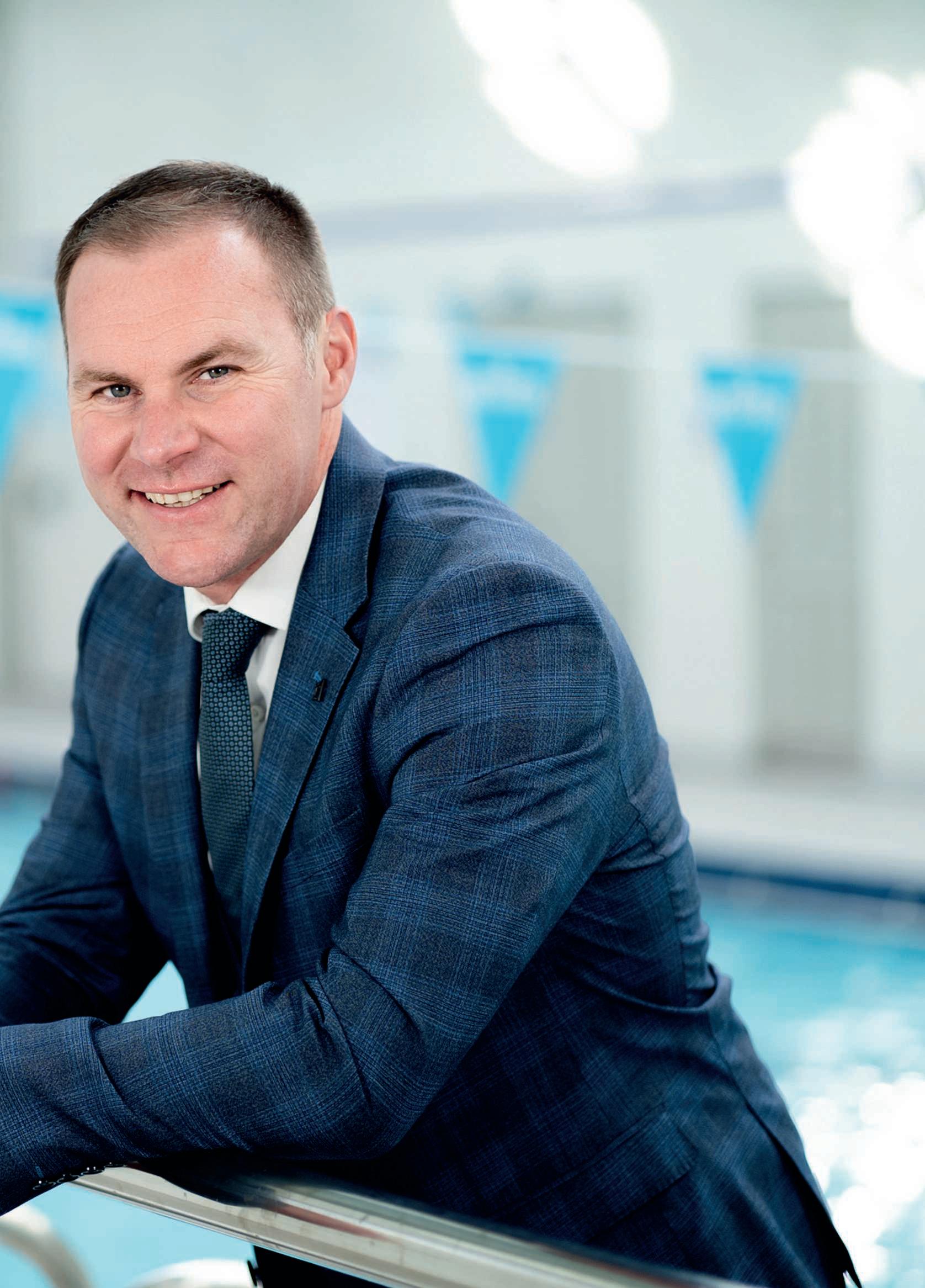
with people seeking specific activities at different centres.”
Today customers actively travel north, south, east and west to enjoy these facilities and the niche offerings in place at different leisure centres.
This includes the £21.75m Olympia Leisure Centre, with a spa experience. Meanwhile in 2020 the opening of Lisnasharragh Leisure Centre as an aquatic centre drew members to the south-east part of the city. The £15 million Brook Leisure Centre in the west of the city became a Gaelic and soccer hub complete with a unique sensory pool, while the £25 million invested into Andersonstown created a high-quality, family-orientated leisure centre complete with aqua park, high-speed water slides and an indoor surf simulator. This phase of the LTP was rounded off with the redevelopment of Avoniel in East Belfast, an £8m investment to create a muchneeded outdoor pitch provision.
After that, investment continues with Templemore Baths offering a unique asset to the city’s gym portfolio. Within the Victorian building, £17m has been spent to restore the landmark and extend it to become an interactive heritage visitor centre with a pool, cafe, and expanded modern leisure facilities as well as a unique event and meeting space breathing life back into this area of East Belfast.
The LTP’s impact on tackling health inequalities in Belfast is outperforming most UK cities. The tangible impact of GLL’s initiatives is evident in the increase in leisure centre usage too. “We’ve witnessed a phenomenal increase in usage, from 1.4 million visits a year to over three million. Belfast now ranks among the top five UK cities, with over 35,000 active members,” says Gareth.
Brook is one of our biggest success stories and stands out as a prime example of this success, where GLL’s commitment to community transformation has had a profound effect, reshaping the entire area,” he adds.
A distinctive feature of GLL’s model is its financial structure – one that allows earnings to be pumped back into the centres, thus sustaining that social impact. “We don’t have financial shareholders; everything generated goes back into the facilities. It’s a win-win situation, with real social and economic benefits for local authorities,” says Gareth.
In recent months, despite the extensive initial investment in the brand here, it has gone on to pump more than £1 million into gym refurbishments (£950,000), reception area refurbishments (£30,000), installation of energy-efficient lighting
“One of the key drivers for us with that investment was to create movement across the city, encouraging residents to explore different areas,” Gareth continues.
“This deliberate design has seen a significant shift in membership, with people seeking specific activities at different centres.”
(£130,000), installing lifeguard assistance technology (£105,000) and three fitness studio upgrades (£60,000).
It has also invested heavily in its team. Gareth places a significant emphasis on the role of GLL’s staff, labelling them as the organisation’s most important asset. With a strong belief in a meritocratic leadership approach, many of the managers within the team have come through internal progression routes.
Initiatives such as the Graduate Trainee Management Scheme and Leisure Employment Academies showcase GLL’s commitment to fostering talent. “Our staff is our most crucial asset. We can build great products and facilities, but unless you have great staff it doesn’t work,” he says.
GLL’s Graduate Trainee Management Scheme, currently with eight participants, features a two-year paid program. The Leisure Employment Academies further enhance employability, providing industry-standard qualifications and local employment for hundreds. Andersonstown’s lifeguard team is primarily recruited through this initiative, showcasing GLL’s commitment, recognized with the Gold Standard award from Investors for People.
Financial investment goes directly to support local athletes too, with their training via the GLL Sports Foundation. It has helped the likes of Irish hockey
supremo Shirley McCay, Paralympian Dr Michael McKillop and brother and sister Olympic and Commonwealth boxing sensations Michaela and Aidan Walsh. Additionally, GLL’s partnership with Mencap supports individuals with disabilities and fosters a diverse workforce.
A relationship with local health authorities and charities reflects a commitment to addressing complex health requirements. “Our health team, with level four qualifications, manages over 1,000 clients annually through health referral programs, potentially saving NHS costs through pre-op and prevention strategies,” explains Gareth. The influence of these health initiatives is worth £20 million in social value.
“That figure is quantified through a method established by Sheffield University. It assesses health benefits, savings to the NHS, crime reduction, and educational impact we have. We would likely be in the top quartile nationally due to the volume and our commitment to social value here in Belfast.”
As well as societal impact, the organisation is gearing up for its own net zero targets, ‘aligning with Belfast’s aspirations for a greener future’ as evident by some of its recent investments. It has trained staff in sustainability actions and more and lives up to the value of respecting the planet.
The setup and the subsequent evidence of outsourcing Belfast City Council’s leisure facilities has been a triumph beyond expectations, Gareth says and while he was always confident of its model due to the success of GB, there’s still a little convincing needed to broaden its footprint here.
“We want MLAs and councillors to be open to alternative models. This social enterprise model has a proven record and can be applied beyond leisure to libraries and other community services,” he says.
It invites a broader conversation about the potential application of such approaches in diverse sectors and outside of the city. And it’s not just leisure centres that will be the focus here: GLL has invested in a customer service base here, employing 100 people.
“Our commitment to Belfast is longterm. We could’ve put this centre in any of our regions across the UK, but we chose here and that’s because, for us, Belfast is not a short-term venture, but a commitment to the city’s continued growth and well-being.”




There is no doubt that the COVID pandemic of 2020 was one of the biggest challenges faced by businesses, particularly the hospitality sector. A difficult enough situation for even the most well-established ventures, even tougher for the Allen family who, two weeks prior to the first COVID shutdown, had just completed a deal to take on the renovation and running of Magheramorne Estate as a private luxury events venue situated among 42 acres in County Antrim.
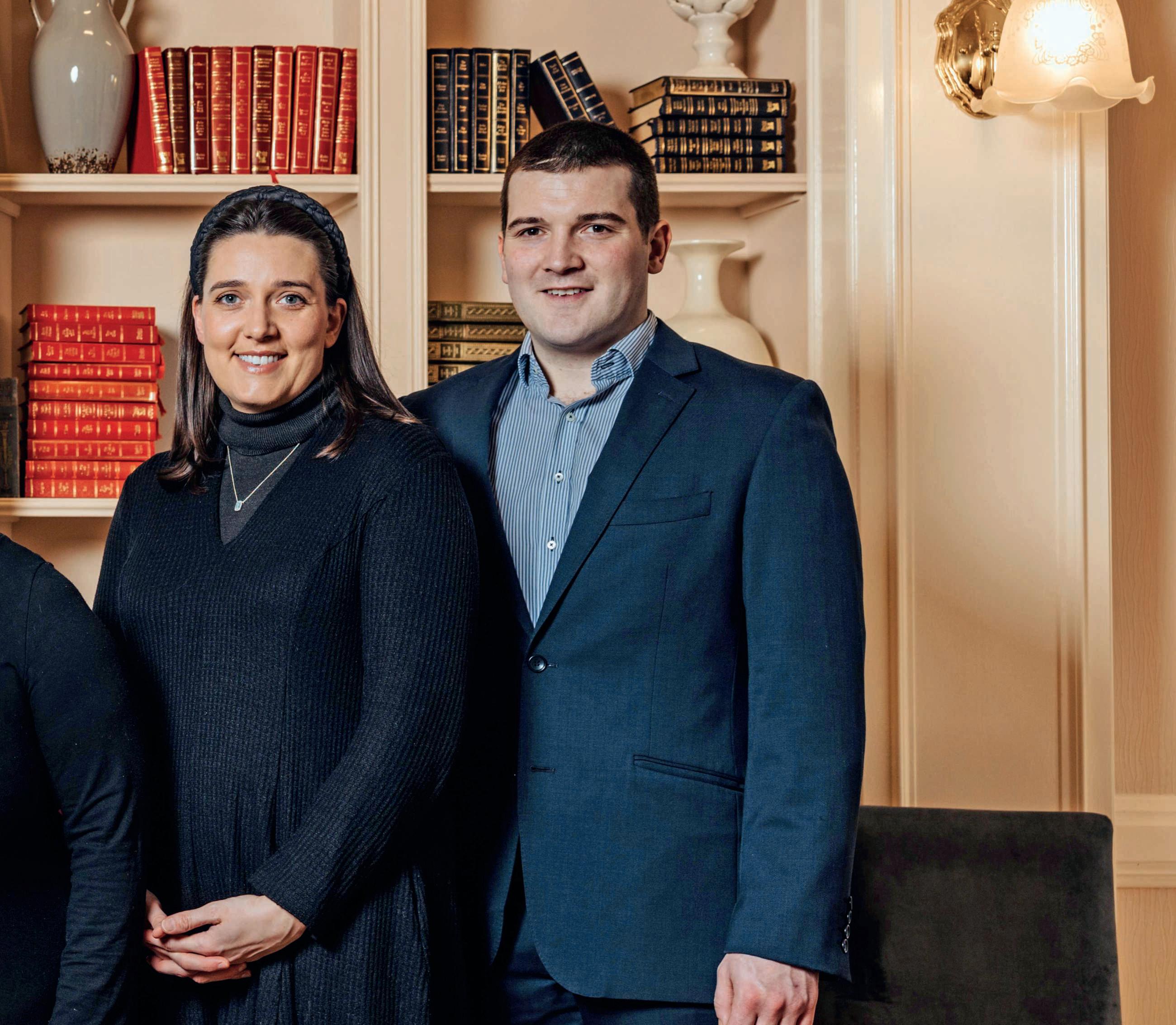
It could have been a disaster,” says Jane Allen, managing director, “but through our resilience as a family and sheer hard work, Magheramorne Estate was restored to a position that would allow it to be fit to trade once lockdown was lifted.
“Like many other hospitality venues, we had to be inventive and create alternative ways to generate income streams to sustain ourselves. Outdoor dining and our successful Magic and Mistletoe Santa Trail were all developed, the latter of which attracted a record 10,000 visitors over three weekends in the run up to Christmas 2023.”
In fact, the family has succeeded in building their business to a seven-figure turnover in just four years, a testament to their pedigree in the catering and hospitality industry, which started 35 years ago when Jane Allen established her own enterprise, Jane’s Kitchen, now one
of the most successful outside catering companies in Northern Ireland.
“We’ve prepared food for King Charles and Queen Camilla, and most recently for the ‘Agreement Twenty-Five’ celebration dinner hosted by former President of the United States, Bill Clinton, and the Chancellor of QUB, Secretary Hilary R. Clinton, at Queen’s University Belfast. I suppose you could say Jane’s Kitchen was the launch pad for the new business!” says Jane.
“As a family, we had all the credentials to make it work. My daughter Katherine is head of events, sales and marketing. Sara, head of food and beverage, trained as a chef at Ballymaloe and honed her skills in some of the most prestigious resorts in the UK, including Skibo Castle, while my son James, head of logistics, has been involved in the business since leaving school.”
The 15 experienced full-time staff are
supported by a trusted team of casual support for large scale occasions, all trained to the highest level to ensure the consistently high standards of service for which the venue is renowned.
Magheramorne Estate has quickly established an enviable reputation for luxury bespoke weddings, however, the management team has now embarked upon a three-year strategic plan to also build capacity within the lucrative corporate and luxury tourism market.
“We have already experienced great success hosting trade dinners, staff teambuilding and corporate seasonal events,” says Jane, “and this has provided us with a firm footing among local businesses who prefer an out-of-city experience.”
Committed to their ethos of offering something alternative from traditional venues, the team at Magheramorne Estate provides a boutique proposition based on exclusivity, where only one event is hosted daily, with clients having full personal use of the house and its magnificent grounds.
“While we have 35 ensuite bedrooms available, we are not in competition with traditional hotels where their focus is on maximising bed nights,” explains Jane. “Our unique selling point is that we are an exclusive event space that hosts private occasions where guests are assured of discretion, exemplary service and cuisine which is why a key aspect of our tourism strategy is with high-net-worth international customers. For example, we are currently at an advanced stage in talks with several parties in the US wishing to stay for the week during the British Open in 2025.
“This coming year is looking positive,” says Jane. “We have many weddings and high-profile events reserved, and while we have ambitious targets for growth, this is always tempered by our dedication to our core values. It’s a delicate balance, but after the challenges of 2020, as a team, it’s one we are more than capable of navigating!”
 Stephen Watson Director of Policy and Research, Cushon Columnist
Stephen Watson Director of Policy and Research, Cushon Columnist
Whether we’re talking about physical, mental or financial wellbeing, I think most leaders would agree that productivity levels are at their highest when employees are in the best of health. There are a lot of direct proof points around poor physical and mental health – reduced productivity, increased absenteeism and presenteeism – but perhaps less around financial health.
But consider these three stats from our own research:
• 3 out of 4 employees say not having savings is a worry
• 2 out of 3 employees say money worries affect their mental health
• 3 out 5 employees say money worries affect their performance at work
Most employers agree with the third stat – nearly 90% agree that money worries affect their employees’ overall performance. The bottom line is employees don’t bring only part of themselves to work – they bring last night’s sleepless night, increased anxiety over managing debt and worry about paying all this month’s bills.
In a nutshell, an increased focus on money worries translates to a decreased focus on work. And so, it only makes sense that the more we can do to help employees with their finances, the more productive they are going to be which ultimately means an increase to the company’s bottom line.
But is it just about today’s money worries?
The straight answer is no: it’s not quite that simple. Regardless of our income level or amount we have in savings, we are all on what can be best described as a “money worry timeline”. If I’m struggling to pay my mortgage this month, that’s what’s keeping me awake at night and until this is sorted, there’s no way I can think about anything else. On the other hand, if I’m managing today’s costs my focus turns to next month, next year or even further ahead.
What will my mortgage repayments be when my current deal comes to an end? What if I lose my job? Do I have enough in retirement savings?
The fact is money worries are both immediate and future based and both negatively impact on productivity. And this is the challenge for any financial wellbeing programme – to be successful it needs to address an employee’s entire financial life journey.
The whole point of a financial wellbeing programme should be about getting employees to feel confident about their finances: they can meet their current financial obligations but can also feel secure about their financial future.
What does good look like?
The million-dollar question! A financial wellbeing programme needs to start and finish with topical and engaging education.
Make it topical
By topical we mean education that deals with real life issues in a practical way so employees can take action. For instance, instead of educating employees about savings products, wrap it up into a needs-based subject such as “how to get on the housing ladder”. The material needs to address everything someone needs to know about buying their first home including saving for a deposit. In other words, it’s about providing the wider context rather than honing in on one part of a much bigger issue.
If employees then want more details on specific issues like saving for a deposit, then provide a separate education piece around this or individual one-to-one guidance sessions.
Make it engaging
By engaging we mean making it real, useful and available when someone needs it. Successful education is both about alerting people – I might not be thinking about the issue right now, but you’ve piqued my interest – and also about making sure I can access it when I need or want it.
There’s no doubt that the continuing cost of living crisis is impacting all employees in different ways. Some will be worrying about costs today while other will be more concerned about the future. A good financial wellbeing programme will address both concerns and get your people more focused on their job.
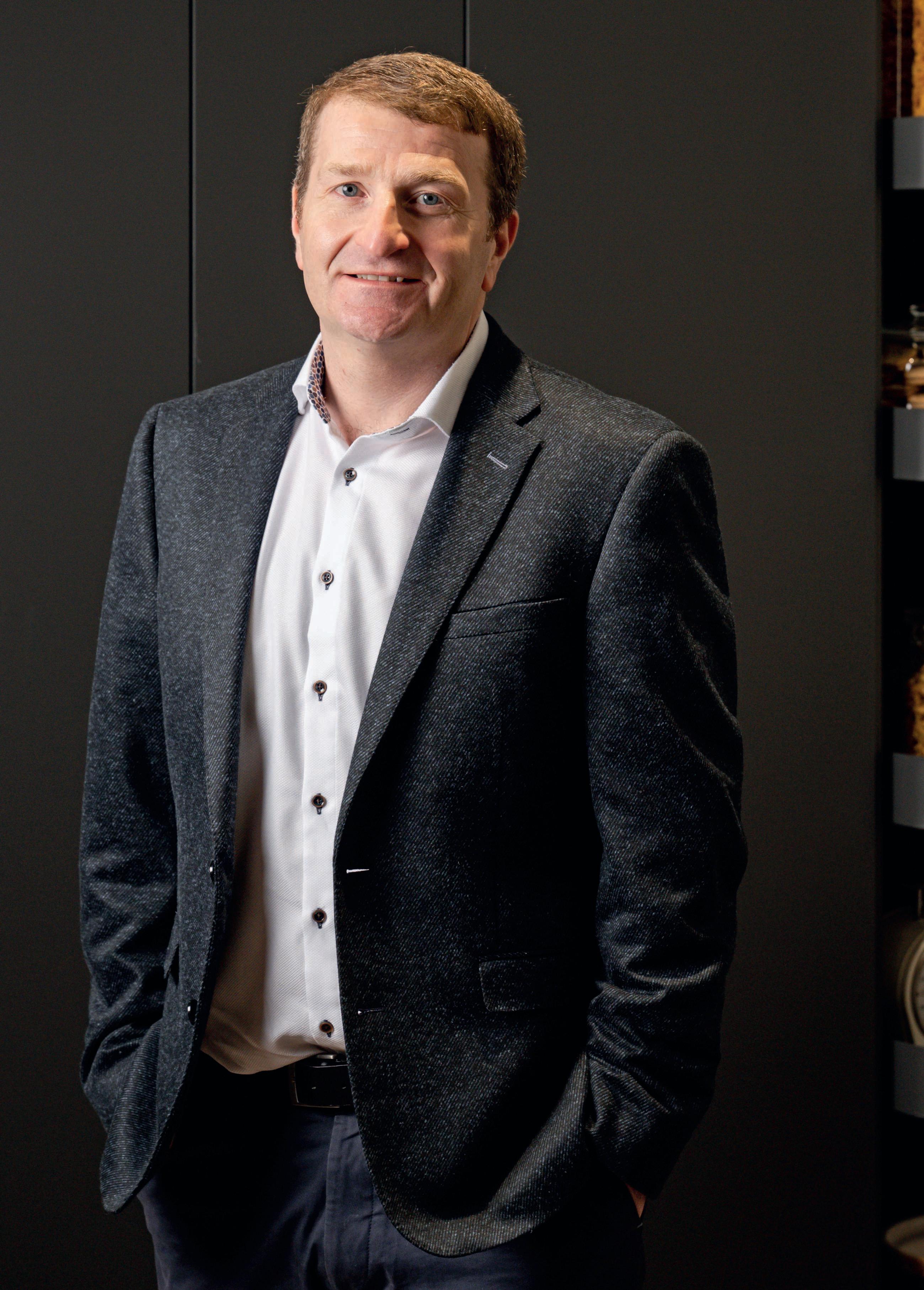



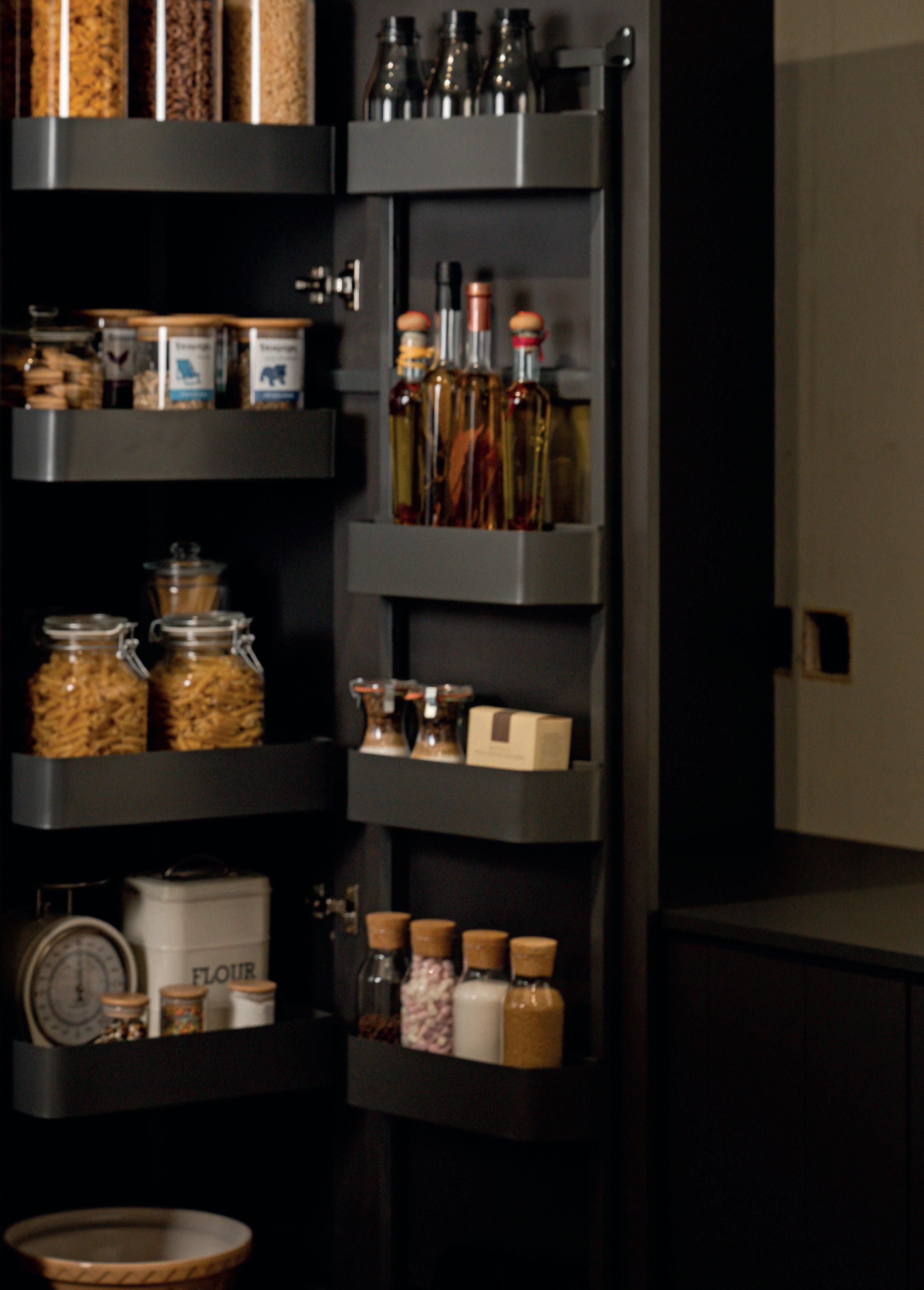
Simon Oliphant, Group CEO at Uform, the manufacturer and distributor of a comprehensive range of doors and accessories to the kitchen, bedroom and furniture trade, talks about scaling up and how the business is planning to take a bigger chunk of the market.
Uform, initially known as Oakwood Door Designs Limited, was established in 1992. Founded by Eamon Donnelly, his brother Paul, and their late father Eddie, the company took root with a strong cultural foundation that continues to define its ethos today.
Over the past 31 years, it has undergone significant transformations, evolving from its humble beginnings into a powerhouse in the kitchen furniture industry. That journey was not without its struggles: the company has experienced the recession, infrastructure challenges and the pandemic, which brought subsequent raw material shortages and substantial price pressures.
The company serves prestigious, mid- to highend independent kitchen and bedroom retailers and manufacturers in the local market, the south of Ireland and Great Britain. For insights into the remarkable journey that has shaped the company’s success, there’s no one better to speak with than Group CEO Simon Oliphant.
Simon has been leading the business since 2022. His journey with Uform began in 2006 as the procurement manager – shortly after which the business navigated its way through the recession, experiencing a dip in turnover from £11 million to £8 million. Simon reflects on those
challenging times, stating: “It wasn’t always good times, quite the opposite.
“Before I joined in 2006, the business turnover was £11m. I was the procurement manager then, having experienced the recession when business dropped to £8m – it was a level of duress during that period. So, we spent time putting foundations in place to trade through the hard times and position ourselves for growth,” he continues.
“In 2009 I became operations manager and in 2013 I moved into the role of general manager. In 2015 I was appointed managing director, then subsequently Group MD and in 2022 I became Group CEO, the role I have today. I have more or less looked after every area functionally.”
He says there have been many significant moments throughout his time there, notably “running the business on fresh air” during the recession. “But the hard work has paid off,” he adds. “During my time here, there have been completely different circumstances and juxtapositions.”
Today, he says the business is nothing like its 2006-2008 version. “The last five years have been our most successful period and we are now turning over circa £63m.”
This growth is also reflected in the business’s headcount. Back in 2008, Uform had 65 staff: today the two businesses in the Group – a site in NI and one in Donegal – accommodate 420 people in total.
The company’s current growth strategy has been multifaceted, with an emphasis on expanding product lines beyond the kitchen, which was the business’s core offering.
Simon explains: “We have positioned ourselves for growth by strengthening our core offering whilst diversifying into bedrooms and alternative components which cater for the creation of freestanding and fitted furniture within the home.” The company’s strategy is paying off, with GB now constituting 60% of sales – up from 40% in 2018. Simon envisions growing the GB market share to 75% of revenue, with simultaneous growth in Ireland through different product categories.
“We have flipped our ratios, but we haven’t lost ground in Ireland: our percentage mix has just changed because of the growth in GB where we still have a lot more market share to get. Whilst growth will come primarily from GB, we are absolutely clear that our domestic market is equally as important, as this has helped provide the backdrop of where
“To get and retain talent is tough and we want to be the employer of choice. It’s the people that drive businesses and a huge part of success is to create the right culture and values. It’s also people who create the product, the systems and processes that deliver the service proposition and ultimately add to the brand.”
not just a product made from sustainable sources or which is recyclable. Whilst this is important, it is also about making sure the product lifespan is maximised and that means ensuring we specify, manufacture and supply quality products.
“There is an appreciation for quality products which are of value. Customers want lasting, sustainability,” he notes. The company actively avoids the lower end of the market and emphasises sustainability in its product design and material sourcing.
Shifting focus to the Uform team, a pivotal factor in the company’s success story, Simon continues: “When it comes to investments, you can’t just look at adding new products or increasing capital expenditure. You need to ensure you have the resources across the business to support the overarching objectives.
“To get and retain talent is tough and we want to be the employer of choice. It’s the people that drive businesses and a huge part of success is to create the right culture and values. It’s also people who create the product, the systems and processes that deliver the service proposition and ultimately add to the brand.
“Having all the building blocks in place to ensure the customers have the best choice, quality and service is paramount and this ultimately translates into being easy to do business with. This is the backdrop to ensuring longterm relationships and establishing new partnerships.”
we are today.” It’s clear that long-term relationships and solid partnerships are a core part of the company ethos.
Uform’s adaptation to market trends, such as the surge in home improvements during the pandemic, has benefited the trading position. Simon acknowledges the market correction post-COVID but affirms: “We are beating the market in general and have positioned the business to grow. In response to the tough market and in line with our continued investments, we launched our bedroom offer in November last year which is substantial. This allows the company access to new markets and revenue streams which were previously inaccessible.”
Simon goes on to shed light on Uform’s enduring ethos around being environmentally responsible, a commitment ingrained since its inception. This positions the company favourably as consumers increasingly prioritise environmentally conscious choices. “Being environmentally responsible is
Simon’s wealth of experience navigating diverse trading landscapes and overcoming challenges is one that can help other businesses. His advice to those who aspire to similar success is clear: “Embrace scaling with an ambitious plan. Be resolute, and brave and never stop believing as anything else is just wasted energy and an unhelpful distraction to executing the plan.
“Despite adversity, including dire liquidity issues during the recession, Uform boldly pursued growth, resulting in a resounding success story.” The key, according to Simon, lies in being prepared to invest across all aspects of the business, understanding the boundaries but always trying to stretch them. “Aspire to create a dynamic and flexible operation where all decisions are based on the customer’s needs whilst being commercial with your thinking. Create a culture and sustainable business where your people understand the customer, have autonomy, are valued, and can thrive,” he concludes.































 Anne Marie Roddy Associate Director at Carbonfit Columnist
Anne Marie Roddy Associate Director at Carbonfit Columnist
Carbon reduction planning, particularly when viewed through the lens of supply chains, emerges as a pivotal avenue for businesses committed to both environmental stewardship and operational efficiency. At Carbonfit, the understanding that effective carbon reduction planning requires a comprehensive grasp of supply chain dynamics is paramount. It begins with a thorough assessment of the entire value chain, identifying key emission hotspots and evaluating the environmental impact of each stage. Utilising data analytics and the advanced Carbonfit platform, businesses can pinpoint areas for improvement and initiate emission reduction strategies.
Collaboration is foundational to successful carbon reduction planning. Engaging with suppliers, manufacturers, and logistics partners showcases a shared commitment to sustainability goals. Through strategic partnerships and transparent communication, businesses align their objectives and leverage collective expertise to drive impactful change across the supply chain ecosystem. The use of innovative technology like Carbonfit highlights these efforts, facilitating the adoption of eco-friendly practices and the integration of renewable energy sources.
Incorporating sustainability criteria into supplier selection and procurement processes can yield significant carbon
reductions. Prioritising suppliers with strong environmental credentials mitigates supply chain risks and enhances resilience in evolving regulatory landscapes. Supplier diversity and local sourcing initiatives offer additional opportunities to reduce transportation emissions and support regional economies.
The pursuit of net zero demands a diverse approach, combining mitigation and offset strategies. While optimising operational efficiencies and embracing renewable energy remain crucial, businesses can further advance sustainability goals through sustainable linked loans and lower finance costs. These financial instruments support green initiatives and align capital allocation with environmental objectives, fostering a direct link between financial incentives and environmental impact.
Transparency and accountability are integral to the success of carbon reduction planning. Adopting reporting frameworks such as SBTi, ISO 14064, and TCFD, and disclosing verified emissions data builds trust among stakeholders and enhances corporate credibility. Demonstrating commitment to environmental stewardship and regularly tracking progress against established targets enables businesses to inspire industry-wide change.
The journey towards carbon reduction is not without challenges, from supply chain disruptions to regulatory complexities. However, through
innovation, collaboration, and a focus on long-term value creation, businesses can transform these challenges into opportunities for growth and resilience.
Carbon reduction planning through the lens of supply chains exemplifies a shift in corporate sustainability practices. By embracing a comprehensive approach, businesses can drive meaningful environmental impact, enhance operational efficiency, and foster stakeholder trust. As we embark on this transformative journey towards a low-carbon future, harnessing the power of collaboration and innovation will be essential in building a more sustainable tomorrow.
Carbonfit stands ready to support businesses in their journey for environmental excellence, offering tailored solutions and strategic guidance to navigate the complexities of carbon reduction planning.

My seven steps for business success
Martina Corrigan is Group People and Culture Director
Errigal is a market leading construction company; with specialist expertise in partition systems, external façade, interior fitout, ceilings, and bespoke solutions. Our track record in these specialist areas is internationally renowned and, as a result, we are able to provide an exceptional service on construction projects of all sizes. With a dedicated manufacturing facility at our headquarters in Monaghan and Antrim, we also have regional o ces in London, Northern Ireland, and Europe. In addition to our core capabilities, Errigal has recently expanded its portfolio through the strategic acquisition of three prominent businesses: Potter Cowan, Gillespie, and Comfort Frame. These acquisitions further enhance Errigal’s position in the market, broadening our o erings and expertise across various sectors within the construction industry.
1. WELLBEING
Our employees are the beating heart of our organisation. At the core of our company lies a commitment to wellbeing and our strategy is simple: “we care”: We aim to embed health and wellness into our daily routines by cultivating a supportive workplace that prioritises physical, mental, social, and financial wellness. Through this approach, we have discovered that not only do we enrich the lives of our employees, but we also reap numerous benefits that contribute to the prosperity of our business.
2. TRAINING AND DEVELOPMENT
We believe that providing regular training to our team helps us to stay ahead in the industry, improves morale amongst our team members and supports talent retention. By continually investing in the skills and expertise of our employees, we
empower them to excel and drive our organisation towards long term success and innovation.
3. PASSION
Each day, as I gear up for work, I am filled with an unwavering passion that drives me onward. The commitment and teamwork of my colleagues provide constant inspiration. The thought of our business’s ongoing success also brings a sense of anticipation. With every achievement, we continue to strengthen our market position and unveil new opportunities for growth and innovation.
4. JOURNEY

For more than 15 years, I have been part of the Errigal team, contributing to the business by undertaking various roles across multiple departments. Throughout this journey, I have witnessed the company navigate numerous challenges, yet also experience many successes along the way. Starting out as a junior team member, I gradually took on more responsibilities, ultimately leading me to my current role where I oversee and support several teams in our business. Along the way, I have learned the importance of adaptability, hard work, and perseverance. Looking back, I am grateful for the experiences and the supportive colleagues who have been part of this journey. As I continue to evolve in my role, I remain committed to contributing to the ongoing success in Errigal.
5. RELATIONSHIPS
Maintaining strong relationships with our suppliers and clients is key to our business success. Listening to their needs, celebrating our wins together and building mutual trust are essential aspects of developing these relationships. I believe
that strong relationships lead to increased efficiency, better communication, and opportunities. In a competitive market, having a network of reliable partners and satisfied customers can serve as a crucial distinguishing factor, providing a basis for long-term growth and sustainability.
6. TEAM
Our team is the backbone to our business, playing a pivotal role in its success. Investing in and supporting a diverse team nurtures creativity, enhances problem solving skills and facilitates an environment where our team members can thrive and grow. Effective communication is vital in my role in supporting the team. Taking the time to actively listen, respond, and equip our team with the resources they need allows our team members to perform at their best, driving continued success for our business.
7. INNOVATION
Like many businesses, Errigal needs to stay ahead of the curve when it comes to the advancement in technologies and innovative ways of thinking. We are continually exploring new ideas, processes, and technologies to help improve efficiency and meet growing customer needs.


I’m always up for a trip to Portrush, so when the opportunity arose to visit the newest hospitality offering in town, I was more than happy to oblige. The much anticipated Bank Apartments & Safehouse Café Bar, ideally located in the heart of Portrush, occupy what was formerly known as the Northen Bank Building. The development consists of six exquisitely designed, serviced apartments, the style of which reflects the original grandeur of the listed building.
We arrived just ahead of our dinner reservation and had time to check out our fabulous apartment before heading off for our evening meal in the Safehouse. The Safehouse is conveniently located at the front of the building, on the ground floor, and we were delighted to find that everything was so close to hand, especially given the weather that evening.
Upon arrival, we were warmly greeted and shown to our table to peruse the menu. First impressions were positive; the bar had a lively cosmopolitan air. It was busy with customers of all ages enjoying food and drinks while catching up with friends - the ambience was good.


Once drinks were ordered, we had the opportunity to decide on the food choices. The menu offered a casual dining experience and we opted for the tomato and mozzarella strips served with tapenade and cheesy garlic bread. Both were excellent, oozed flavour and the tapenade was a perfect accompaniment.
The main offerings included paninis and pizza. We decided on the smoky BBQ which had toppings of chicken, bacon, sweetcorn, red onion and mozzarella and the Sicilian which had salami, onions, mozzarella, fresh garlic and chilli oil. Both pizzas were generous in size and if not that hungry, one to share would be ample. Both were cooked to perfection and extremely tasty.
We didn’t have room for dessert but we stayed for another drink to soak up the bar’s welcoming atmosphere before returning to enjoy the spectacular penthouse that had been assigned to us for the night in the Bank Apartments. The penthouse provided panoramic views of Portrush; it consisted of one bedroom with ensuite, one bathroom and a spacious living area with fully equipped kitchen. The quality of everything, from the furnishings to the comfortable bed, shower and towels was truly wonderful.
We had the most enjoyable stay and would highly recommend the experience. If you enjoy rain-shower bathrooms, seamless online check-in, onsite laundry facilities, all only five minutes from Royal Portrush, then this is the place for you. We’ll be returning again soon.
Bank Apartments & Safehouse Café Bar
60 Main Street, Portrush BT56 8AN
Telephone: 028 7053 1476
www.bankapartments.co.uk



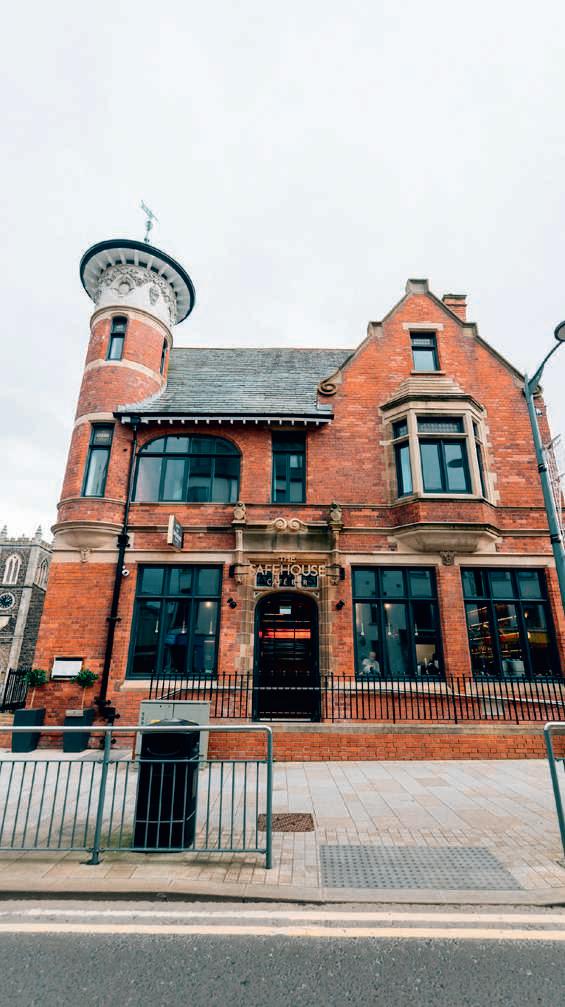
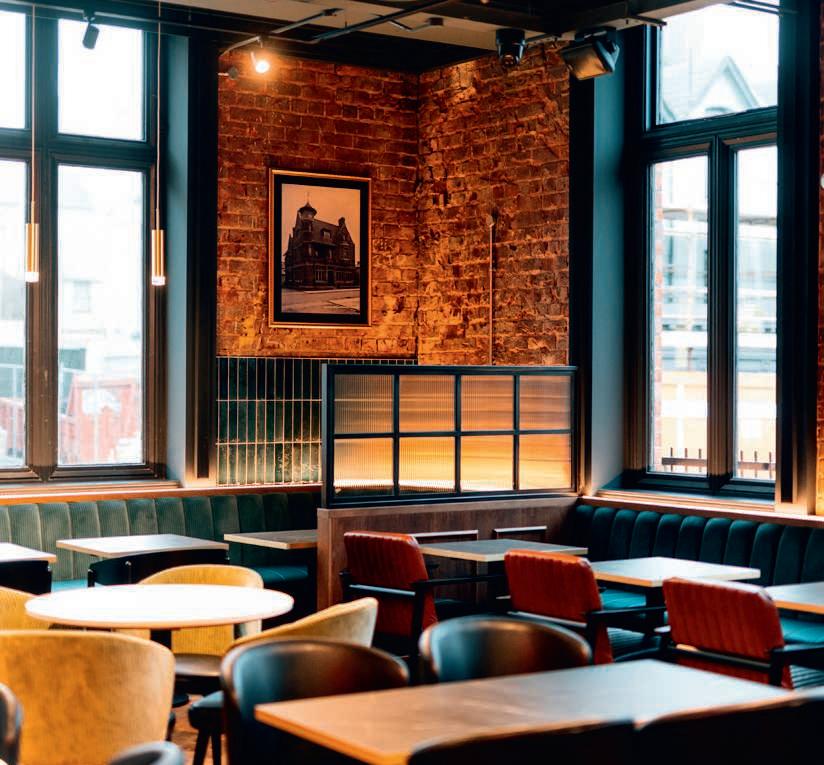

A bespoke collection of serviced apartments in Portrush 60 Main St, Portrush BT56 8AN | bankapartments.co.uk
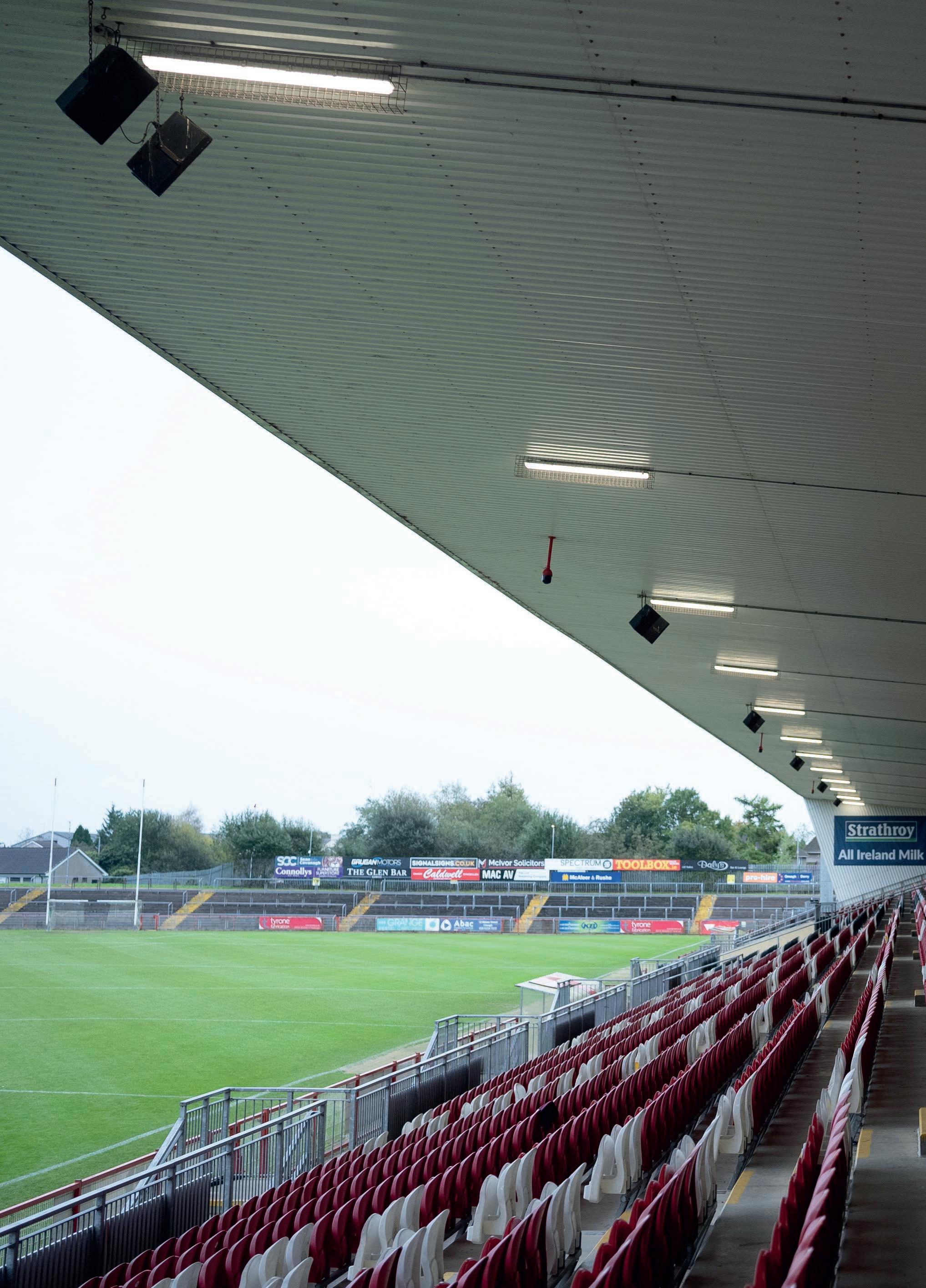
With sustainability at the top of the agenda for businesses in Northern Ireland, many local companies are choosing energy efficiency and investment in technology to help their green credentials. Power NI offers businesses the chance to upgrade to more efficient lighting through the energy supplier’s Lighting Solutions programme. Commercial customers can retrofit any premises with new LED lighting, spreading the cost of the installation over their electricity bills instead of paying for it upfront, making it a much more affordable option for businesses. Not only does the scheme help businesses reduce their carbon footprint, but they can also secure savings off their electricity bills and lighting maintenance costs, with many reporting a saving of up to 70%*.
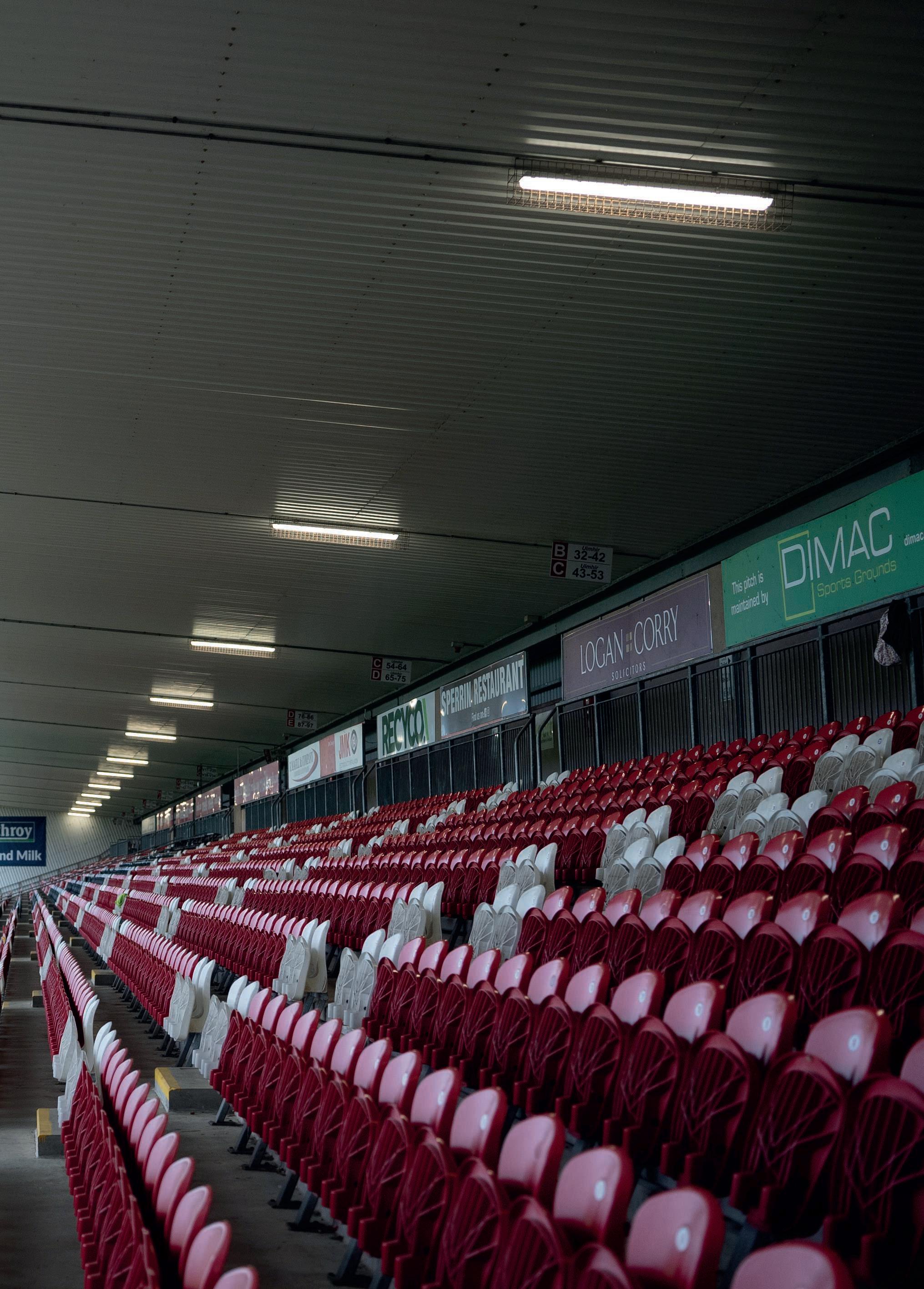



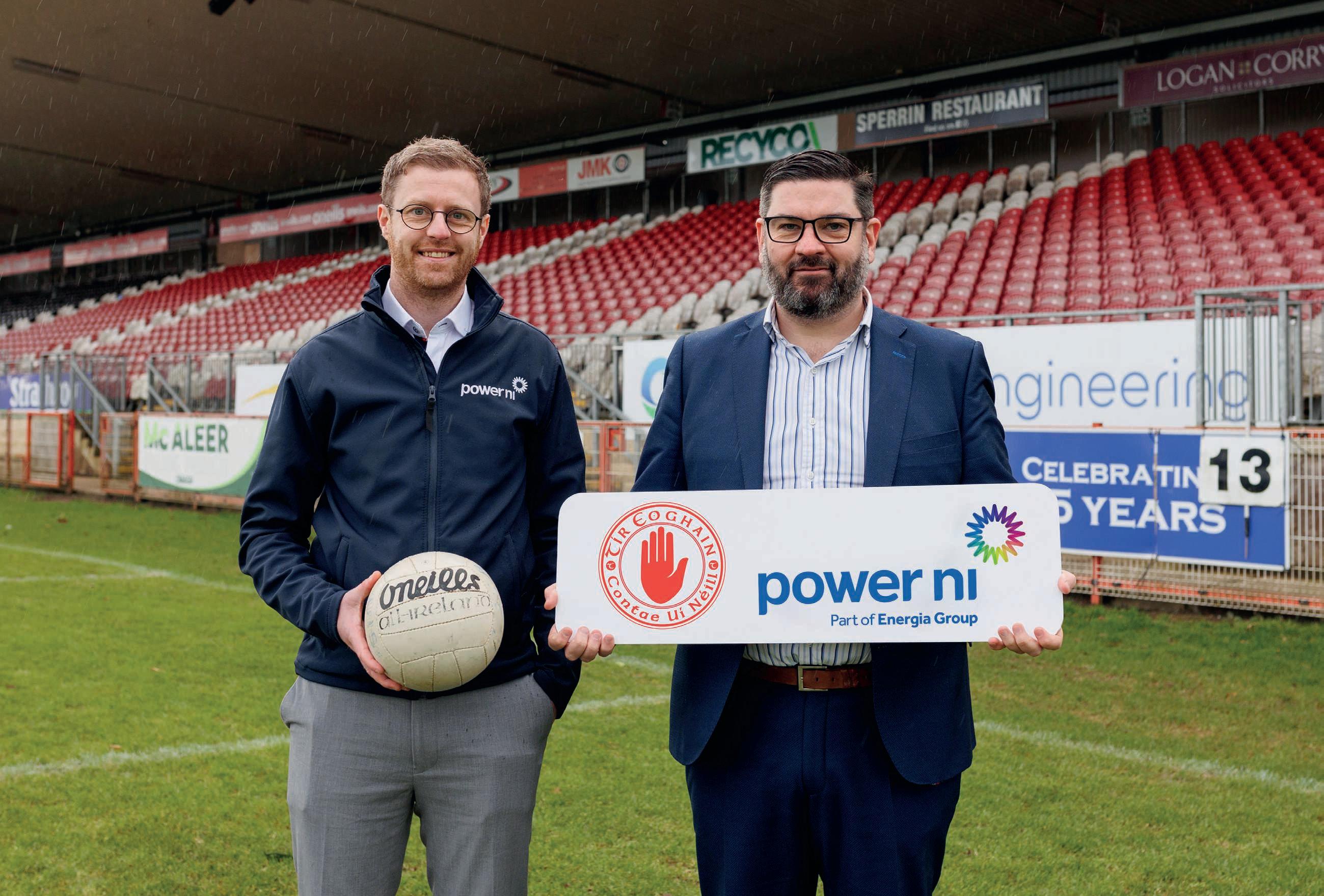
The lighting upgrades are project managed by Power NI through all stages from the initial lighting audit, ordering the LED equipment and associated installation to the recycling of the old fittings. The cost of the upgrade is spread across a number of years, depending on the agreed contract, managed by your dedicated Power NI Key Account Manager. This means the upgrade is fully financed through your electricity bills rather than having to pay upfront capex.
As a part of the lighting upgrade process, Power NI will arrange and carry out an energy consumption audit to assess the current light levels of your premises, room by room, to get a full picture of the amount of energy being used in each part of the building. This information along with the operating hours of your business, will enable the expert Power NI lighting team to prepare an upgraded LED lighting design as well as calculating the predicted savings. All proposed lighting redesigns are in line with the Chartered Institution of Building Services Engineers guidelines (CIBSE) and energy efficiency, lighting distribution and quality thresholds are all met to ensure the best possible user experience.
Power NI will also check current light levels to see if it complies with BS5266-
1:2016, the code of practice for the emergency lighting of premises.
What are the benefits of upgrading to LED lighting?
As many businesses need to have lights on throughout the day and night, this results in higher electricity bills. LED lighting is cheaper than using traditional bulbs (as well as 1st and 2nd generation LED fittings), so upgrading to modern LED lighting helps make long-term savings. As LED lights have a minimum life of 20-25 times more than conventional incandescent lighting, the cost of replacement bulbs is also significantly reduced.
Modern LEDs are the most energyefficient lighting solution currently on the market for businesses. It reduces the amount of heat that is normally generated by lighting, meaning that 90% of electricity can be transformed into light, with less energy going to waste. As less energy is needed to light an LED bulb, it can substantially lower energy bills for businesses. In comparison, traditional incandescent light bulbs only have the ability to use 10-15% of the power efficiently and the rest is wasted as heat. Finally, LED lighting also improves visibility inside and outside the workplace, making businesses a more attractive and
safer environment for both customers and employees.
Power NI, part of Energia Group, has carried out a number of LED lighting upgrades for local commercial premises alongside its sister company, Energia, including Tyrone GAA’s Healy Park, SuperValu Edgeworthstown, Murphy Group, Beacon South Quarter and Wexford Credit Union. Most recently, Power NI’s lighting upgrade at Healy Park, Omagh, resulted in the stadium reducing energy consumption by over 60%. With their annual consumption now decreased by over 24,000 kWh, around 5.8 tonnes of carbon will be saved annually.
For any businesses looking for an opportunity to become more sustainable as well as save money on bills, then Power NI Lighting Solutions is the perfect solution.
To find out more information about Power NI’s LED Lighting Solutions, visit powerni.co.uk/lightingsolutions or email lighting@powerni.co.uk
* Upgrading from conventional lighting to LED technology can deliver significant cost savings of up to 80% for a business (Source: UK Government, Department for Business, Energy and Industrial Strategy)




Reduce your lighting costs by up to 70%* with a Lighting Solutions upgrade from Power NI
To find out more about a lighting upgrade for your business, email lighting@powerni.co.uk


*Upgrading from conventional lighting to LED technology can deliver significant cost savings of up to 70% for a business
(Source: UK Government, Department for Business, Energy and Industrial Strategy). Lighting Solutions only available to Power NI commercial customers.


Lighting Solutions

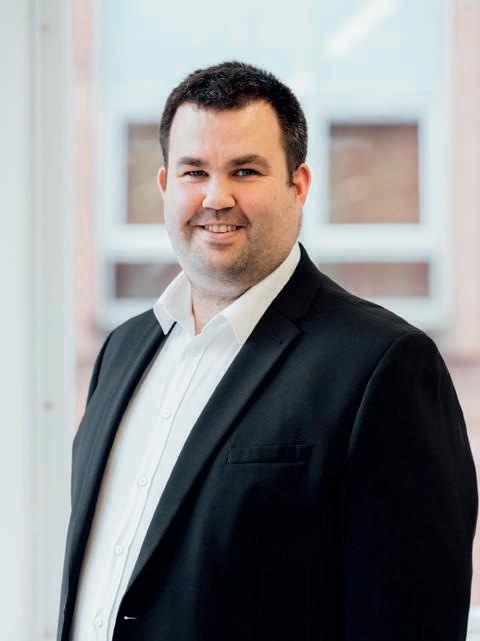 David Small Chief Technology Officer, Business Applications, Telefónica Tech UK&I Columnist
David Small Chief Technology Officer, Business Applications, Telefónica Tech UK&I Columnist
It has been said that every company is now a technology business, no matter what product or service it provides, and those that embrace this fact are the ones that succeed and shape our world. This may be overstating it a little, but the undeniable fact is that no company can make, deliver, or market its product efficiently and effectively anymore without technology. And increasingly, those companies that harness the technical know-how of their people are the ones that really thrive.
This has been the driver of the recent phenomenon of the citizen developer. For those who don’t know, citizen development is a business process that encourages non-IT-trained employees to become software developers, using IT-sanctioned low-code/no-code (LCNC) platforms to create and improve business applications.
This approach to software development empowers employees – despite their lack of formal education in coding – to create and customise existing software programmes to suit a user’s specific needs and improve operational efficiency within a company. Low-code platforms typically allow business users without any knowledge of how coding works to address their own development needs.
This may be challenging for organisations who are new to the
phenomenon but – with the right tools, processes, and governance in place – it can be very effective. In today’s rapidly evolving technology landscape, we believe that the concept of citizen developers is revolutionising how organisations approach software development. Telefónica Tech UK&I is actively supporting organisations in implementing this approach, particularly through what we term fusion teams. These teams consist of a combination of citizen developers and IT professionals who collaborate to accelerate digital transformation. By leveraging the diverse skill sets of both technical and non-technical members, fusion teams drive innovation and efficiency.
Recent studies suggest an overwhelming 89% of CIOs and IT professionals affirm the effectiveness of a low-code approach in enhancing efficiency. Looking ahead, Gartner predicts a significant shift in the landscape, anticipating that by 2026, developers outside formal IT departments will constitute a minimum of 80% of the user base for low-code development tools.
In our experience, the benefits of citizen developers in your organisation include:
• Accelerated innovation – Citizen developers can rapidly prototype and deploy solutions, leading to quicker innovation cycles.
• Reduced IT burden – With citizen developers taking on more development
tasks, IT teams can focus on more complex, strategic initiatives.
• Democratised technology – Microsoft’s low code power platform democratises technology, making it accessible to a broader range of employees, thus fostering a more inclusive digital workplace.
• Enhanced collaboration – Fusion teams facilitate better communication and collaboration between IT and other business units.
Telefónica Tech’s application experts are helping organisations roll out and customise technologies such as Microsoft’s Power Platform to make this a reality. Power Platform stands as a beacon in this transformative era. It encompasses a suite of tools – Power BI, Power Apps, Power Automate, Power Pages and Microsoft Copilot Studio (formerly Power Virtual Agents). These tools empower users to analyse data, build solutions, automate processes, and create virtual agents with minimal coding experience.
So what are the best practices for implementing fusion teams with Power Platform? They include:
• Clear governance – Establish clear guidelines and governance models to manage the balance between innovation and control. A Power Platform Centre of Excellence can help with setting the standards across multiple company divisions with separate fusion teams.
• Training and support – Invest in training resources to empower citizen developers and ensure they have the necessary support. Microsoft Learn free learning paths are generally the best asset for this with progress tracking and knowledge checks throughout.
• Cultivate a collaborative culture –Encourage a culture of collaboration and continuous learning between IT professionals and citizen developers such as pair programming or peer review.
•Monitor and measure success – Regularly monitor the performance and impact of solutions developed by fusion teams. The Power Platform Centre of Excellence starter kit can be installed to give a single view of all the business applications across Power Platform and Dynamics 365 environments.
Telefónica Tech UK&I is helping several organisations to successfully implement fusion teams using Microsoft Power
Platform. For instance, a financial services company that we work with used Power Platform to streamline broker onboarding and management, significantly reducing manual errors and improving efficiency. With the citizen developers’ business knowledge and the low code platform accelerated the solution to meet the highest priority business problems and increase user adoption.
In our opinion, the collaboration and fusion of IT professionals and citizen developers through platforms like Microsoft Power Platform is an imperative in a rapidly changing digital world. Careful planning, management, and governance are essential for success. With the assistance of application experts like Telefónica Tech, adopting a best practice blueprint is vital. This should be managed through a Centre of Excellence, ensuring the right balance between innovation and control, supported by appropriate training.
With a collaborative approach, organisations can look forward to a more democratised, efficient, and innovative future in software development, harnessing the collective strengths of diverse teams. As organisations continue to embrace this model, the potential for transformative change is boundless.
Telefónica Tech is the leading company in digital transformation. The company has a wide range of services and integrated technological solutions for cybersecurity, cloud, IoT, big data, and blockchain. For more information, please visit:: www.telefonicatech.com/
Bank of Ireland is investing over £600,000 to retrofit energy-efficient LED lighting in its Northern Ireland branches and offices across the UK to enhance energy efficiency, reduce its carbon footprint and contribute to a more efficient and sustainable operation.
Work is already underway to replace 5,500 energy efficient light fittings across the Bank’s 13 Northern Ireland branches and wider office estate across Belfast and Bristol. When complete, the project will reduce the Bank’s lighting energy consumption by around 60%.
The retrofitting of LED lighting aligns with the ISO 50001 standard on energy management, which sets out how organisations can improve their energy use and conserve resources.
This announcement follows the Bank’s recent investment of £3m to deliver a new fleet of energy efficient ATMs to replace its existing network, which will see its ATM energy usage more than halved.
Gail Goldie, chief executive officer, Bank of Ireland UK, said: “We are investing in a more sustainable future, and our energy-efficient LED lighting programme is a further example of this. This programme will help us to significantly cut our lighting energy consumption, further reducing our environmental impact. All of this is helping us make progress in meeting the ambitious green targets we have set for our business.”
In December 2022, the Science Based Targets initiative (SBTi) validated Bank of Ireland’s target of a 49% reduction in GHG from its own operations (scope 1 and 2) by 2030, which supports its broader aim of net zero emissions by 2030. Overall, Bank of Ireland has made significant progress in reducing scope 1 and 2 emissions, reaching absolute emissions reductions of 90% since 2011, and a 42% reduction on the 2020 baseline.

Eamonn Hughes, chief sustainability and investor relations officer, Bank of Ireland, commented: “Energy efficiency is an important pillar of our ESG strategy and we believe that this investment not only benefits our bottom line but also underscores our commitment to reducing our environmental impact and contributing to a more sustainable world.”
Bank of Ireland has introduced a range of initiatives to minimise its environmental impact, including planning a phased electrification of its fossil-fuel based space heating systems, further decarbonising its operations.




David McDonald, Managing Director of eSmart Networks, the UK independent electricity connection provider with a base in Belfast, talks to Emma Deighan about his experience in GB and how that can help shape reforming the way NI’s electricity landscape operates to create opportunity for business and the local economy.
As the global move towards sustainable energy intensifies, eSmart Networks Limited is delivering projects which contribute to the transformation of the UK’s energy landscape – more notably in Great Britain, its home base. Locally, while the company is involved in the EV charging infrastructure expansion here, there’s an intricate argument to be had by the organisation which has a unique insight to help shape policies.
Managing Director David McDonald begins: “We are an independent connection provider, an integral part of the UK’s energy ecosystem. From our headquarters in Essex, eSmart Networks has rapidly expanded its footprint, becoming a prominent player in GB grid connections over the last three to four years.”
At the heart of eSmart Networks’ mission is the provision of smart grid infrastructure and large grid connections across the UK. As well as electric vehicle (EV) charging stations, the company extends its expertise to diverse domains, including bus electrification, large industrial and commercial sites, and the development of large-scale solar park connections.
Locally, its journey began in 2022 when it set up a technical hub in the city creating almost 20 roles. Its goal here is to provide grid expertise, design and compliance functions for the company across the UK.
A pivotal moment in the overall growth of the company has been the establishment of the technical hub in Belfast – which addresses the company’s need for technical engineers and capitalises on the rich talent pool offered by Northern Ireland – but most of its operations are still concentrated on projects in Great Britain. Despite this, the eSmart Networks Northern Ireland team, stationed at the Catalyst Innovation Hub, plays a crucial role. David says: “Our Belfast office, now boasting a team of 17, has been instrumental. It has not only helped bridge the skills gap but also acts as a hub of diverse experiences, providing insights into regulatory challenges across various regions, including NI, the Republic of Ireland, GB, and beyond.
“We’re also collaborating with large fuel station developers, facilitating the transformation from traditional petrol forecourts to high-powered EV forecourts.” The projects extend to installing substations capable of supporting multiple high-powered chargers – a testament to the evolving demands of the electric vehicle industry.
“There needs to be a will to change, and the regulator’s new focus on enabling the green economy could be a step in the right direction.”
eSmart Networks has responded to a consultation with the regulator to propose changes.
David remains optimistic about the potential for that change. He adds: “There needs to be a will to change, and the regulator’s new focus on enabling the green economy could be a step in the right direction.”
As eSmart Networks navigates through challenges, the company’s podcast – aptly named “The Grid” – emerges as a valuable educational resource for many businesses. The podcast’s success is evident through its broad audience which includes customers and electrical engineers. The podcast not only serves as a platform to discuss connection charging intricacies in GB but also exemplifies eSmart Networks’ commitment to educating its audience.
In addition to its contributions to the private sector, eSmart Networks has made significant strides in the area of public transportation. The RATP project, where it electrified buses in London for Transport for London (TFL) is just one of many public projects.
The company undertakes full turn-key projects, handling everything from grid connections to downstream devices, showcasing its comprehensive capabilities as an independent connection provider. As well as the EV space, the company has many projects within the renewable and industrial and commercial sectors.
David openly recognises the existing challenges here that greatly differ from GB, particularly within the regulatory framework. He believes that addressing these issues could unlock significant potential for the company and boost the overall NI economy. According to him, resolving these challenges would make Northern Ireland more appealing to large-scale businesses and charge point operators seeking to set up shop and establish new grid connections.
He adds Northern Ireland also lags when it comes to connection charging policy and the lack of a regulatory framework to facilitate independent distribution network operators (IDNOs) like in GB.
“In GB, if a business applies for a connection, even if the network needs upgrading, the costs of that reinforcement are covered by the distribution network operator. In Northern Ireland, it’s only the connecting customer who has to pay, making us less competitive,” he explains.
He says that this discrepancy often deters businesses, particularly large charge point operators, from undertaking projects in NI, creating a significant hurdle in the region’s progress. As a result,
David’s trajectory is firmly grounded in electrical engineering. He pursued his studies in electrical engineering at Queen’s before embarking on his professional journey with NIE Networks as a graduate engineer. Accumulating over two decades of experience in the industry, he has taken on diverse roles spanning grid connections, asset management, and a decade-long tenure as an operational engineer. During this time, he supervised teams engaged in tasks ranging from LV connections to transmission substation refurbishments. His ascent to his current position as managing director at eSmart Networks is due to his commitment and expertise in the field.
Looking ahead, David is hopeful for untapped opportunities at eSmart Networks. “We’d love to be doing more work in Northern Ireland, and there are so many possibilities. The opportunity is there to move forward if we could all get on board. We have the experience, learning, and contacts to make a significant impact.”
Gearing up for that potential, its Belfast hub has welcomed its first apprenticeship and graduate cohorts. “It’s a great opportunity for them to learn from experienced individuals across eSmart Networks. And, most importantly, a brilliant time to be joining the industry, as we look to secure our customers’ power needs and deliver their electrification plans with certainty,” he concludes.
www.esmartnetworks.co.uk
https://esmartnetworks.co.uk/the-gridpodcast/
Applications have opened for entries to the 2024 Irish News Workplace and Employment Awards, which will again recognize the enormous talents and achievements of a wide range of groups and individuals from all sections of business across Ireland. The initiative honours and rewards the best places to work across Ireland. This year marks the 16th awards ceremony, which has evolved into one of the country’s most prestigious initiatives, regularly attracting hundreds of entries.
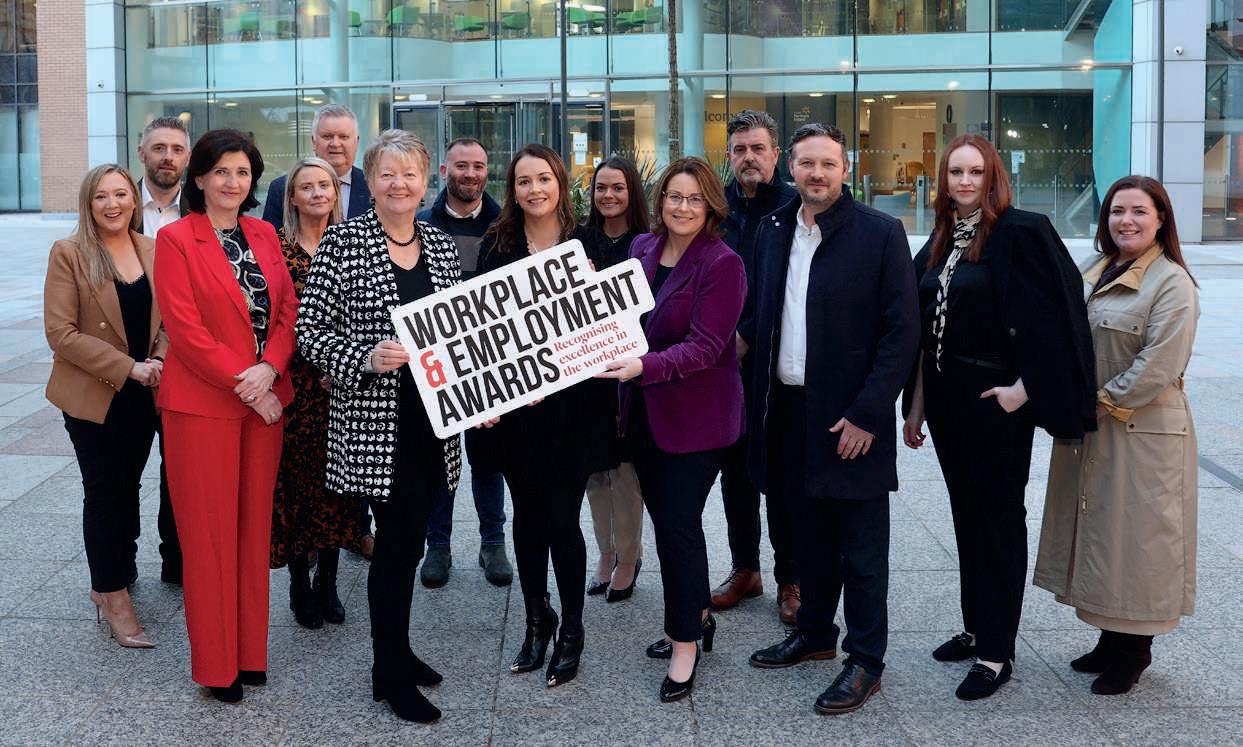
NOW Group has marked a major milestone as its team breaks the 100 mark and appoints a new Chief Operating Officer following a year of growth and expansion. As well as supporting over 1,800 people with learning difficulties and autism every year, NOW Group has seen a significant increase in the number of its own staff across bases in Belfast, Omagh, Enniskillen and Dublin. The team now stands at 110, an uplift of 60% since last year’s 69, having welcomed a flurry of appointments at the beginning of 2024.Taking up the post of Chief Operating Officer is Margaret Allen, who brings over 30 years’ experience in contract and retail catering, wholesale and supply chain management. Through her work with industry leaders at the highest levels, Margaret has a strong track record of designing and implementing commercial strategies which deliver growth for businesses.
AG Paving and Building Products has reported a 12% increase in sales in 2023, with sales in GB up 20%. The record-breaking year follows increased demand for facing brick and paving products from throughout the UK and Ireland. AG recently invested £5 million into its operations to enhance internal processes and cope with increasing customer demand – including the purchase of cutting-edge machinery to boost performance efficiency and improve health and safety standards.






In September 2023, Enniskillen welcomed a transformative addition to its business landscape with the launch of The Workhouse Business Hub. As part of a restoration project generously funded by the Heritage Lottery Fund in collaboration with South West College and Fermanagh Omagh District Council, this hub has emerged as a hive of opportunity for entrepreneurs, start-ups, and established businesses alike.
The Workhouse Business Hub goes beyond the conventional office space concept, offering a dynamic environment that fosters collaboration, networking, and growth. The hub provides a range of facilities including office spaces, hot desks, and meeting rooms, ensuring that businesses of all sizes can find a suitable space to thrive.
At the heart of The Workhouse is a commitment to creating a vibrant community of entrepreneurs. The hub hosts a program of networking events, providing a platform for local founders and business leaders to come together. These events not only facilitate valuable connections but also serve as a forum to share start-up journeys, exchange insights, and foster a sense of camaraderie among the business community.
The Workhouse recognises the importance of extending opportunities to the west: the hub serves as a gateway for businesses to explore and tap into resources beyond Enniskillen. Entrepreneurs can gain insights into the support, funding, and opportunities available not only locally but also across the wider region.
The strategic partnership with South West College and Fermanagh Omagh District Council further strengthens the hub’s foundation. Leveraging the expertise of educational institutions and local government, The Workhouse becomes more than just a physical space:
it transforms into a hub of knowledge, support, and growth.
The timing of The Workhouse’s launch – when remote working and entrepreneurship are on the rise – was key: the hub provides a central space for individuals to come together, share ideas, and build a thriving business ecosystem. The restoration project not only preserves the historical significance of The Workhouse but also repurposes it to serve the evolving needs of the business community.
Kate McGrath, business manager at The Workhouse, expresses her enthusiasm for the diverse range of users who have embraced the hub’s workspaces since its launch in September 2023. From remote workers seeking a collaborative environment to founders and entrepreneurs starting out on their business journeys, The Workhouse is becoming a space for innovation and ambition.
Contributing to the success of The Workhouse is its strategic partnership with the British Business Bank, a collaboration that is playing a pivotal role in supporting the local startup ecosystem. The involvement of such organisations underscores the commitment to providing robust support mechanisms for businesses at every stage of their development locally.
The monthly networking events hosted by The Workhouse are a great opportunity for our business community. With

inspiring startup journeys from individuals like Michael Quinn, Barry Lynch, Chris McClelland, and Karen Weaver, it is a delight to hear our diaspora taking the opportunity to share their insights and experiences back home.
The diverse mix of companies present at The Workhouse’s events reflects the hub’s broad appeal. The Royal Academy of Engineering, InvestNI, Clarendon Fund Managers, NI Screen, Fermanagh Enterprise, Sales Geek, Tech Start, FSB NI, HBAN and CynestX are among the organisations contributing to the vibrant
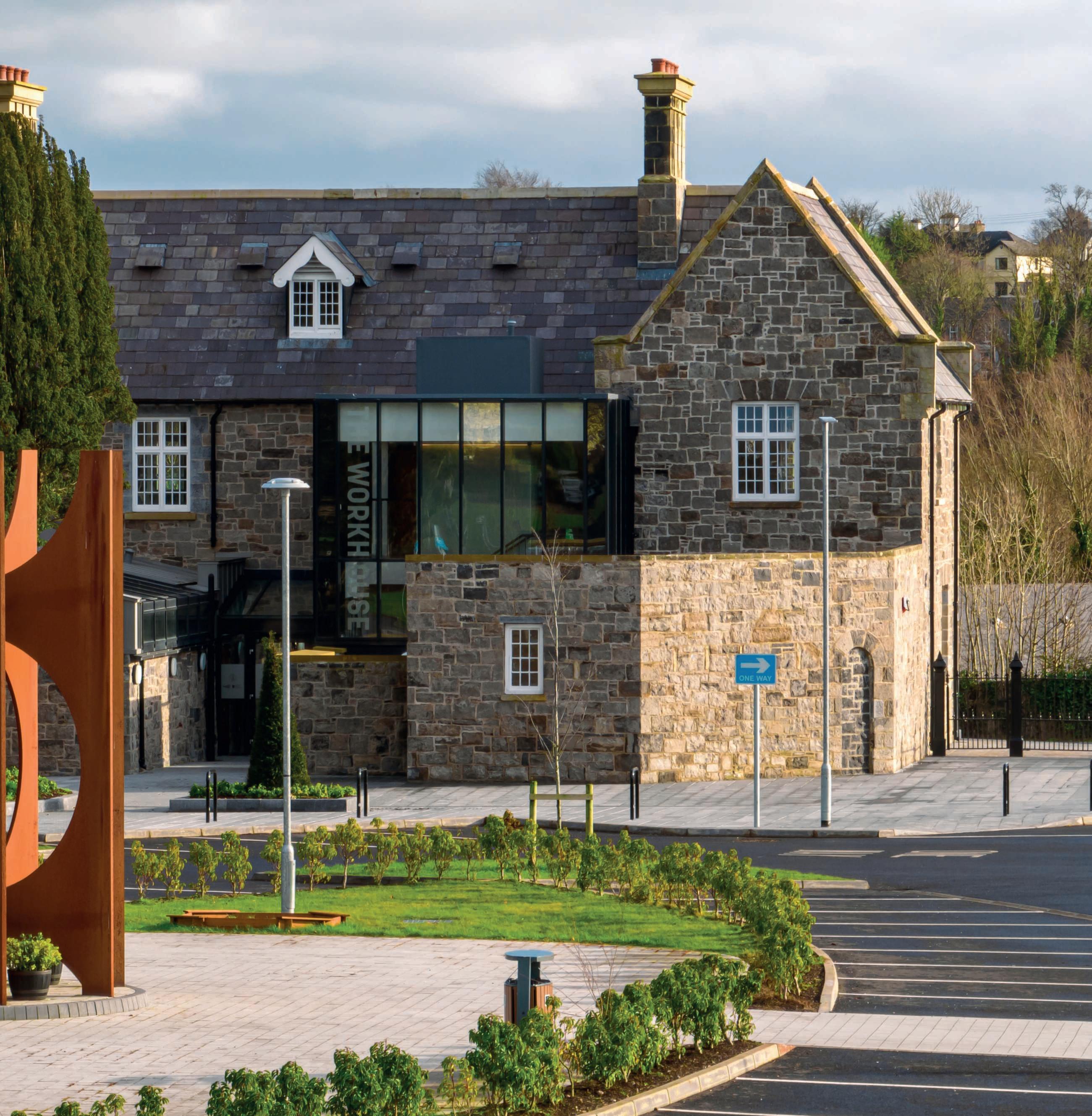
ecosystem. These entities provide valuable support to start-ups and expanding businesses, enriching the collaborative spirit within The Workhouse.
Looking ahead, The Workhouse is looking forward to being joined by organisations such as InterTrade Ireland, Catalyst, Women in Business, VRAI Ltd, Boatyard Gin and more as they continue to roll out events throughout the year. These gatherings not only offer local businesses insights into the available support but also provide a platform for real stories from individuals who have
navigated the challenges of starting and growing their ventures.
Kate McGrath emphasises the significance of these events, viewing them as opportunities for local businesses to connect, network, and collaborate with their peers. The goal is to foster an environment where support, collaboration, and advice flow freely among businesses, creating a network that goes beyond shared office spaces and becomes a catalyst for collective success.
As we look to the future, The Workhouse Business Hub stands as a testament to
the potential that can be unlocked when public and private entities collaborate with a shared vision. Enniskillen’s entrepreneurs now have a hub that not only meets their immediate workspace needs but also drives them towards regional collaboration, innovation, and success. The Workhouse is not just a physical hub: it is a dynamic community where knowledge, experience, and innovation converge to drive the region’s entrepreneurial spirit forward.
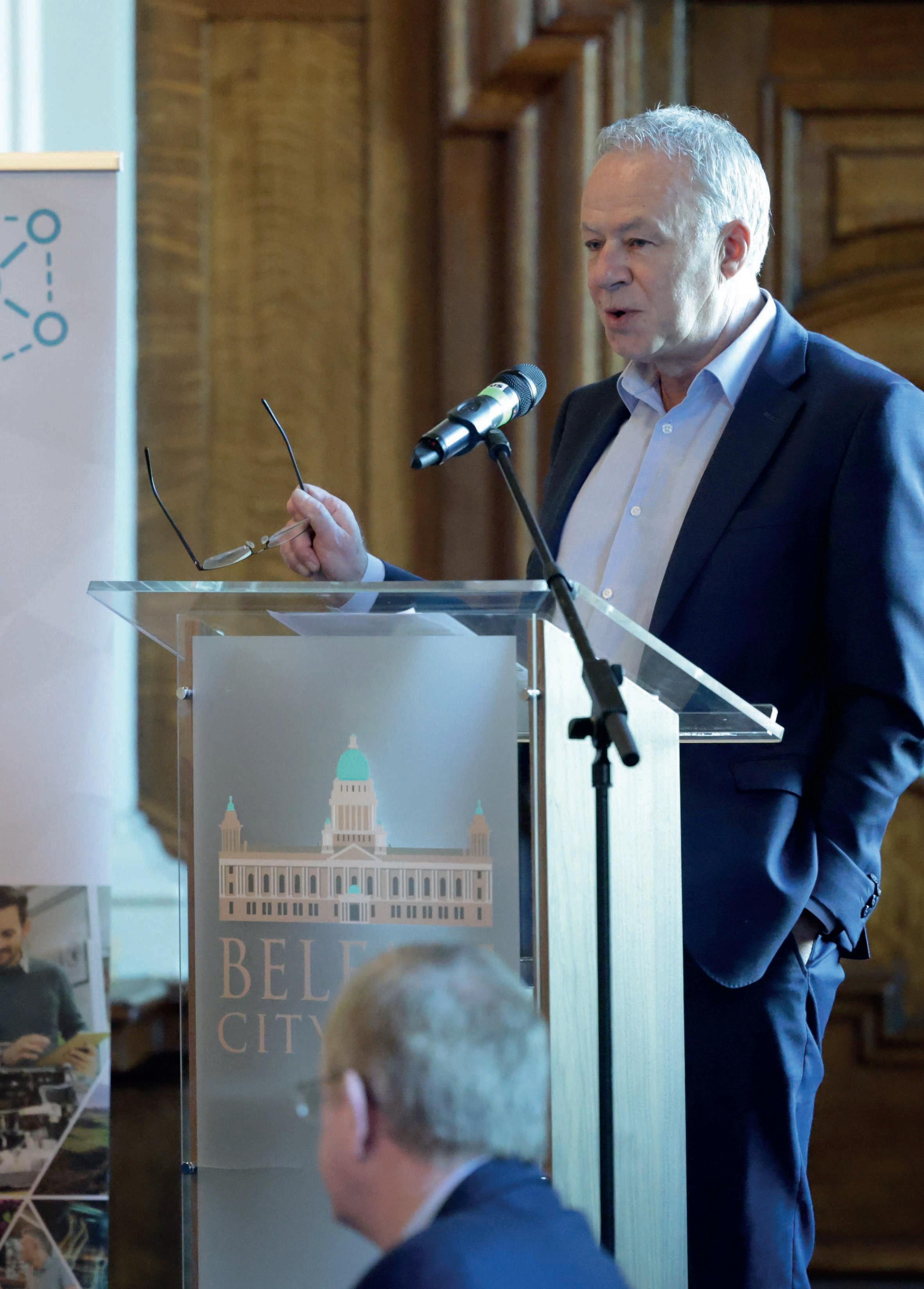

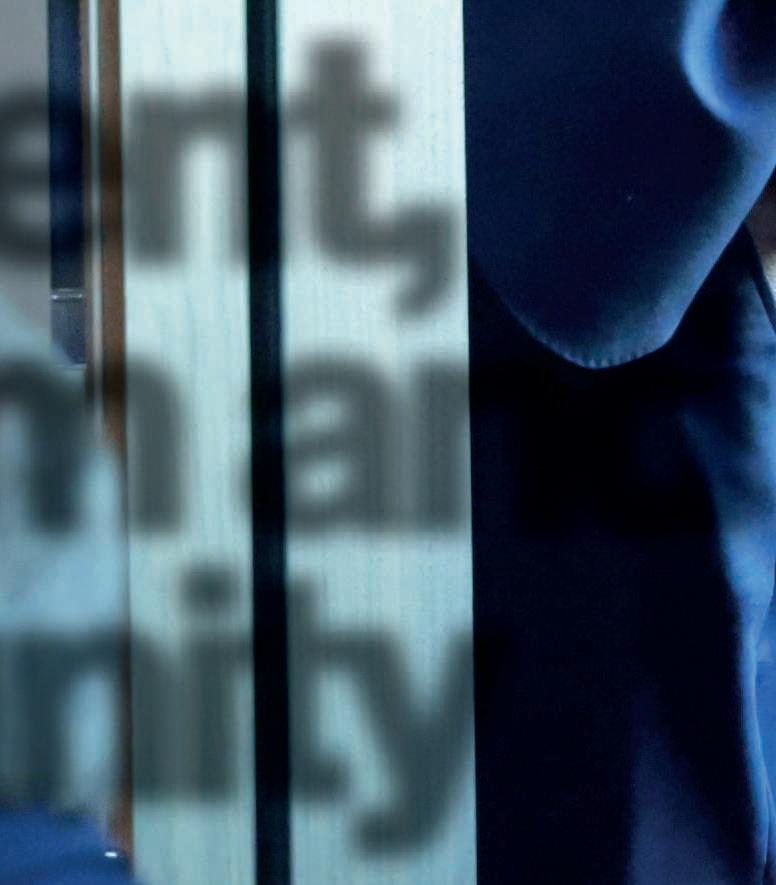

Chamber members were among the heads of business organisations attending an upbeat briefing on the significant opportunities being created by the Belfast Region City Deal on February 29 at Belfast City Hall.
Speaking on behalf of the Belfast Region City Deal partners, Belfast Lord Mayor Councillor Ryan Murphy said: “We’ve made significant progress across all pillars of investment in just two years, moving the Belfast Region City Deal fully into delivery phase. This transformative programme of investment is creating valuable opportunities for our city and regional economy, with local businesses already awarded contracts to support delivery.”
Addressing guests, First Minister Michelle O’Neill said: “I believe that we have to be optimistic about our economic prospects. The City Deals really speak to that.
“This Deal alone will see £1 billion of government funding and partner and industry investment over the next 10 years, which is going to lay the groundwork for up to 20,000 more and better paid jobs.
“This programme of investment will support businesses and people here well into the next generation. It is about our future, our young people and about a decade of opportunity.”
The deputy First Minister Emma Little-Pengelly said: “City and Growth Deals are longterm initiatives, but it is important that we take time to celebrate wins and acknowledge the progress being made.
“We are global leaders in cybersecurity, FinTech, RegTech, life and health sciences, advanced manufacturing, the creative industries and low carbon technologies, but we can do so much more. Let’s use this momentum to ensure City Deals are the catalyst for the kind of transformation we are capable of and deserve, supercharging investment, economic growth and tech innovation.”
Lord Caine, Parliamentary Under-Secretary of State for Northern Ireland said: “The UK government is committed to ensuring that Northern Ireland continues to thrive and that it is a fantastic place to live, work and invest.
“That is why we are investing £617m for digital and innovation projects through the four City and Growth Deals, which cover the whole of Northern Ireland.
“The Belfast Region City Deal is the most advanced of the Northern Ireland deals, including projects in infrastructure, tourism, digital innovation and regeneration.
“I look forward to working with the newly restored Northern Ireland Executive, as well as the business and sector leaders attending today, on harnessing the opportunities each of the City and Growth Deals will bring to Northern Ireland.”
A lively panel discussion explored the significance of key projects including the Advanced Manufacturing Innovation Centre (AMIC), spearheaded by Queen’s University. Panel member John Irwin, managing director of recycling plant manufacturer Kiverco, said: “In advanced manufacturing, there are opportunities across the board. The Deal will allow Northern Ireland companies to compete on a world stage, improve productivity and develop a digital factory. It’s a huge investment.”
Panellist Phillip Morrow, CEO of AR and VR production agency Retinize, also serves as a director of Studio Ulster. Led by Ulster University, this project will be a global centre of excellence in R&D and innovation, providing virtual production facilities for movies, video games and immersive experiences.
Philip said: “There are very few of these facilities around the world, so it’s massively exciting for the TV and film industry here and our bank of talent. Belfast is open for business to the rest of the world. We’re developing state of the art research and workforce and opportunities like never before. Studio Ulster puts us right at the front of the game.”
Joanne Stuart of the Northern Ireland Tourism Alliance reinforced the importance of investment in projects ranging from The Gobbins to Carrickfergus Castle, Bangor Waterfront to the Mournes and Destination Royal Hillsborough, along with the landmark city centre Belfast Stories experience. She commented: “Investing in our world class culture, heritage and landscapes gives people reasons to visit Northern Ireland. Those visitors will stay longer and spend more in our local communities.”
Belfast City Council’s Augment the City Challenge competition, opening this April, is a perfect example of how the City Deal strands coalesce. Supported by £930,000 of Belfast Region City Deal funding, it will give SMEs a unique opportunity to develop immersive new visitor
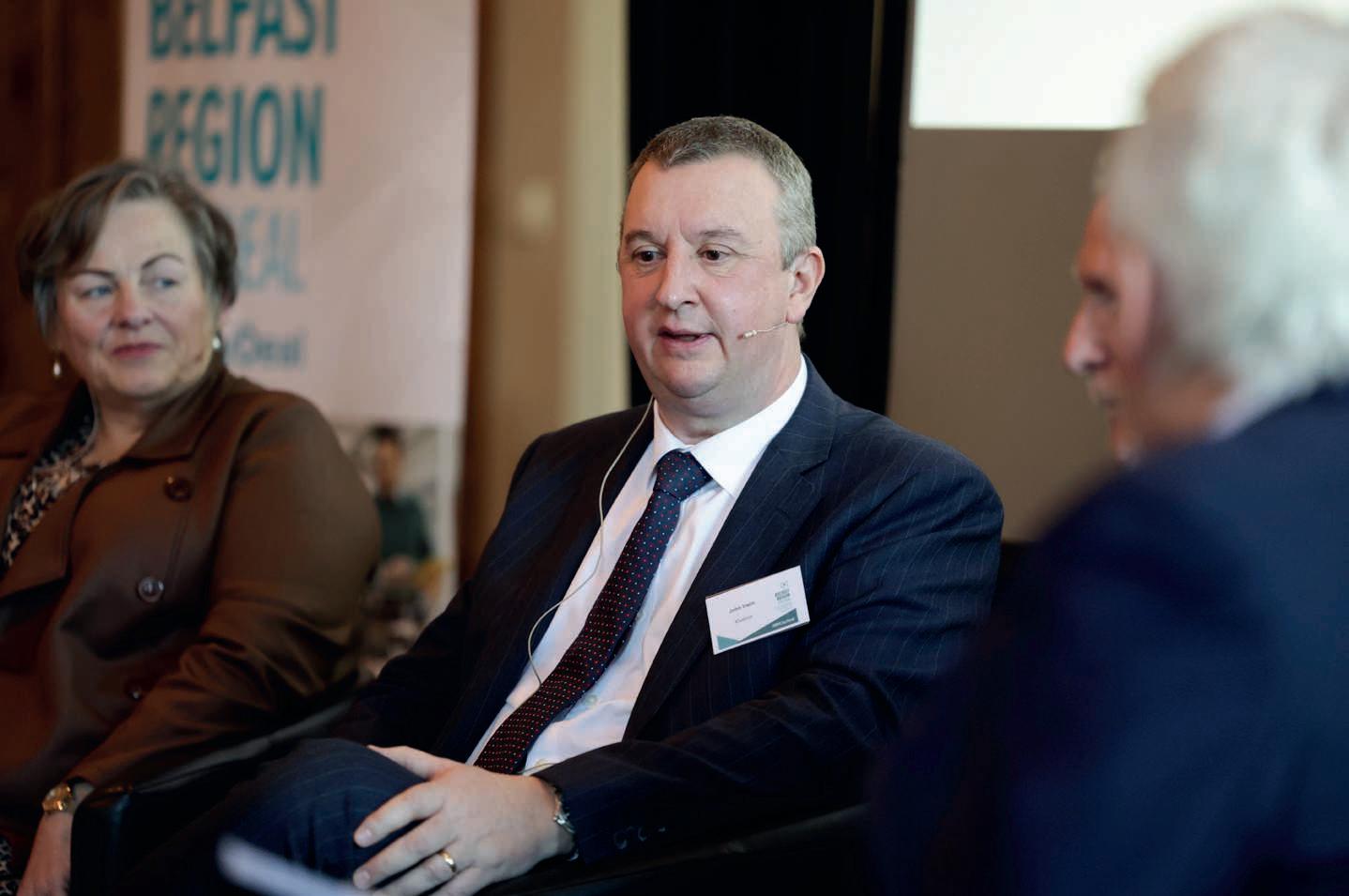
experiences, using augmented reality, virtual reality, and mixed reality.
Belfast City Council Chief Executive John Walsh closed the event, commenting: “The Belfast Region City Deal is really building momentum now. Our huge ambitions for the city and region are coming to life and we are achieving key delivery milestones almost every month, with transformative projects being designed, built, and operationalising, and funding flowing through to support delivery.
“Collaboration between our City
Deal partners, government partners and stakeholders is driving regional investment to help us compete in the UK, Ireland, and indeed globally.
“This decade’s economic opportunities are enormous, and these projects are critically important for the future of highquality jobs and growth for generations to come.”
For more information, go to www. belfastregioncitydeal.co.uk and join in the conversation using #BRCityDeal.
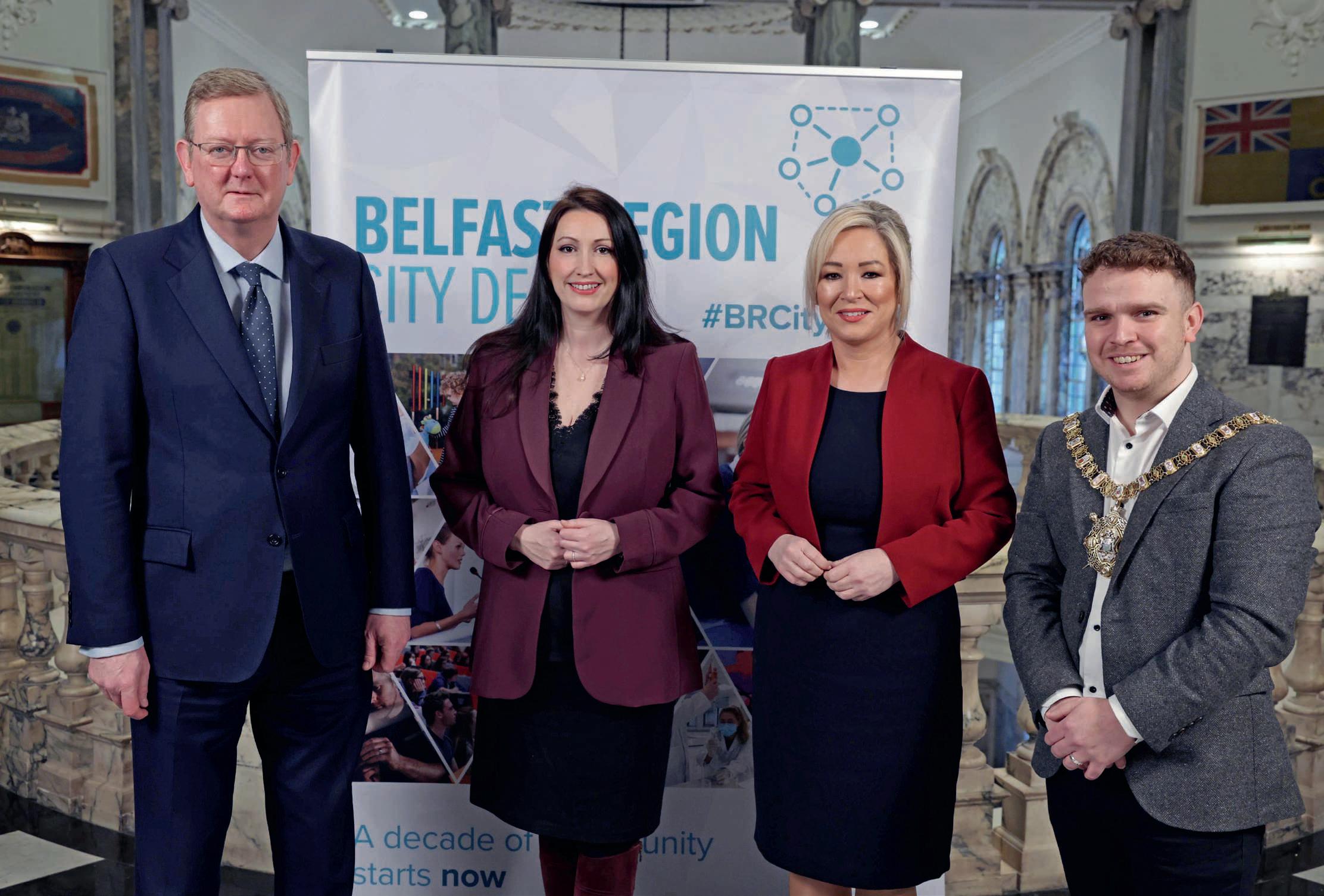

 By Ciaran McCaffrey, StackAdapt.
By Ciaran McCaffrey, StackAdapt.

There is a seismic shift happening in the advertising industry. As more people choose to consume media on devices and watch TV when they want to, or listen to radio and podcasts when it’s convenient for them. How are brands finding their target market when their customers are creating their own ‘prime time’?
StackAdapt is a multi-channel programmatic advertising platform that provides access to display, native, video, connected TV, audio, in-game, and digital out-of-home campaigns.
Tell us a bit about yourself and your career to this point.
I’ve worked in the advetising industry for nearly 20 years now, starting in press at the Irish News. In 2012, I moved to UTV to head up sales in Ireland for talkSPORT Radio. I then moved to a Regional Partnership manager role within talkSPORT, working mainly in England. During the latter years of my time at talkSPORT, I began to notice how programmatic audio advertising was able to offer much more insight and data about audiences, and when the opportunity arose to join StackAdapt, I jumped at it!
What do StackAdapt do?
StackAdapt is an AdTech software that allows advertisers to plan, buy, and report on digital advertising campaigns across a multi-channel offering. It is a Canadianowned business that started in 2014 when our co-founders saw an opportunity
to address the frustrations they were experiencing in digital advertising. Since that time, the company has now grown globally, and fast forward to today – I am responsible for business generation across Ireland. The platform was built with machine learning and AI at its core and provides advanced targeting and reporting capabilities for media buyers in all industries.
How is programmatic advertising shifting the industry?
If you think about traditional advertising platforms, like TV, radio, press, and outdoor, audience data was pretty limited – essentially you were casting a very wide net to capture your target audience. With developments in audience targeting, measurement, and reporting technology, we can use precise targeting layering to find those in-market audiences that are interested in your product or
service and because of our multi-channel offering, we can serve ads and even retarget advertising to them if they are driving to work, in the office, at the gym, listening to a podcast or watching their favourite TV show.
Because I came from a traditional media background, it was a complete gamechanger to see how targeted we could get.
If you are a marketer, the challenge is to provide the best ROI or return on ad spend as possible no matter how big or small your company is and it’s great to be working with a technology that has been designed to do exactly that.
It’s an exciting space to be in and the company culture is amazing. If you think about the multiple touchpoints we can access for our clients, it’s a cutting-edge industry to be a part of right now.
For more information contact Ciaran at ciaran.mccaffrey@stackadapt.com




The Game of Thrones Studio Tour, now in its second year, has amped up its digital game and accessibility. In an interview with Emma Deighan, Managing Director Sam Harding highlights how the tour transcends HBO’s hit TV series.

Sam Harding.
Undoubtedly, the filming of Game of Thrones (GoT) in Northern Ireland brought a distinctive charm to our tourism o ering, drawing in a new influx of visitors. Capitalising on the show’s success, its filming studio in Banbridge transformed into an immersive tour in 2022. Now, two years on, the investment is demonstrating its value.
“In terms of our start, it was slower because travel was disrupted in the wake of the pandemic, but we have moved past that now,” Sam Harding, managing director, begins.
As international travel picked up in mid-2022, the Game of Thrones Studio Tour began attracting visitors from around the globe. Sam says: “Game of Thrones is international in terms of its appeal. Hugely so in the UK, Ireland, and the US. It’s got a lot of attachment to Northern Ireland, due to the filming locations used here. So, the Studio Tour, based within the actual film studios for the show, was built as part of a new tourism strategy.
“Its reach is phenomenal and we know – from figures from HBO and Warner Brothers, who we have a great partnership with – that views of the show in China alone are around 500 million. Germany is another huge fan base, as is Australia, and these are locations in which we have so much potential to tap into. We also expect the spin-off series of Game of Thrones to continue to enrich our attraction.”

While the Studio Tour acts as a magnet for fans of the series, the attraction also pays dividends for neighbouring businesses. “Essentially, we were built on a tourism NI strategy related to screen tours and to offer more things to do here. But while we diversify tourism here, we’re also helping to spread it across Northern Ireland. We’re in partnership with The Boulevard, from which we operate a shuttle bus, and we know that the benefit we’ve had on local hotels has been very positive.
“From a staffing point of view, we have over 100 staff, from our team to third parties. It’s a great contribution to the local area. We also work closely with Armagh
City, Banbridge and Craigavon Council to help drive visitor mobility and that also works beyond our council area and to places like Ballintoy and the Dark Hedges,” he continues.
The Studio Tour is a flag bearer for HBO and Warner Bros, Sam says. It offers more than a mere walk-through of the original iconic sets and costumes. There’s an educational aspect, too.
“It’s a good journey of how a TV show is made. It celebrates the filming industry here and while Game of Thrones is an adult-only series, from the point of view of parents who wouldn’t let kids see the show, they can still enjoy the tour itself.”
The tour’s authenticity is a key feature,
with it being the primary filming location for over 30% of Game of Thrones. Sam says: “The authenticity of the fact that this building was the primary filming location of Game of Thrones – knowing sets such as Winterfell’s Great Hall haven’t moved an inch and you’re standing on the exact brickwork where actors once stood – is its real appeal.
“What we say to people is that the subject is Game of Thrones but for the younger visitors, it’s about how a cinematic TV show is made and about careers in the industry.”
To mark its second year, the Game of Thrones Studio Tour has invested heavily in its digital offering with the launch of a new

website and e-commerce store. “Two of the key things we worked on with this are about understanding the journey – making it as easy as possible to buy tickets for the Tour, and as easy as possible to get here.
“We’ve always had a bus service from Dublin and Belfast but we have expanded it to seven days a week, making us more accessible. Partnering with Translink and Bus Eireann, this move reflects the commitment to ensuring the Studio Tour’s growth.”
Meanwhile, the e-commerce store, launched with over 200 items, aims to be a one-stop shop for fans around the world. It will expand that range to 400, making it the largest official GoT merchandise store in the world, both online and on-site.
Furthermore, the studio positions itself as a versatile events venue, hosting everything from small meetings to large exhibitions and product launches.
“We’re a phenomenal events venue. We’re good for corporate retreats and any kind of event. Our unique spaces, including areas used during the filming of the show, offer a backdrop for a range of events that cater to meetings of 20 people to 300, and that’s a really special offering that
businesses can give to their clients and staff.”
The new Game of Thrones Studio Tour website has received a boost from an exclusive video featuring actor Ian McElhinney, celebrated as Ser Barristan Selmy in the show.
Sam says that this contributes to the tour’s authenticity, explaining: “It’s a nod to the considerable time the cast spent in this building. It serves as a poignant reminder to visitors that they are standing on the same ground as the actors and the individuals integral to the creation of this series.”
Located within Linen Mill Studios, the site unfolds another captivating story, one that extends beyond the allure of the themed attraction itself. The echoes of an industrial transformation resonate –from the days of fabric production to the cinematic landscapes of Westeros.
Sam continues, “It encapsulates the evolution of our industries, it’s about innovation and transformation, showcasing how we’ve ingeniously repurposed our resources.”
Looking ahead, Sam hints at exciting plans for the future including additions to
the business in the form of those spin-off shows currently in production; The House of the Dragon and another in the pipeline scheduled to start production in Northern Ireland this summer.
“In terms of size, we stand as one of the largest indoor attractions on the island of Ireland, offering ample space for growth and expansion. Our vision includes the addition of new elements and ongoing innovation with interactive displays, and we are currently in discussions about introducing a compelling new attraction. We cater to an unwavering fan base from all over the world with more locations to tap into and to keep the experience dynamic and fresh, we’re exploring potential spin-offs. The future holds immense promise, and we’re actively collaborating with diverse partners to shape the next chapter of our journey.”
The expedition through Westeros and beyond is more than just a homage to a beloved TV series: it is illustrative of the enduring enchantment of storytelling and the craft of filmmaking here. Additionally, it signifies a flourishing industry in Northern Ireland that could indeed expand our tourism offering even more.













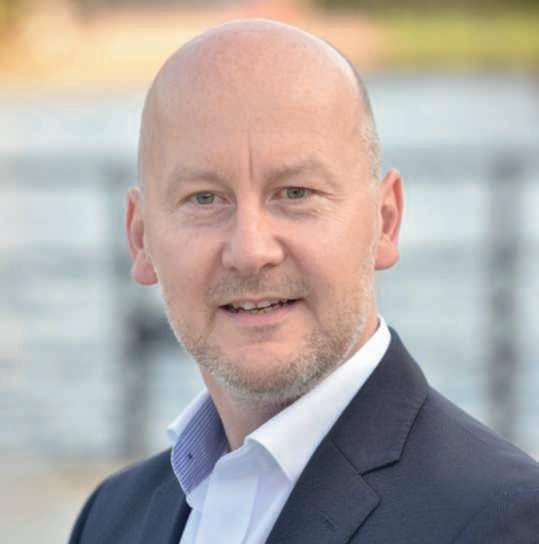
WDon’t be put off by the price, there’s plenty to like about the latest Honda CR-V, writes
James Stinson.hen Honda launched the first CR-V back in the late nineties, it was pioneering stuff. It was a soft SUV, which – unlike most of the SUVs of the time –wasn’t designed for any type of o -roading. It was o ered as an alternative to people carriers, for people looking a high-riding, chunky looking, practical 4x4 lookalike.
Boy, have times changed! The SUV has virtually wiped out the people carrier, estate and saloon car market. Last year, around half of all cars sold were SUVs, with every car maker having several of various types, sizes and shapes in their line-ups.
Buyers just love them, but they do have their downsides. SUVs are almost universally expensive and that’s especially true for this latest Honda CR-V. And while practical, they’re not especially fun or rewarding to drive.
Perhaps most pertinently, in the current climate, they’re not terribly environmentally friendly either. They’re big and heavy, and despite clever hybrid and battery options, pump out more emissions than a smaller car would. But we’re not about to put that genie back in the bottle. The best we can do is enjoy the choice and let technology and governments take care of the rest.
The latest CR-V sums up the genre well. It’s a sizable car – bigger than the old one – which is very spacious and comfortable. You could drive to the other end of the country and still emerge relatively fresh and nimble. It has improved environmental credentials over the old car, available either as a hybrid or a plug-in hybrid for the first time. Both feature the same 2.0 litre four-cylinder petrol engine. The plugin hybrid, e:PHEV, makes most sense for company car drivers while private buyers will likely opt for the simpler and considerably cheaper e:HEV model.


For the record, the e:PHEV will deliver a battery only range of around 50 miles and can be charged through a home wall box in as little as two and a half hours. It comes in range topping Advance Tech trim only and is the model to choose if you plan on towing anything.
And, while the e:PHEV version has better acceleration, both are no slouches. Somewhat surprisingly, the cheaper hybrid has four-wheel drive while the e:PHEV is front-wheel drive only.
Styling-wise, the latest CR-V looks much like any other SUV, with Honda adopting the same chunkier, more aggressive tone as rivals.
The interior is dark, sensible and comfortable. There’s extra brownie points for Honda for not dumping all the controls in the touchscreen, keeping a fair few knobs and buttons to hand for things like the air conditioning.
The seating position and the seats are superb. And while it’s a big car, the parking sensors, reversing camera and excellent all-round visibility mean it’s not a chore to manoeuvre. The boot is big with the rear seats up and huge when they’re lowered.
The CR-V range opens with Elegance trim. It comes loaded with standard equipment, including 18in alloy wheels, wireless phone-charging, dual-zone climate control, adaptive cruise control, electrically folding and heated wing mirrors, a heated steering wheel, a power tailgate and lots of other equipment.
Next in line is the Advance, which is the top trim you can have with the e:HEV. That version builds on the standard kit list and adds heated rear seats, along with the head-up display, electric memory seats, adaptive high beam and upgraded sound system that we talked about earlier.
Advance Tech sits at the top of the range and is reserved for the e:PHEV. It gets all the bells and whistles, including exclusive exterior styling, some bespoke details around the interior and other extras.
Prices start from £45,895, rising to around £54,000 for the top of the range e:PHEV model. There are cheaper options around but the Honda does come well equipped and the Japanese car maker also enjoys very high owner satisfaction ratings due to its bulletproof reliability.







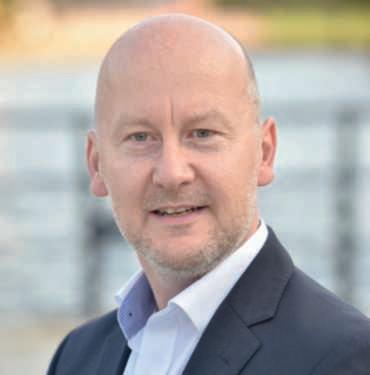
It’s no secret that demand for electric cars has softened over the last 12 months – back in 2022, you’d have waited months for your car to arrive while discounts were thin on the ground.
Over the last few years, car makers have been busily ramping up production of new electric cars. There’s been an explosion of new models and new factories to build them. And a lot of that supply has come on stream over a short time. Unfortunately, demand hasn’t been there to meet that supply.
The main issue is that while electric cars have been a hit with the early adopters – pioneers who are keen and have the wherewithal to embrace electric – the sector has yet to convince the mass adopters out there.
These people are sceptical about the costs and practicalities of owning an electric car and are more than happy with what they’ve got. The fact that most new electric cars are company cars – which enjoy generous tax breaks – rather than private sales, underlines the point.
Every technology goes through similar growing pains. It doesn’t mean that electric cars aren’t the future. Governments have given us no option, but the transition might take a little longer.
Price, range and charging infrastructure are widely seen as the three main barriers to the mass adoption of electric cars. When I first tested an electric car back in 2010, the range was a pretty pathetic sub 100 miles. But, depending on how much you spend, some models will now do more than 400 miles on a single charge. Most models fall into the 200- to 300-mile category.
Charging infrastructure is still very much an issue but is slowly improving. But for people who don’t have driveways where they can charge at home, this is and will likely remain an issue for some time to come.
For most though, price remains the biggest

impediment to going electric. Running costs may be lower but the upfront price premium – which can be 20% and more – is still too much for many buyers.
However, technology and economics will eventually see electric cars prevail. And it’s cars like this stunning new Renault 5 and the upcoming VW ID.2 that’ll lead the charge.
The Renault 5, a reboot of the famous little car that sold millions back in the seventies and eighties, is due to launch with a price tag of €25,000 (approximately £21,400) in Europe. That is expected to translate to less than £25,000 when it arrives in the UK early next year. That will make it one of the most affordable electric cars on the market, undercutting even today’s cheapest, the £26,140 BYD Dolphin.
When the new Renault 5 launches it will only be available with a 52kWh battery that will offer a range of up to 249 miles on a single charge. However, in time the Renault 5 will also be available with a smaller 40kWh battery, which is likely to provide closer to 186 miles of range but will be more affordable.
Expect 80kW DC charging for the smaller battery model and 100kW for the 52kWh version. A 15-80% top-up will take just under half an hour, and it’s likely that UK cars will all come with a heat pump as standard, which should keep the car’s range more consistent.
The new Renault 5 will be the first all-electric Renault to feature vehicle-to-grid (V2G) compatibility, which will be able to intelligently feed electricity back into your home when electricity tariffs are high, or even into the grid itself if demand requires it.


In the UK, buyers will get to choose from two powerful 121bhp and 148bhp motors. These have 225Nm and 245Nm of torque respectively, and the latter is able to take the R5 from 0-62 mph in under eight seconds. That’s for the larger-battery model, which is around 1,500kg. According to Renault, 50-75 mph is possible in less than seven seconds and the car will reach a top speed of 93 mph. The first cars are expected to arrive in the UK early in 2025.
Agnew Leasing is delighted to announce that they are launching their Salary Sacrifice Scheme this year.
Salary Sacrifice means your business leases the car from Agnew Leasing and offers the scheme to their team as a perk. The employee pays for the car with a portion of their gross salary, meaning they save money on National Insurance and Income Tax.
Employee benefits of salary sacrifice
• Lower National Insurance contributions: Salary sacrifice can result in lower National Insurance contributions for employees. This can help employees keep more of what they earn.
• Lower tax liability: An employee can lower their income tax liability by reducing their gross salary. This means employees can potentially save money on their tax bill.
• Access to non-cash benefits: Salary sacrifice allows employees to receive non-cash benefits. These may include benefits they might not be able to afford otherwise.
Employer benefits of salary sacrifice
• Increased employee satisfaction: Offering salary sacrifice arrangements can help increase employee satisfaction and retention. Employees usually view the benefit as a valuable perk.
• Reduced National Insurance: Employers can pay less tax by saving money on their National Insurance contributions. Tax does not need to be paid on the salary that is sacrificed.
• Improved recruitment: Offering salary sacrifice arrangements can help attract and retain top talent. It’s often seen as a key part of a competitive benefit package for job hunters.

Agnew Leasing are excited to add Salary Sacrifice to their fantastic services. To register your interest please contact our Team on 028 9038 6600 or david.mcewen@agnews.co.uk







ELAINE BIRCHELL MBE
Non-Executive Director, Eakin Healthcare
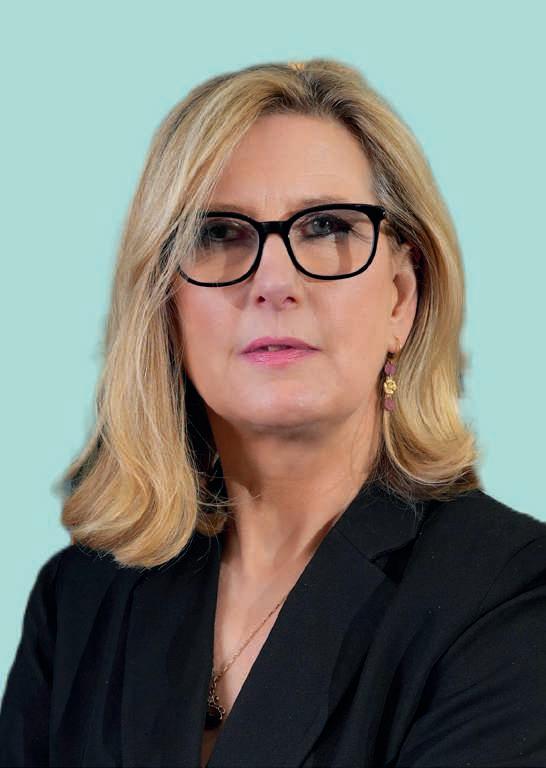
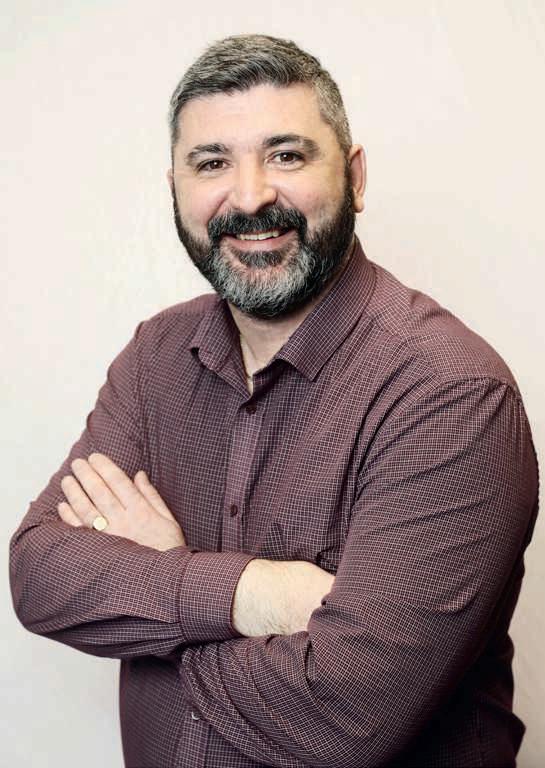
SCOTT JACKSON
Chief Executive, USEL
PROFESSOR SANDRA
MOFFATT
(Interim) Pro Vice-Chancellor and Executive Dean of Ulster University Business School


PETER QUINN
Head of Delivery, Calibro Workspace
JULIE MERNAGH
Chief People & Culture Officer, Bidvest Noonan


RHYS THOMAS
Business Development Manager, NI Chamber
PAULA SCULLION
Marketing Executive, FAST Technologies


JAMES EYRE
Chief Executive, Titanic Quarter
Corporate law firm A&L Goodbody (ALG) has announced three senior appointments in Northern Ireland.
James Flanagan has been appointed Partner in the construction and infrastructure team and John Palmer joins ALG as a second Energy Partner within its corporate team. Caroline McNally, meanwhile, has been appointed to the ‘Of Counsel’ senior advisory role in the firm’s commercial and technology team.
The three appointments take ALG’s senior leadership team in Northern Ireland – charged with leading a team of over 130 lawyers and business support professionals in its Belfast office – to 24.
Congratulating Caroline, James and John on their appointments, Michael Neill, head of ALG’s Belfast office, said: “Caroline, James and John all demonstrate the unwavering energy, commercial acumen and industry-leading technical expertise that are the very core of exceptional client service for which ALG is so widely renowned.
“Their appointments reflect a healthy demand in the commercial and technology, construction and infrastructure, and energy sectors, and our commitment to bringing our clients the most relevant and timely legal expertise.”
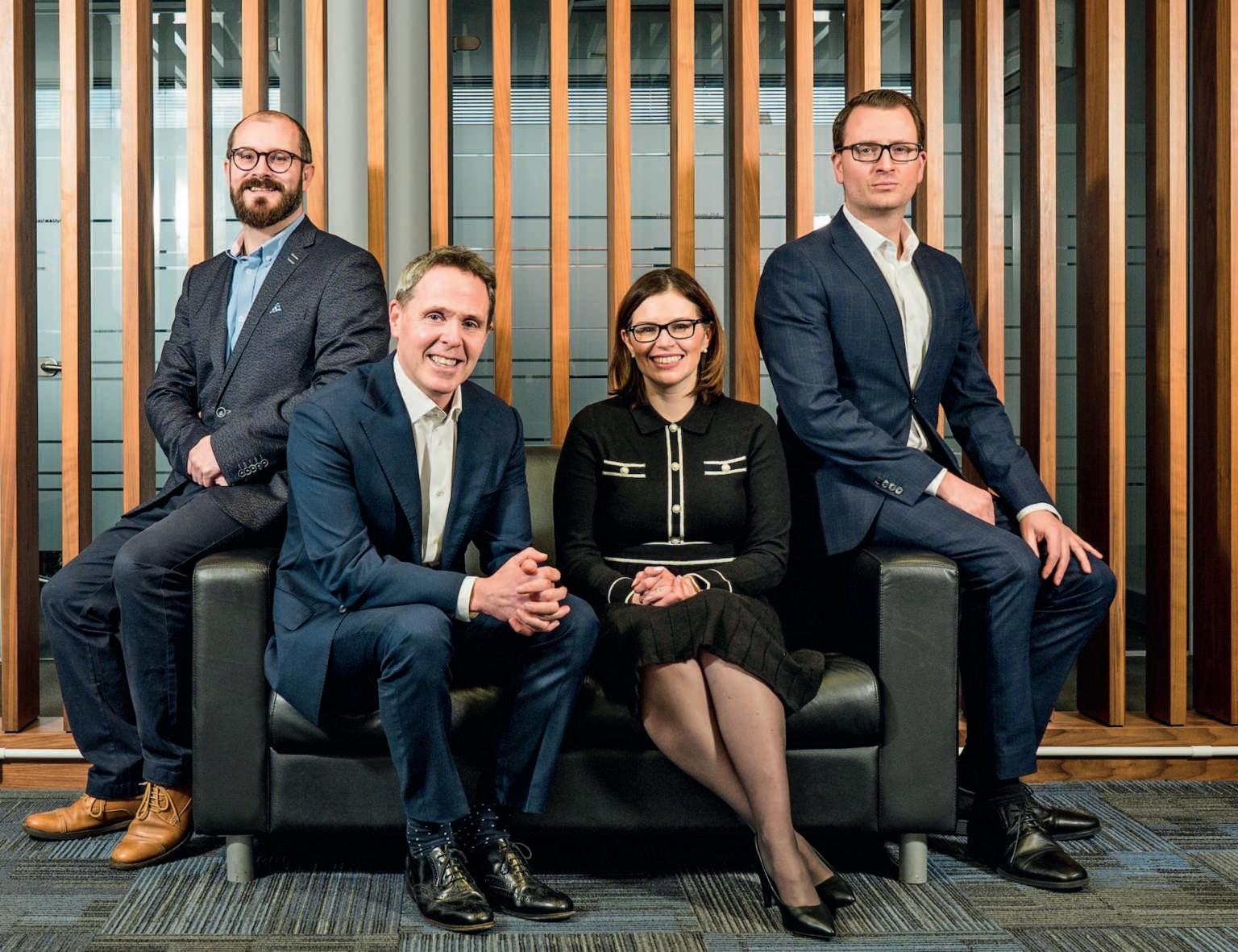
Hunter Savage has expanded its leadership team with the promotion of three associate directors to key director roles.
Cailim Boyle has been appointed as director having previously held the role of associate director of legal, financial services, and insurance recruitment.
Conor O’Hagan has been appointed as director, having held the position of associate director of engineering and operations, built environment and life sciences, while Stephanie Mulholland takes on the role of commercial director having been promoted from associate director for human resources.
Ronan Savage, managing director of Hunter Savage, commented on the appointments. “As a company we are absolutely delighted to make these key director appointments, the promotion of Cailim, Conor, and Stephanie not only highlights their contributions to the company but also their significant positive impact helping our clients succeed in this competitive recruitment market. As we look forward to an exciting year ahead, I am confident that our leadership team will continue to drive our business forward. Hunter Savage has always been focused on providing high quality recruitment services to our clients across the Island of Ireland and I look forward to continuing to push to reach our full potential with my fellow directors over the coming years.”


By leaving a gift in your Will to Queen’s University Belfast you can inspire the greatest minds and advance world-leading research.
Legacy gifts provide scholarships for talented students who otherwise may not reach their full potential. They support life-changing research to overcome some of the major global challenges of our time, such as cyber-security and medical research.
A gift in your Will of even 1% of your estate can make a real, lasting difference to the future of Northern Ireland.
Contact Louise Carey at l.carey@qub.ac.uk for more information or write your Will for free today at: go.qub.ac.uk/freewills.
AbbeyAutoline, Northern Ireland’s largest insurance broker has more than 50 years’ experience trading within the NI market. Their dedicated team of business insurance specialists offer support to enterprises providing comprehensive insurance solutions tailored to specific business needs.

With AbbeyAutoline, you have access to expert advice and can benefit from its strong relationships with world-leading insurers, finance providers and claims-handling specialists. This means you can focus on running your business knowing you are appropriately protected, and any issues can be resolved quickly and efficiently. Whether it’s protecting your premises, employees, assets or vehicles AbbeyAutoline has got you covered with its tailored business insurance offering ensuring you have the right cover at a price that works for you.
For further information or assistance visit https://www. abbeyautoline.co.uk/business-insurance.
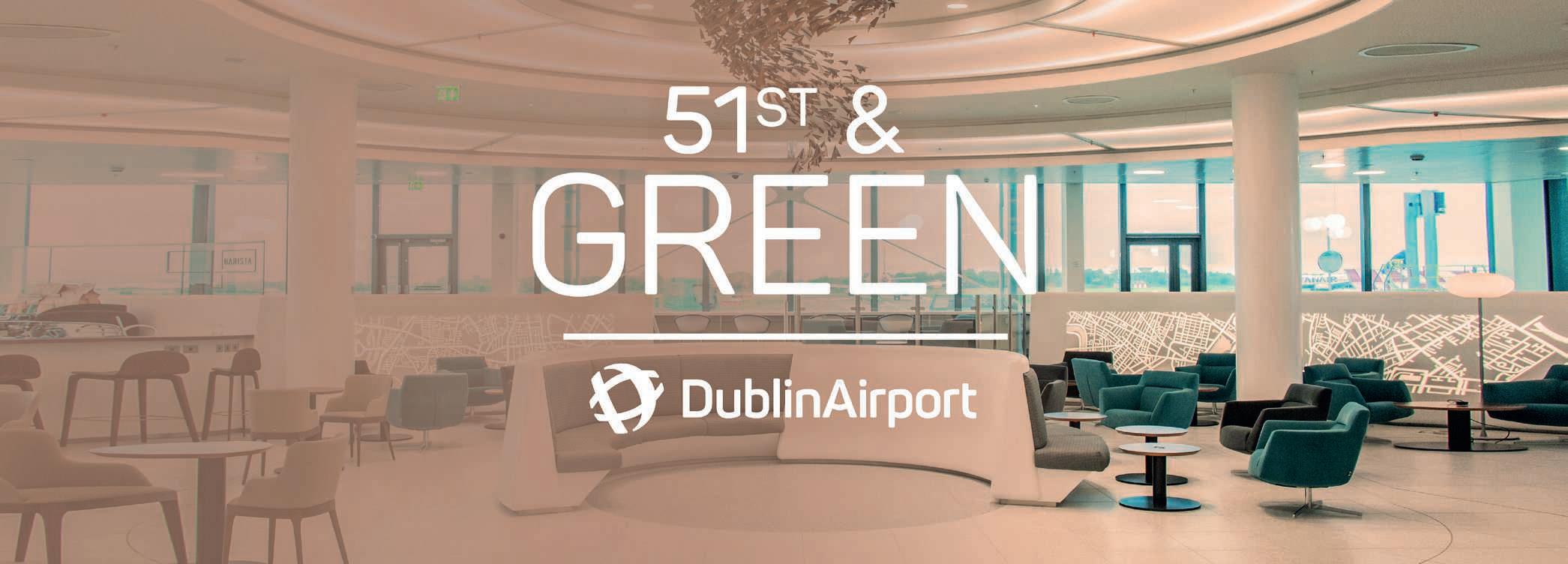
Travelling to the United States from Dublin Airport just got even easier with the launch of Mobile Passport Control (MPC) at pre-clearance. MPC allows travellers to complete a part of their immigration process before presenting at our pre-clearance facility in Terminal 2, cutting wait times even further for those heading stateside.
That’s great news for the thousands of travellers set to head stateside in 2024, flying to one of the 18 fantastic US destinations on offer from Dublin Airport, including Denver, launching in May with Aer Lingus and Charlotte with American Airlines which resumed in March.
The USA is now a popular choice as an all-year-round holiday destination. Minneapolis St Paul is quickly becoming a popular
destination for 2024 with Aer Lingus announcing the return of flights to MSP four times weekly and Delta launching direct flights five times per week.
Jetblue commenced its inaugural flights to both New York JFK and Boston along with the return of daily flights to Toronto with Westjet in March. Westjet is also planning the return of Halifax, which will operate three flights per week from June 2024.
For USA-bound travellers, Dublin Airport also offers a dedicated U.S preclearance lounge ‘51st&Green’ allowing passengers to enjoy a few hours of rest and relaxation before their long-haul flight.
www.dublinairport.com
The Belfast Telegraph Business Awards are back for 2024 in partnership with Ulster Bank.
The awards are now open for entries across 17 categories until closing date April 03. An awards ceremony will take place at Belfast’s Crowne Plaza Hotel on May 2.
Mark Crimmins, Head of Ulster Bank NI, said: “Once again, Ulster Bank is proud to partner with the Belfast Telegraph to deliver these awards and, as we launch the call for entries, we are excited to showcase the very best of business in Northern Ireland.
“Many firms and individuals here continue to flourish and have demonstrated enormous capabilities in adapting to new challenges, changing work environments, a fastpaced digital landscape and ever-evolving regulation. Recognising this success is more important than ever, and we look forward to another great event for our local business community and to celebrating with the next cohort of winners on the night.”
“In addition to recognising the great work of businesses, a key thing for me is to engage with companies about how Ulster Bank can best help them meet their objectives.”

Ulster Bank’s Mark Crimmins with Belfast Telegraph’s Margaret Canning.
Eoin Brannigan, editor in chief of the Belfast Telegraph and Sunday Life, said: “We are delighted to launch the 2024 Belfast Telegraph Business Awards in partnership with Ulster Bank, the most prestigious awards of their kind in Northern Ireland.
“We look forward to celebrating the achievements of firms and businesspeople and wish everyone good luck in their entries.”
Firms and individuals are invited to submit entries across 17 categories this year including Corporate Community Champion, Outstanding Commitment to ESG, and Excellence in Innovation. New categories for the 2024 awards include Family Business of the Year and Excellence in Manufacturing.
Once again there will be two non-entry awards, proposed and selected by the judges. These are Outstanding Business of the Year and a special Lifetime Achievement award.
In Northern Ireland, environmental, social and governance (ESG) issues are gaining prominence, reflecting global concerns about sustainability. In a recent article on SMEweb.com, Professor Richard Blundel, Director of the Centre for Social and Sustainable Enterprise at The Open University Business School, stresses the vital role of ESG considerations for businesses, emphasising their impact on brand reputation and long-term viability.
A recent report from The Open University (OU), ‘Educate, Measure, Speak up: How businesses can get ahead with ESG’, highlights a gap between awareness and action, with few businesses fully implementing ESG strategies. While large corporations lead the ESG conversation, SMEs equally influence change through collective action.
To empower SMEs in Northern Ireland, Professor Blundel offers five actionable tips:
1. Break down ESG principles: Educate leadership and employees on tailored ESG principles to drive tangible change.
2. Invite experts in: Leverage external expertise to kickstart ESG journeys through upskilling initiatives.
3. Integrate ESG into business strategy: Align ESG considerations with organisational goals, utilising partnerships with institutions like The Open University.

4. Set clear ESG goals: Establish measurable, time bound ESG goals aligned with business objectives.
5. Speak up: Recognise SMEs’ collective impact in shaping global sustainability efforts. By embracing ESG principles, SMEs can contribute to environmental stewardship, enhance reputation, and foster community engagement.

SMEs play a pivotal role in driving positive change. Through proactive engagement with ESG principles and alignment with business objectives, Northern Ireland’s SMEs can foster resilience, seize market opportunities, and lead in promoting sustainable practices.
For more advice on business sustainability visit: www5.open.ac.uk/business/knowledge-hub/sustainability
If you’d like to explore how the OU can help with your businesses’ ESG challenges, contact Maureen Fox, Business Relationships Manager, The Open University in Ireland on maureen.fox@open.ac.uk



































Peel and roughly chop all the vegetables except the cabbage and parsley
Remove outer leaves from cabbage slice thinly, wash and drain
Add the remaining ingredients along with the water, except for the parsley





When it comes to the boil turn down the heat and allow to simmer until vegetables are tender 8.






Anew economy minister is in place at Stormont and a new vision for the economy has been produced.
That it took just two weeks for Conor Murphy to lay out his plan should not be a surprise.
Sinn Féin has been preparing for this ministry for a long time; if you’ve attended any economic policy events over the past two years there’s a good chance that Mr Murphy’s advisors have been in the audience. The minister’s economic vision does not explicitly junk the 10x strategy, which was launched by his DUP predecessor in 2021, but it does bring a new focus.
The four priorities are:
• Increasing the proportion of workers in ‘good jobs’
Promoting regional economic balance
Reducing carbon emissions
• Raising Northern Ireland’s chronically low productivity
The last of these is another attempt to tackle our biggest underlying economic problem and one which has been stubbornly resistant to policy interventions. As a reminder, productivity is a measurement of the amount of economic output generated by each worker.
In the long term, economic growth, higher wages and rising living standards are dependent on rising productivity. The UK’s productivity performance has been poor since the financial crisis in the late 2000s: Northern Ireland has consistently had the poorest performance of any UK region and has also fallen increasingly far behind the Republic.
Work by Dublin’s Economic and Social Research Institute (ESRI) suggests there was little in the way of a northsouth gap 20 years ago but it has since widened relentlessly. The structure of our economy, low levels of public and private investment and geographical peripherality have all been suggested as important factors.
Queen’s University economists have been taking a systematic look at the problem and their initial work suggest that two major areas of necessary improvement are education and skills, with poor management skills a particular concern.
One of those economists, David Jordan, is among four ‘critical friends’ who have been appointed by Mr Murphy to advise on the vision and monitor progress. It appears that some of his analysis has already been taken on board: one of Mr Murphy’s six areas for productivity improvement is management practices.
The other five have some familiar prescriptions: increasing workforce skills, supporting research and development, encouraging ‘capital deepening’ through the introduction of things like robotics, and developing high productivity clusters. Also on the list is using the Windsor Framework’s dual market access to grow domestic exports and to attract highly productive foreign direct investment.
With devolution restored and some certainty on the final shape of Northern Ireland’s Brexit settlement, this now feels like the moment of truth for whether dual market access can be used as a lever for growth.
My perception is that, so far, dual market access has been mostly a defensive tool: it has preserved cross border supply chains which were threatened by a hard Brexit, particularly in the food and drink sector. For example, Sir Jeffrey Donaldson has been clear that Coca Cola’s reinvestment in its Lisburn plant was dependent on dual market access.
But it’s perhaps understandable that new investors have been cautious about committing on the basis of dual market access when there was uncertainty about whether it would be maintained – an uncertainty which was at times stoked by the government which had agreed to the policy.
The Department for the Economy has commissioned expert work to identify which products and sectors will have the greatest benefits from dual market access and investors can now speak to a devolved ministerial team with a united message. However it is still going to be a challenge to land a big, high productivity greenfield manufacturing investment.
Competition for these projects is intense: policy in the US means huge subsidies are in play and companies feel most comfortable investing where there are already existing clusters.
Something not yet clear from the minister’s vision is whether there will be a hard target for productivity rather than a vague intention. Over successive economic strategies the question of a target has ebbed and flowed
In the recent past there was an ambition to close the gap with average UK productivity. That was amended to closing the gap with the UK average excluding London and the South East, while 10x had no specific productivity target.
There is an argument that having a target is practically dispiriting and politically foolish. The reason being that making progress on productivity will be a years-long slog which will require coordination across multiple departments and with central government.
Even with the right policies, the needle may not move very much over the course of an assembly term so why have a target which will be held against you?
The minister’s statement suggests that closing the gap with the rest of the UK and the Republic will be the intention but for now, that does not involve a specific target.
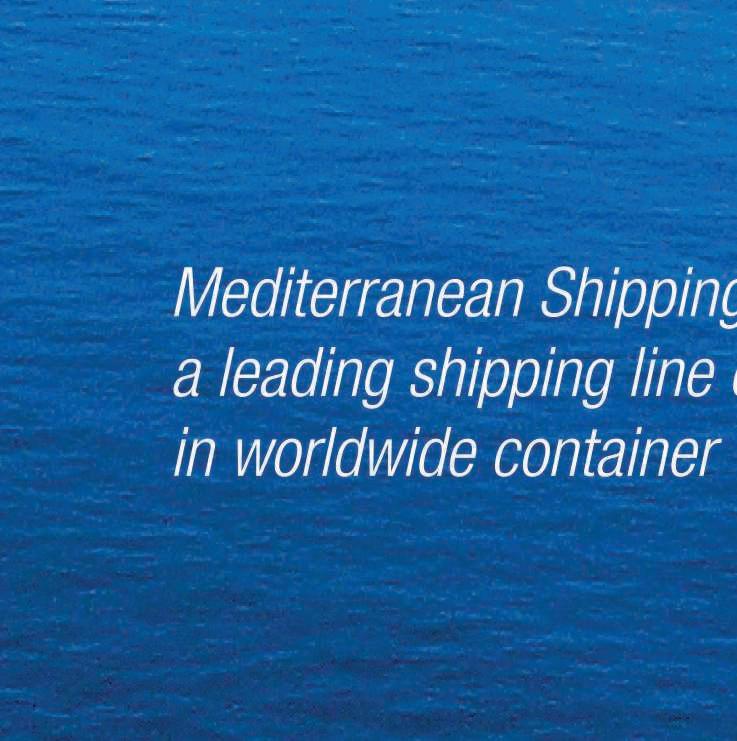


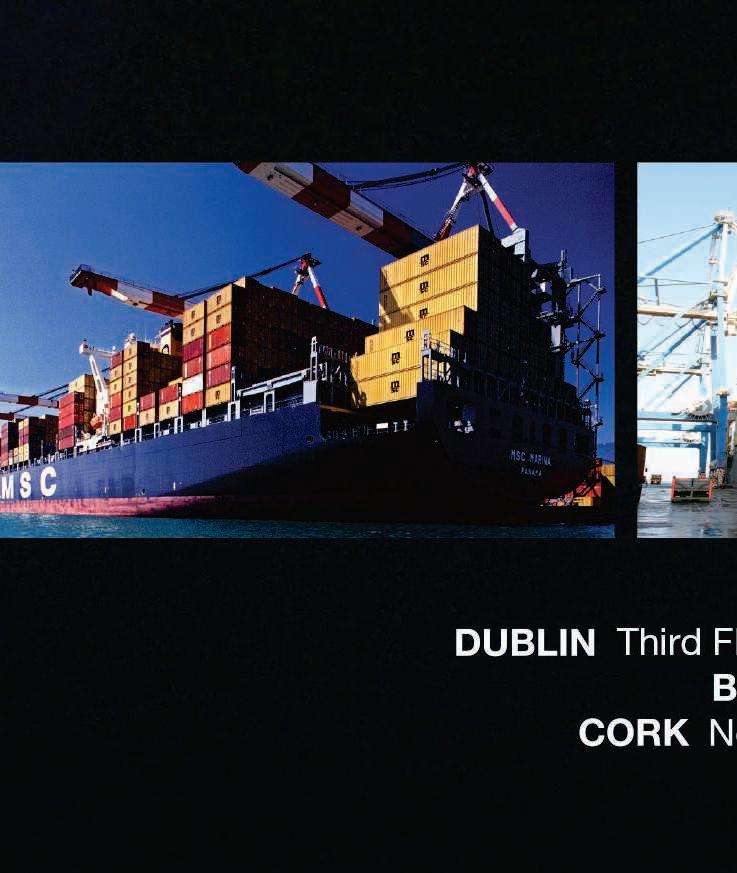
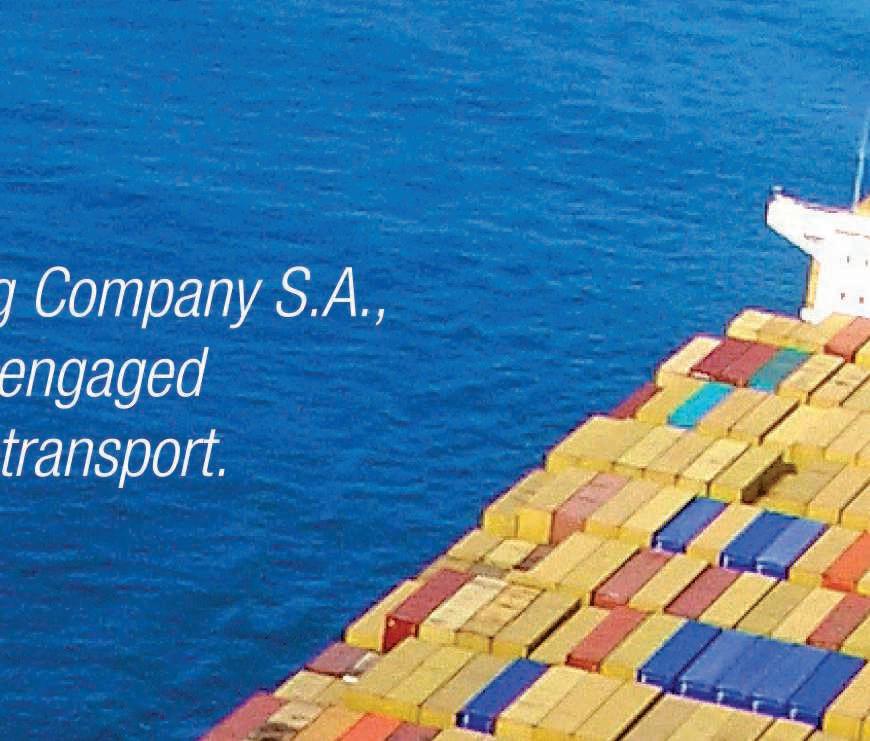






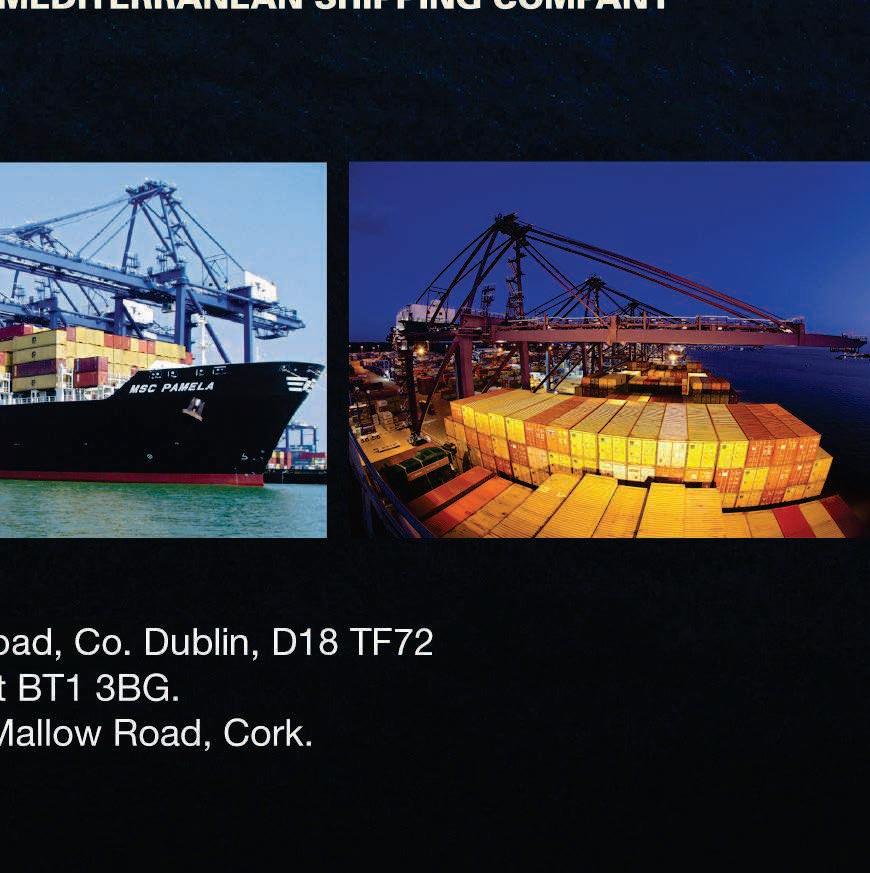









Located near the US departure gates, just after US Preclearance, 51st&Green is open to all US bound passengers. Enjoy drinks, snacks, barista style coffee and more.
From €41 per person. Book now on dublinairport.com




